

11 Other Ways To Say “I Think” And “I Believe” In An Essay
It can be tempting to say “I think” or “I believe” in an essay, especially when writing a personal narrative or opinion-based essay. The issue with this phrase is they tend to read as informal and weak. This article will explore some stronger alternatives that are worth considering.
What Can I Say Instead Of “I Think” And “I Believe”?
There are many different ways to express that what you’re saying is an opinion or a conclusion you have drawn using stronger wording than “I think” and “I believe.” Here are some options:
- In my opinion
- It could be argued
- Many believe
- This suggests
- It can be concluded
- It makes sense
- This proves
- This supports the idea
- X makes a strong case
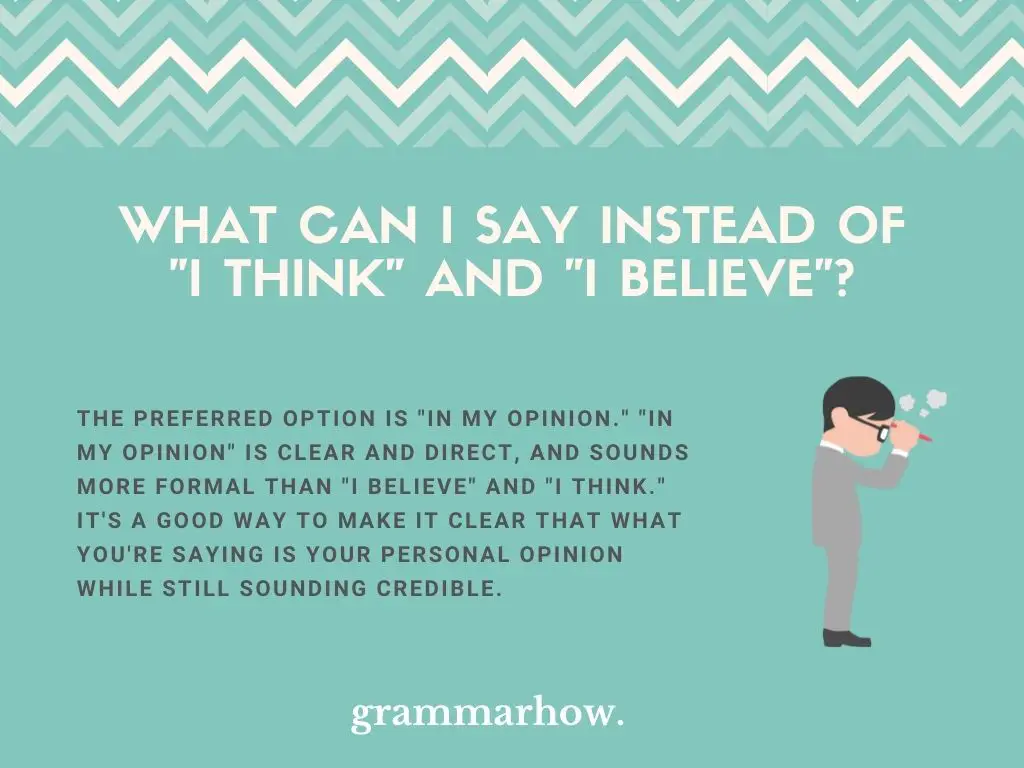
The preferred option is “in my opinion.” “In my opinion” is clear and direct, and sounds more formal than “I believe” and “I think.” It’s a good way to make it clear that what you’re saying is your personal opinion while still sounding credible.
In My Opinion
“In my opinion” is a good choice when you’re writing a first-person essay. “Opinion” implies more fact-based consideration than “believe” and more depth than “think.” “Opinion” also comes off as more confident than both “think” and “believe.”
“In my opinion” sounds formal enough to be appropriate in an essay, but can still maintain the conversational tone that is typically expected in first-person essays.
Here’s what “in my opinion” looks like in context:
- In my opinion, every public school student should be offered a free lunch option.
- Reading through this book was challenging not for the content but for the dull writing style. In my opinion, it shouldn’t be upheld as a classic.
- In my opinion, neither argument was particularly convincing.
It Could Be Argued
This sort of hypothetical phrasing isn’t always considered strong, but “it could be argued” is still a solid choice for third-person essays that require you to explore various arguments.
“It could be argued” is useful when you need to analyze multiple arguments or look at something from multiple angles. It allows you to point out some arguments or thoughts people might have in general to develop your argument.
Here are some ways you can use “it could be argued”:
- It could be argued that teaching Shakespeare in school only serves to confuse students due to the extremely antiquated language.
- It could be argued that the color blue represents sadness, but there are many examples in the text that point to blue instead representing loneliness.
- The bird could be a representation of her fear. Conversely, it could be argued that the bird is there simply because the lead character loves birds.
Many Believe
“Many believe” is useful when you want to discuss widely held beliefs and the fact that these beliefs are widely held is common knowledge. You can also use “many believe” when you have a statistic to back up the claim.
“Many believe” is better than “I think” and “I believe” in those sorts of situations because it creates a less personal statement. That helps it feel more formal and makes the argument feel more expansive.
Here’s how you can use “many believe”:
- Many believe that eating any kind of fat is unhealthy, but nutritionists disagree.
- According to the poll, many believe that doing yoga and drinking enough water will cure certain mental illnesses.
This Suggests
“This suggests” is a great choice for drawing a conclusion based on the evidence you’ve presented. It’s stronger than “I think” and “I believe” because it explicitly ties your ideas to other ideas.
You’ll typically use “this suggests” after presenting some evidence or an argument. “This suggests” introduces your analysis and often your argument.
For example:
- The flowers in the vase didn’t die until after Ashley fought with her mother. This suggests that the state of the perpetually near-death flowers was serving as a metaphor for the state of Ashley’s relationship with her mother.
- Jodi’s favorite color was green. This suggests some part of her was tied to everything green represented in the novel, even if she denied it.
It Can Be Concluded
“It can be concluded” is a good replacement for “I think” and “I believe” in third-person writing. It emphasizes the conclusions you’re drawing based on previously detailed evidence.
Like “this suggests,” “it can be concluded” comes after you present some evidence or ideas. It directly connects your thinking to the evidence, which supports a strong argument.
Here are some examples:
- As such, it can be concluded that the core message of the story is the real reward was the friendships we made on the journey.
- It can be concluded that he never knew what happened to his father and was simply making up different versions of the story as the subject was too difficult for him to discuss directly.
It Makes Sense
“It makes sense” is a phrase can use to introduce a thought or insight you have. It’s subtly persuasive and can fit into both formal and informal essay styles.
“It makes sense” is deceptively strong wording. While it may seem soft at first, it can be used to make some really strong statements.
Here’s how that could look in practice:
- It makes sense that the school wouldn’t provide free lunches for students. It’s a costly plan, and the school district has a long track record of investing in administration before investing in student welfare.
- It makes sense that the play’s love story ended tragically. The playwright was newly divorced when she penned it, and her poetry from this time shows a similar disillusionment with romantic relationships.
This Proves
“This proves” is a strong way to connect your conclusions and arguments to previously presented evidence. This phrase is a good choice when you’re confident in your evidence and your argument, as using it after shaky evidence can harm your credibility.
Here’s what this might look like in context:
- The students who got more recess time did better on tests than children who had more quiet study time. This proves that children need more playtime throughout the day.
- This proves my original hypothesis, though not in the way I expected.
This Supports The Idea
This is another useful phrase for directly tying previously stated evidence to your arguments and conclusions. Once you provide your evidence, you can go into your argument by saying “this supports the idea that…”
“This supports the idea” is a deeply academic phrase. It doesn’t come off too strong, nor does it read as personal or informal. It reads as objective, which can support your credibility in the eyes of the reader.
Here are some examples:
- Lisa ultimately gave the flower to Joan. This supports the idea that the flower was representative of trust.
- In this scene, the characters’ loyalties are made clear by where they are standing in relation to the protagonist. John is standing next to the protagonist. This supports the idea that, despite what he says, he truly was loyal to the protagonist.
X Makes A Strong Case
“X makes a strong case” is a phrase when you want to specifically tie in an argument someone else has made. It emphasizes the person who made the argument rather than what you think about the argument.
For example, if you wanted to say “I think Rodney is right about the dress code,” a stronger way to word that in an essay would be “Rodney makes a strong case about the dress code.”
Both sentences communicate that you think Rodney’s argument has merit, but using the “X makes a strong case” format emphasizes Rodney’s arguments rather than your evaluation of them.
This less-personal writing is generally considered to be more formal and thus more appropriate for academic writing.
Here are some more examples of how to use this phrase:
- The author makes a strong case in favor of the motion.
- In the novel, Susie’s father makes a strong case against the idea of Susie marrying a stranger.
“In my mind” is a strong phrase that is perfect for first-person narrative essays. It’s engaging, conversational wording that still maintains the formality expected in essays.
“In my mind” is a good way to word more personally held thoughts and beliefs without saying “I think” or “I believe.”
Here are some ways you could use “in my mind”:
- In my mind, nothing mattered more than the championship.
- In my mind, there was no way any of this could have a good outcome. I just didn’t see how it would work out.
Sometimes the best alternative to “I believe” and “I think” is simply to cut the phrase without providing a replacement. This makes your writing more succinct and straightforward and less informal.
Replacing “I think” and “I believe” can support the style and flow of your writing, but deleting the lead-in entirely is common advice. The argument is that since you wrote the essay, “I think” and “I believe” are implied. It’s redundant to include them.
Take a look at these sentences:
- I think the power outage was caused by the wind storm.
- I believe students should have mentors throughout their time in school.
Here’s what they look like if you remove the lead-in:
- The power outage was caused by the wind storm.
- Students should have mentors throughout their time in school.
In these instances, removing the phrases entirely without replacing them made for stronger statements.

Martin holds a Master’s degree in Finance and International Business. He has six years of experience in professional communication with clients, executives, and colleagues. Furthermore, he has teaching experience from Aarhus University. Martin has been featured as an expert in communication and teaching on Forbes and Shopify. Read more about Martin here .
- 10 Better Ways To Write “In This Essay, I Will…”
- 9 Other Ways To Say “In My Opinion” (Formal & Friendly)
- 10 Other Ways to Say “I Am” in an Essay
- Can An Opinion Be Wrong Or Right? Full Explanation

19 Other Ways to Say “I Believe” in an Essay
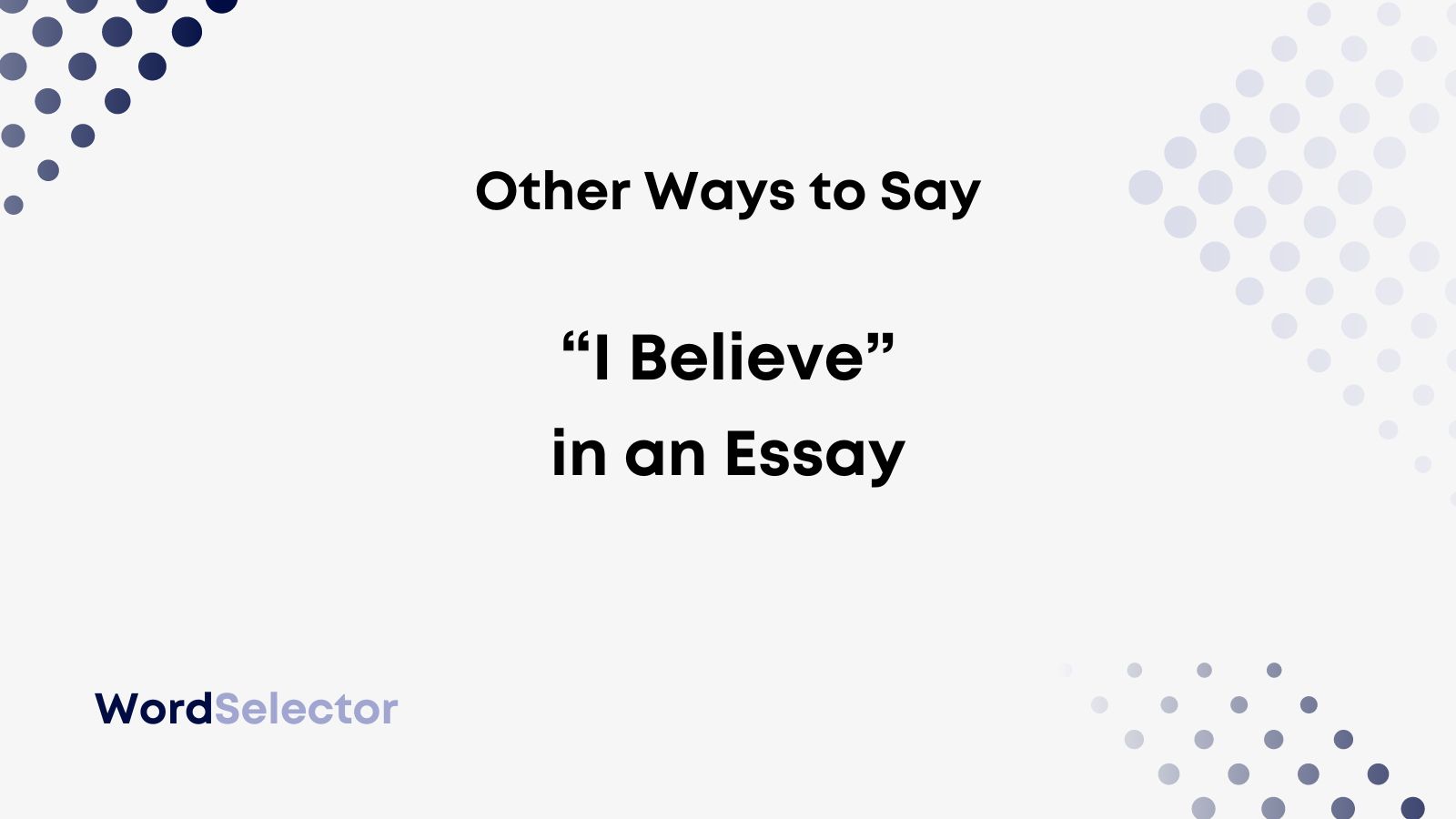
If you’re wondering how to say “I believe” in an essay without using first-person phrasing, you’ve come to the right place!
In this article, we’ve compiled a list of synonyms that you can use instead of saying “I believe” in an essay. We’ll also discuss whether you should use the original phrase at all.
Other Ways to Say “I Believe”
- One might argue
- It would seem
- This suggests
- It is my belief
- As I see it
- From my perspective
- It could be argued
- I would argue
- This illustrates
- This evidences
- In my opinion
- This proves
- In the author’s opinion
KEY TAKEAWAYS
- It’s okay to use “I believe” in an essay if the person grading your paper permits you to use personal pronouns.
- You can say “one might argue” if you want to use a more formal alternative in the third person.
- “It appears” is another good option that removes the personal pronoun “I.”
Don’t go anywhere! In the next section, we’ll discuss two great alternatives for the phrase “I believe” that you can use in your academic writing.
Moreover, we’ll provide some helpful examples and discuss whether it’s a bad idea to use “I believe” in your essay.
One Might Argue
If you’re wondering what to say instead of “I believe” in an essay, a great choice is “one might argue.”
Some academics may view this alternative as superior to the original phrase. After all, it is written in the third person. Therefore, you can get the same point across without using “I.” In some formal academic essays , it is expected by markers that personal pronouns should be avoided.
Additionally, this alternative makes it clear that your statement isn’t certain, just like the original. The word “might” implies that you are expressing an opinion or making just a potential argument.
Finally, let’s see how one might use this phrase in a few examples:
One might argue that the individual responsibility of consumers to buy sustainable products is far less than the responsibility that should be placed on large industries.
Although our findings show that fewer children are taking an interest in mathematics, one might argue that this has more to do with the teaching style of educators rather than the content of the subject itself.
Another way to say “I believe” without using the first person is “it appears.”
Like the original phrase, this one indicates that the statement following it is not certain. In fact, it is simply an observation .
Although this phrase is not necessarily superior to “I believe,” it does remove the personal pronoun “I,” which is often seen as preferable by teachers and professors.
It also has the benefit of using the same number of words as “I believe.” Therefore, it won’t increase your word count , unlike some of the other synonyms on our list.
To see this phrase in action, have a look at the examples below:
It appears that several of the mice in our experiment exhibited empathy when faced with one of their fellows trapped in a cage.
Although Otis Blackwell was a clear stylistic inspiration to Elvis, in addition to being the writer of many of his popular songs, it appears that only a small minority of the public is privy to this truth.
Can I Use “I Believe” in an Essay?
Whether it is okay to use “I believe” in an essay greatly depends on context .
There are some academics and writers out there who think using phrases like “I believe” is bad writing . Firstly, they argue that it is redundant . Obviously, you believe the statement you’re making, or you wouldn’t be making it in the first place!
Secondly, some academics think that personal pronouns should be avoided in academic writing . Therefore, it’s no good to start your statements with “I.”
On the other hand, in recent times, many academics have argued that all forms of education and information should be accessible. This means that everyone should be able to follow and understand them – not just people who were privileged enough to get a university education!
People who hold this opinion say that a phrase like “I believe” is perfectly effective. After all, it lets the reader know that you are expressing an opinion and not a fact. Additionally, it is straightforward and easy for any reader to follow.
Therefore, as a rule of thumb, we would always recommend speaking to the person who is going to grade your essay before you start . If they are a traditionalist and would prefer very formal writing, use one of our alternatives.
If they are happy to read a paper with personal pronouns and straightforward writing in it, go ahead and use “I believe.”
In conclusion, it’s okay to use “I believe” if the person marking your essay is okay with it!
We hope you found this article helpful. If you did, why not bookmark this page so you can come back whenever you like?
- 19 Gender-Neutral Alternatives to “Dear Sir or Madam”
- 16 Other Ways to Say “Looking Forward to Working With You”
- 14 Other Ways to Say “Looking Forward to Meeting You”
- 25 Other Ways to Say “Looking Forward to Being Part of the Team”
We are a team of experienced communication specialists.
Our mission is to help you choose the right phrase or word for your emails and texts.
Choosing the right words shouldn't be your limitation!
© WordSelector

10 Other Ways to Say “I Believe” in an Essay
When writing an essay, it’s common to want to share what you think. But constantly saying “I believe” can get repetitive and weaken your work.
This article lists ten different ways to express your opinion that sound more professional and engaging. Each alternative is explained, including when and why to use it, with clear examples to help you apply them to your own writing.
Is It Professional to Say “I Believe”?
Using the phrase “I believe” in a professional or academic setting can be tricky. While it’s not unprofessional, its appropriateness really depends on the situation. In writings where personal opinion is valued and you’re asked to provide your perspective, saying “I believe” can fit well. For example, in essays that ask for your viewpoint on a subject, or in situations where you need to make your stance clear without presenting it as the absolute truth.
Let’s consider the pros and cons of this phrase:
- It clearly expresses personal opinion.
- Makes the text more relatable by adding a personal touch.
- It’s a straightforward way to introduce one’s viewpoint.
- Can make arguments seem less authoritative or based on personal bias.
- Might weaken the argument’s perceived objectivity.
- Could be seen as overly informal in strictly academic or professional writing.
Given these pros and cons, you might want to consider using an alternative phrase. The need for synonyms or other ways to express belief becomes more apparent when trying to maintain the balance between presenting a personal perspective and ensuring the writing is taken seriously. Alternatives can offer a more sophisticated or objective way to share your thoughts, which might be preferable in academic or professional settings. Using synonyms can also vary your language, making your writing more engaging and precise.
10 Other Ways to Say “I Believe” in an Essay
Here are ten professional alternatives to “I believe” that can enhance your essay writing:
- I am convinced that
- I contend that
- It is my contention
- I assert that
- My perspective is
- It is my belief
- I maintain that
- I am of the opinion that
- From my standpoint
1. In my view
Using “In my view” in your essay suggests that you’re presenting a personal perspective, but with a tone that’s a bit more formal and detached than “I believe.” It hints that you’ve given the matter some thought. This alternative is especially useful in essays where you want to emphasize your opinion without sounding too personal. It’s a balanced choice that’s professional yet open.
It’s particularly effective when you’re aiming to convince the reader of your position by presenting it as a considered conclusion. “In my view” has a subtle way of suggesting that, although this is an opinion, it’s one that has been carefully arrived at.
Here are a couple of examples:
2. I am convinced that
“I am convinced that” expresses a strong personal conviction and suggests that your opinion is backed by evidence or experience. It’s more forceful than simply saying “I believe,” implying that you have been persuaded by the facts or arguments. This alternative is ideal for essays where you need to argue strongly in favor of a position.
This phrase is best used when you want the reader to understand that your viewpoint is not just a belief but something you consider to be proven or beyond doubt. It adds weight and professional credibility to your statements.
Here are two examples we recommend:
3. I contend that
The phrase “I contend that” is used to assert a position in an argument or debate strongly. This choice is notably formal and suggests that you’re prepared to defend your view against counterarguments. It’s particularly suited for essays and papers that are argumentative in nature.
When writing on topics that are controversial or not widely accepted, “I contend that” signals that you’re not merely sharing an opinion but are presenting a thought-out argument. It implies a readiness to engage in scholarly debate.
Here are two sample uses:
4. It is my contention
“It is my contention” works similarly to “I contend that” but has a slightly more nuanced tone. It still expresses a strong stance but positions it as something for readers to consider seriously. This expression is both professional and formal , suitable for academic essays that require you to present your hypothesis or argument confidently.
This alternative is best when you seek to present your argument as substantiated and well-considered, particularly in academic research or analytical papers where precision and a formal tone are critical.
Sample examples include:
5. I assert that
“I assert that” is a powerful way to state your position. It conveys confidence and certitude, making it clear that you stand firmly behind your statement. This phrase is ideal for instances where you need to be emphatic and leave no room for doubt about your viewpoint. It’s quite formal and carries a strong professional tone.
Use it in essays where you’re making bold claims or conclusions that you want to highlight as both significant and backed by evidence. It distinctly marks your assertions as solid and well-grounded.
Two examples to consider are:
6. My perspective is
“My perspective is” introduces your viewpoint in a way that’s informal yet professional . It’s useful for blending personal insight with scholarly research, showing that your conclusion is both personally and academically informed. This alternative is great when your essay involves sharing insights derived from personal experiences or observations.
This phrase is perfect when your essay benefits from a balance between personal anecdotes and scholarly evidence, suggesting that your perspective is unique but still credible.
Some examples for better understanding:
7. It is my belief
“It is my belief” is a slightly more formal synonym for “I believe.” It indicates a held belief but does so in a way that feels measured and considered. This phrase is suitable for expressing personal convictions in a way that anticipates respect for differing viewpoints.
When writing on subjects where you wish to acknowledge the potential for disagreement but still want to clearly state your own stance, “It is my belief” serves well. It marks your territory while keeping the academic conversation open and respectful.
Examples of use are:
8. I maintain that
“I maintain that” communicates a steadfast adherence to your position, even in the face of opposition or skepticism. It’s formal and carries a tone of resilience and professional integrity. Employ this phrase in essays where you’re reinforcing a stance that might have been challenged or requires robust defense.
This alternative is ideal for situations where you’ve presented evidence or arguments earlier and are now emphasizing your continued commitment to your viewpoint. It’s particularly effective for rebuttal paragraphs or conclusion sections.
Here are a couple of examples to illustrate its use:
9. I am of the opinion that
“I am of the opinion that” is a modest and reflective way to share your thoughts. It’s formal and indicates that the opinion shared is the result of consideration and reflection. It’s suitable for essays where you want to present your viewpoint as one among many, without appearing to dismiss other perspectives.
This expression is particularly fitting for nuanced discussions where acknowledging the complexity of the issue is important, and your opinion is offered as a contributory insight rather than the final word.
For insight, here are some sample statements:
10. From my standpoint
“From my standpoint” personalizes your statement by grounding it in your specific viewpoint or experience. It suggests a personal understanding or interpretation that’s informed by your unique position. This phrase is somewhat informal , making it suitable for essays that blend personal narration with academic arguments.
It’s especially valuable when your essay benefits from the explicit acknowledgment of your personal or unique perspective on an issue, linking your conclusions tightly to your experiences or observations.
Here are some examples:
Final Thoughts
Choosing the right way to express your opinion in an essay is crucial for making your writing sound professional and convincing. The ten alternatives to “I believe” we’ve listed provide you with options to strengthen your arguments and improve your essay’s readability.
Remember, the goal is to share your ideas in a way that engages your reader and supports your arguments strongly. By using these alternatives, you can make your essays more impactful and show your ability to communicate effectively. No matter which option you choose, make sure it fits the context of your writing and enhances your message. Happy writing!

CMO of Rontar. I’m interested in entrepreneurship, sales and marketing. As part of my day-to-day routine I do everything from creating marketing strategy to starting advertising campaigns. Sometimes I write for our marketing blog. When not at work, I do sports, lead a healthy lifestyle and keep up on everything that is connected with this.
Similar Posts

10 Other Ways to Say “Please Don’t Hesitate to Reach Out”
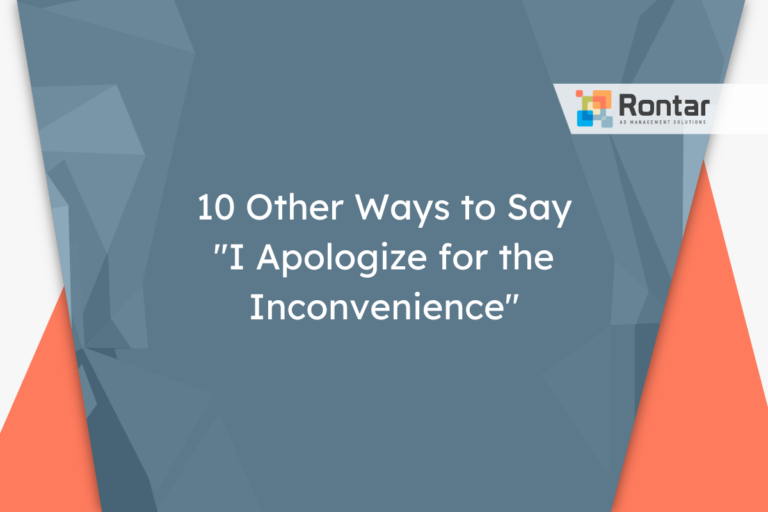
10 Other Ways to Say “I Apologize for the Inconvenience”

10 Synonyms for “Thank You for Your Attention” in an Email

16 Professional Ways to Say “Thank You for Letting Me Know” in an Email

10 Professional Ways to Say “Excited About the Opportunity”
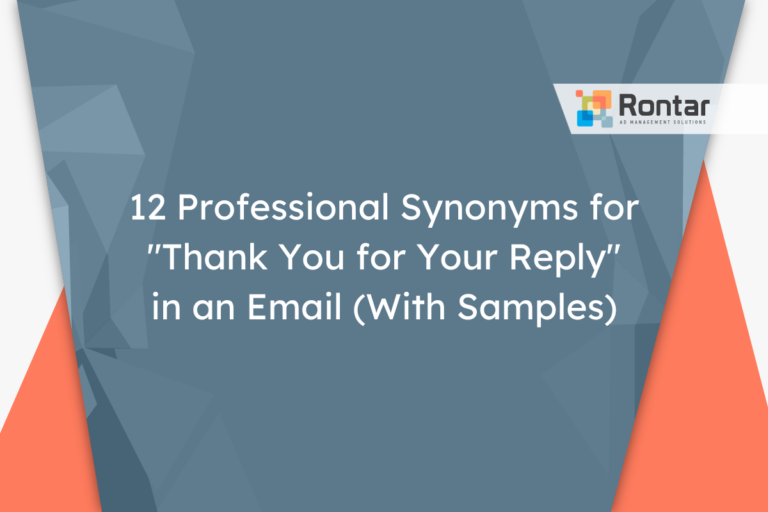
12 Professional Synonyms for “Thank You for Your Reply” in an Email (With Samples)

10 Other Ways to Say “I Believe” in an Essay
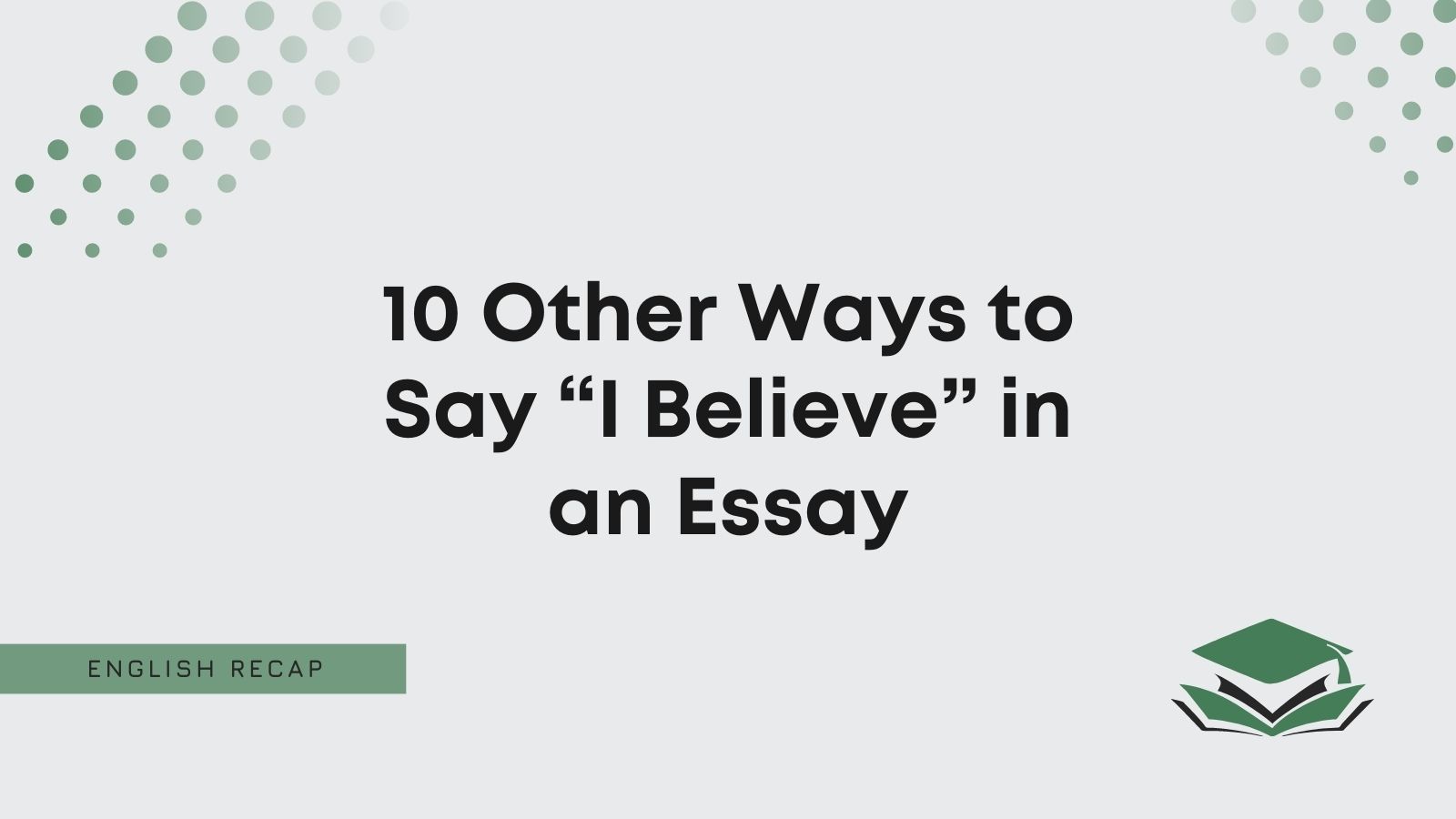
To write an essay well, you need to limit redundant phrases. Therefore, you need to know the best ways to start sentences to keep the reader engaged.
If you’re trying to use “I believe” in an essay, you will need something different to mix things up.
Luckily, this article has gathered the best phrases to help you. We’ll show you how to say “I believe” in an essay.
Can You Use “I Believe” in an Essay?
You can use “I believe” in an essay, but you should only use it once. It’s not something you should repeat if you can avoid it.
It’s okay to use in an argumentative essay . After all, it suggests you have an argument to share that provides your honest opinion about something.
However, it is bad to use if you repeat it too much . Try to avoid using it more than once. Stick to alternatives to keep things interesting.
Here’s an example to help you understand it:
I believe this is the best way to go about the situation. I’m certain we can find common ground.
- It’s a great way to share your argument.
- It keeps things fairly personal as the reader goes through your essay.
- It can easily become repetitive.
- It’s not the most inspiring phrase to include.
While “I believe” works well in some cases, it’s not always the best choice. We recommend having a few alternatives ready to mix things up.
So, keep reading to learn what to use instead of “I believe” in an essay.
What to Say Instead of “I Believe” in an Essay
- From where I stand
- In my opinion
- It seems to me
- I’m of the opinion that
- As far as I know
- My position is
- It appears that
- From my perspective
1. From Where I Stand
You can write “from where I stand” instead of “I believe” in an essay. It works well in academic writing because it’s very professional and unbiased .
It suggests you have an opinion , but you’re willing to debate with the reader. We recommend using it if you’re trying to write a more argumentative essay.
After all, it’s a great way to capture the reader’s attention. It suggests you’re willing to hear them out (even though they can’t talk to you).
Here are some great examples to help you:
From where I stand , this is the only way to tackle the situation. There are no alternatives.
From where I stand , this is the best course of action. Therefore, I think we should capitalize on it.
2. My Take Is
For a more direct alternative, you can write “my take is.” It’s another way to say “I believe” in an essay.
Saying you have a “take” suggests you believe something that others might not . It’s useful because it shares an opinion that you don’t expect the reader to share with you.
It’s just a simple way to share your idea and debate the different sides.
Review these examples if you’re still unsure:
My take is that we can’t find a better solution for this. It’s the only way the project can continue.
My take is argued a lot, but it happens to suggest the best way to move forward.
3. In My Opinion
One of the most common alternatives to “I believe” is “in my opinion.” It’s highly effective because it’s formal and respectful .
It’s a considerate phrase that suggests you’re only sharing your thoughts . It doesn’t imply that the reader is wrong if they don’t share the same opinion as you.
We recommend using it to keep your essay unbiased. It’s especially effective if you’re not trying to antagonize the reader.
You may even refer to the following examples:
In my opinion , this isn’t the only option. However, it is the only option that doesn’t cost the company more money.
In my opinion , they made a mistake in their judgment. Now, everyone has to pay for it.
4. It Seems to Me
If you want to know how to say “I believe” in an essay without saying I, you can start with “it seems to me.”
It’s a great way to start a sentence sharing an opinion . We recommend using it to express your views , even if you’re not convinced your views are correct.
This phrase works incredibly well in most formal writing . It’s useful in academic cases because it shows you’re open to exploring your ideas and what “seems” to be correct.
You can also review these examples:
It seems to me this whole situation could have been resolved sooner. Unfortunately, nobody wanted to listen.
It seems to me there are more ways to create problems for them. This battle is far from over.
5. I’m of the Opinion That
For a slightly wordier alternative, you can use “I’m of the opinion that.” Of course, it’s a bit redundant , meaning you should only use it once in an essay.
The more you use this phrase, the less impactful it’ll sound throughout your essay.
Don’t get us wrong; it’s still effective. However, it’s something you should only include to mix things up and keep your writing fresh whenever possible.
Generally, this works well in academic writing. It shows you’re open to new opinions and will express different viewpoints in your essay.
Here are some examples to help you understand more about it:
I’m of the opinion that they didn’t need to advance to the frontline. The war did not need to continue.
I’m of the opinion that this was the best way to complete the project. I would like to hear if this isn’t the case.
6. As Far as I Know
You may use “as far as I know” instead of “I believe” as well. It’s another word for “I believe” in an essay that shows you’re exploring your ideas and talking about your opinions.
Generally, this phrase makes it clear that you don’t claim to know everything . It suggests to the reader that you’re willing to hear different views before concluding anything.
Therefore, this is a great way to remain unbiased in your writing. You should absolutely try to include it to keep things interesting.
Check out these essay examples as well:
As far as I know , there has only been one recorded discussion of this in the history of the topic.
As far as I know , this is the best plan. Nobody has offered a more suitable alternative yet.
7. My Position Is
Sharing your position (i.e., your opinion) in an essay is an excellent choice. It works well argumentatively because it shows where you stand and whether you’re willing to change your mind.
Generally, “positions” are firm. Therefore, including “my position is” in your academic writing suggests you won’t change your mind easily .
It’s effective to show a reader you’re unwilling to back down from an argument. It also helps that it’s very professional , making it excellent to use in essays.
Here are some great samples to show you how it works:
My position is that we can’t keep going like this. It’s not a sustainable way to continue.
My position is that things must change quickly. Otherwise, it’s only a matter of time before things go south.
8. In My View
You should share viewpoints and opinions in your debates. It allows the reader to follow your views and decide whether they agree with you.
Try using “in my view” instead of “I believe” to do this. It shows you’re sharing your opinion with the reader .
This is a great way to learn whether the reader agrees with you. It’ll tell them everything they need to know regarding the context of the essay in question.
You can also refer to the following examples:
In my view , this is the worst political divide we’ve had in this country.
In my view , we can still fix the problems. However, nobody seems willing to take the first step.
9. It Appears That
You can use “it appears that” as another way to say “I believe.” Showing how things “appear” refers to how you might generate your own point of view .
You can use “it appears that” to show that you’ve understood something in your own way .
Of course, you might be wrong. However, this is the basis of most arguments, and it shows you’re willing to explore your view.
Perhaps these essay samples will also help you:
It appears that I’m correct about this. Every argument against me has thus far proven to be false.
It appears that they don’t have a suitable backup in place. Therefore, they must refer to my original plan.
10. From My Perspective
“From my perspective” shows you how to say “I believe” in an essay without saying I. Instead, it uses the personal pronoun “my” to mix things up.
It’s a great formal choice that allows you to share your ideas and opinions.
Giving your perspective tells the reader what you think directly. It’s highly effective if you’re trying to convince the reader that your point of view is the best one to adopt.
Here are some examples to help you:
From my perspective , this is a bad idea. I can’t understand why people want to go through with it.
From my perspective , they are wrong. I don’t think I can explain why that’s the case, though.
- 10 Professional Ways to Say “I Appreciate It”
- 9 Professional Ways to Say “Call Me When You Have Time”
- 9 Polite Ways to Ask for an Update in an Email
- 10 Professional Synonyms for “Please Let Me Know”
We are a team of dedicated English teachers.
Our mission is to help you create a professional impression toward colleagues, clients, and executives.
© EnglishRecap
How to Say “I Believe” in an Essay: Formal and Informal Ways
When crafting an essay, expressing your beliefs is an integral part of conveying your thoughts and arguments. Whether you are writing a persuasive essay, an argumentative piece, or a personal reflection, clearly stating your beliefs can add depth and credibility to your writing. In this guide, we will explore various ways to express the phrase “I believe” in both formal and informal contexts, providing you with tips and examples that will help you master this crucial aspect of essay writing.
Formal Ways to Say “I Believe”
When writing in a formal style, it is essential to use language that is appropriate for academic or professional settings. Here are several phrases you can use to express your belief in a formal essay:
1. In my view
Example: In my view, education is the key to personal and societal development.
2. From my perspective
Example: From my perspective, it is evident that climate change poses a significant threat to our planet.
3. It is my contention that
Example: It is my contention that literature provides insights into the human condition that other disciplines cannot match.
4. My firm belief is that
Example: My firm belief is that social media has profoundly transformed the way we communicate.
5. According to my analysis
Example: According to my analysis, economic inequality is a pressing issue that demands immediate attention.
Informal Ways to Say “I Believe”
While formal language is suitable for academic essays, informal essays allow for a more personal and conversational tone. Here are some phrases you can use to express your beliefs in a more casual manner:
1. I’m convinced that
Example: I’m convinced that music has the power to heal and unite people.
2. From where I stand
Example: From where I stand, it’s clear that social media has both positive and negative impacts on society.
3. I strongly believe
Example: I strongly believe that laughter is the best medicine for the soul.
4. It’s my personal belief that
Example: It’s my personal belief that everyone should have access to affordable healthcare.
5. In my opinion
Example: In my opinion, creativity should be nurtured and encouraged in schools.
Tips for Expressing “I Believe” in an Essay
1. use supporting evidence.
When expressing your beliefs in an essay, it is essential to back them up with evidence. Incorporate data, facts, or examples that support your perspective, making your argument more persuasive and credible.
2. Avoid overusing the phrase
While it is necessary to express your beliefs, be mindful of repetitive use of the phrase “I believe.” Instead, vary your language and combine it with other phrases or sentence structures to enhance the readability and flow of your essay.
3. Be respectful of counterarguments
Even when expressing your beliefs, it is important to acknowledge opposing viewpoints. Anticipate counterarguments and address them in a respectful manner, demonstrating your ability to engage with differing opinions.
4. Emphasize personal experiences
When appropriate, draw on your personal experiences to support your beliefs. Sharing anecdotes or stories can make your essay more relatable and engaging for the reader.
5. Revise and proofread
After completing your essay, revise and proofread it thoroughly. Check for any inconsistencies or contradictions in your beliefs and ensure that your essay flows logically.
Remember, expressing your beliefs in an essay requires clarity, evidence, and a respectful approach towards differing opinions.
By following these tips and utilizing the formal and informal phrases provided, you can effectively express your beliefs in any essay. Remember to adapt your language and tone to suit the context, maintaining a warm and engaging style throughout your writing. Happy essay writing!
Related Posts

How to Say "Believe": A Guide to Formal and Informal Ways
Believe is a powerful word that conveys trust, faith, and conviction. Expressing belief can vary depending on the level of formality and the context of the conversation. In this guide, we will explore the different ways to say "believe" in both formal and informal settings. While regional variations exist, we will focus primarily on universal expressions. Let's dive in!
How to Say "Believe" in Another Way: Formal and Informal Expressions
When it comes to expressing the concept of "belief" in another way, language offers several alternatives that can add variety and depth to your communication. Whether you're engaging in formal discussions or casual conversations, having a rich vocabulary at your disposal can help you convey your thoughts and ideas more effectively. In this guide, we will explore different formal and informal expressions for the word "believe," providing tips, examples, and even regional variations where necessary.
How to Say "Believe" in Arabic: A Comprehensive Guide
Arabic is a rich and diverse language spoken by millions of people across the globe. If you're interested in learning how to say "believe" in Arabic, you've come to the right place. In this guide, we'll explore the formal and informal ways to express this powerful word, and provide you with tips, examples, and regional variations if necessary.
How to Say "Believe" in American Sign Language (ASL)
Learning American Sign Language (ASL) can be a rewarding journey. Understanding common words and phrases is a crucial step towards effective communication with the Deaf community. In this guide, we'll delve into the word "believe" and explore various ways to express it in ASL, both formally and informally.
How to Say "Believe" in Chinese: Formal and Informal Ways, Tips, and Examples
Welcome to our comprehensive guide on how to say "believe" in Chinese! Whether you're a language enthusiast, planning a trip to China, or simply curious about Mandarin, we're here to help you navigate the different ways of expressing the concept of "belief" in Chinese. In this guide, we'll cover formal and informal ways to say "believe," provide regional variations if necessary, and offer useful tips and examples. Let's dive in!
Guide on How to Say "Believe" in French: Formal and Informal Ways
Bonjour! If you're looking to expand your French vocabulary or have a conversation about belief, you've come to the right place. In this comprehensive guide, we'll explore the different ways to express the word "believe" in French. We'll cover both formal and informal variations, providing you with a variety of tips and examples to enhance your understanding. So, let's dive in!
Guide: How to Say "Believe in God"
Belief in God is a deeply personal and spiritual matter for many people around the world. Expressing your belief in God can vary depending on the formality of the situation and the cultural context. In this guide, we will explore both formal and informal ways to convey the idea of "believing in God." While regional variations may exist, we will focus on general expressions that can be universally understood.
A Comprehensive Guide: How to Say "Believe" in Greek
Welcome to our comprehensive guide on how to say "believe" in Greek! Whether you are planning a trip to Greece, learning the Greek language, or simply interested in expanding your linguistic knowledge, this guide will provide you with all the information you need.
Cancel reply
Save my name, email, and website in this browser for the next time I comment.
Arabic Cantonese Chinese Dutch English Farsi Filipino French German Greek Hawaiian Hebrew Hindi Irish Italian Japan Japanese Korean Latin Mandarin Mexican Navajo Norwegian Polish Portuguese Punjabi Romanian Russian Sanskrit Sign Language Spanish Swahili Swedish Tagalog Tamil Thai Turkish Ukrainian Urdu Vietnamese

- Privacy Policy
12 Other Ways to Say “I Believe” in an Essay
Alex Carter
The English language is rich and diverse, offering a multitude of ways to express a thought or statement. One such statement is “I believe,” which is commonly used in essays to assert a viewpoint. However, relying solely on these words can lead to repetitive and dull writing. This article will present you with twelve other ways to say “I believe” in an essay.
Exploring the Alternatives to “I Believe”
The phrase “I believe” is essential in essay writing as it helps the writer to assert their viewpoint. However, using it repeatedly can make an essay monotonous and less engaging. By exploring alternative phrases , you can add variety to your writing and make it more captivating. Here are some reasons why you should consider using alternatives to “I believe”:
- It increases your vocabulary and improves your language skills.
- It makes your essay more engaging and interesting to read.
- It demonstrates your proficiency in the English language.
- It helps you to express your thoughts more effectively.
Twelve Alternatives to “I Believe”
Here are twelve different ways to say “I believe” in an essay. While the phrases listed here have similar meanings to “I believe,” they vary in tone and formality. Therefore, you should choose the one that best fits the context of your essay.
Tips for Using Alternatives to “I Believe”
When using alternatives to “I believe,” it is important to consider the context in which you are writing. Some phrases may be more appropriate in formal essays, while others may fit better in casual writing. Here are a few tips to guide you:
- Vary your language. Using different phrases keeps your essay interesting and engaging .
- Match the tone of your essay. Some phrases are more formal than others, so choose the one that fits your essay’s tone.
- Be clear and confident. If you are asserting a belief, do so with confidence and clarity .
Common Mistakes to Avoid
When using alternatives to “I believe,” there are some common mistakes to avoid. Here are a few:
- Overusing certain phrases. While it’s good to vary your language, don’t rely too heavily on one or two phrases.
- Using phrases incorrectly. Be sure to understand the meaning and context of a phrase before you use it.
- Forcing a phrase. If a phrase doesn’t fit naturally in your sentence, don’t force it. It’s better to be clear and straightforward than to use a phrase awkwardly.
Putting It into Practice: Real-World Examples
Now that we’ve discussed the alternatives to “I believe,” let’s see how these phrases can be used in real-world examples.
Exploring New Expressions
Learning alternatives to commonly used phrases such as “I believe” not only enhances your vocabulary but also makes your essays more engaging. Remember, the key to effective writing is to express your thoughts clearly and confidently, and using varied language can help you achieve this. So, the next time you find yourself reaching for the phrase “I believe,” consider using one of the alternatives discussed in this article. Your readers will thank you for it!
Leave a Comment Cancel reply
Save my name, email, and website in this browser for the next time I comment.

Should I Use “I”?
What this handout is about.
This handout is about determining when to use first person pronouns (“I”, “we,” “me,” “us,” “my,” and “our”) and personal experience in academic writing. “First person” and “personal experience” might sound like two ways of saying the same thing, but first person and personal experience can work in very different ways in your writing. You might choose to use “I” but not make any reference to your individual experiences in a particular paper. Or you might include a brief description of an experience that could help illustrate a point you’re making without ever using the word “I.” So whether or not you should use first person and personal experience are really two separate questions, both of which this handout addresses. It also offers some alternatives if you decide that either “I” or personal experience isn’t appropriate for your project. If you’ve decided that you do want to use one of them, this handout offers some ideas about how to do so effectively, because in many cases using one or the other might strengthen your writing.
Expectations about academic writing
Students often arrive at college with strict lists of writing rules in mind. Often these are rather strict lists of absolutes, including rules both stated and unstated:
- Each essay should have exactly five paragraphs.
- Don’t begin a sentence with “and” or “because.”
- Never include personal opinion.
- Never use “I” in essays.
We get these ideas primarily from teachers and other students. Often these ideas are derived from good advice but have been turned into unnecessarily strict rules in our minds. The problem is that overly strict rules about writing can prevent us, as writers, from being flexible enough to learn to adapt to the writing styles of different fields, ranging from the sciences to the humanities, and different kinds of writing projects, ranging from reviews to research.
So when it suits your purpose as a scholar, you will probably need to break some of the old rules, particularly the rules that prohibit first person pronouns and personal experience. Although there are certainly some instructors who think that these rules should be followed (so it is a good idea to ask directly), many instructors in all kinds of fields are finding reason to depart from these rules. Avoiding “I” can lead to awkwardness and vagueness, whereas using it in your writing can improve style and clarity. Using personal experience, when relevant, can add concreteness and even authority to writing that might otherwise be vague and impersonal. Because college writing situations vary widely in terms of stylistic conventions, tone, audience, and purpose, the trick is deciphering the conventions of your writing context and determining how your purpose and audience affect the way you write. The rest of this handout is devoted to strategies for figuring out when to use “I” and personal experience.
Effective uses of “I”:
In many cases, using the first person pronoun can improve your writing, by offering the following benefits:
- Assertiveness: In some cases you might wish to emphasize agency (who is doing what), as for instance if you need to point out how valuable your particular project is to an academic discipline or to claim your unique perspective or argument.
- Clarity: Because trying to avoid the first person can lead to awkward constructions and vagueness, using the first person can improve your writing style.
- Positioning yourself in the essay: In some projects, you need to explain how your research or ideas build on or depart from the work of others, in which case you’ll need to say “I,” “we,” “my,” or “our”; if you wish to claim some kind of authority on the topic, first person may help you do so.
Deciding whether “I” will help your style
Here is an example of how using the first person can make the writing clearer and more assertive:
Original example:
In studying American popular culture of the 1980s, the question of to what degree materialism was a major characteristic of the cultural milieu was explored.
Better example using first person:
In our study of American popular culture of the 1980s, we explored the degree to which materialism characterized the cultural milieu.
The original example sounds less emphatic and direct than the revised version; using “I” allows the writers to avoid the convoluted construction of the original and clarifies who did what.
Here is an example in which alternatives to the first person would be more appropriate:
As I observed the communication styles of first-year Carolina women, I noticed frequent use of non-verbal cues.
Better example:
A study of the communication styles of first-year Carolina women revealed frequent use of non-verbal cues.
In the original example, using the first person grounds the experience heavily in the writer’s subjective, individual perspective, but the writer’s purpose is to describe a phenomenon that is in fact objective or independent of that perspective. Avoiding the first person here creates the desired impression of an observed phenomenon that could be reproduced and also creates a stronger, clearer statement.
Here’s another example in which an alternative to first person works better:
As I was reading this study of medieval village life, I noticed that social class tended to be clearly defined.
This study of medieval village life reveals that social class tended to be clearly defined.
Although you may run across instructors who find the casual style of the original example refreshing, they are probably rare. The revised version sounds more academic and renders the statement more assertive and direct.
Here’s a final example:
I think that Aristotle’s ethical arguments are logical and readily applicable to contemporary cases, or at least it seems that way to me.
Better example
Aristotle’s ethical arguments are logical and readily applicable to contemporary cases.
In this example, there is no real need to announce that that statement about Aristotle is your thought; this is your paper, so readers will assume that the ideas in it are yours.
Determining whether to use “I” according to the conventions of the academic field
Which fields allow “I”?
The rules for this are changing, so it’s always best to ask your instructor if you’re not sure about using first person. But here are some general guidelines.
Sciences: In the past, scientific writers avoided the use of “I” because scientists often view the first person as interfering with the impression of objectivity and impersonality they are seeking to create. But conventions seem to be changing in some cases—for instance, when a scientific writer is describing a project she is working on or positioning that project within the existing research on the topic. Check with your science instructor to find out whether it’s o.k. to use “I” in their class.
Social Sciences: Some social scientists try to avoid “I” for the same reasons that other scientists do. But first person is becoming more commonly accepted, especially when the writer is describing their project or perspective.
Humanities: Ask your instructor whether you should use “I.” The purpose of writing in the humanities is generally to offer your own analysis of language, ideas, or a work of art. Writers in these fields tend to value assertiveness and to emphasize agency (who’s doing what), so the first person is often—but not always—appropriate. Sometimes writers use the first person in a less effective way, preceding an assertion with “I think,” “I feel,” or “I believe” as if such a phrase could replace a real defense of an argument. While your audience is generally interested in your perspective in the humanities fields, readers do expect you to fully argue, support, and illustrate your assertions. Personal belief or opinion is generally not sufficient in itself; you will need evidence of some kind to convince your reader.
Other writing situations: If you’re writing a speech, use of the first and even the second person (“you”) is generally encouraged because these personal pronouns can create a desirable sense of connection between speaker and listener and can contribute to the sense that the speaker is sincere and involved in the issue. If you’re writing a resume, though, avoid the first person; describe your experience, education, and skills without using a personal pronoun (for example, under “Experience” you might write “Volunteered as a peer counselor”).
A note on the second person “you”:
In situations where your intention is to sound conversational and friendly because it suits your purpose, as it does in this handout intended to offer helpful advice, or in a letter or speech, “you” might help to create just the sense of familiarity you’re after. But in most academic writing situations, “you” sounds overly conversational, as for instance in a claim like “when you read the poem ‘The Wasteland,’ you feel a sense of emptiness.” In this case, the “you” sounds overly conversational. The statement would read better as “The poem ‘The Wasteland’ creates a sense of emptiness.” Academic writers almost always use alternatives to the second person pronoun, such as “one,” “the reader,” or “people.”
Personal experience in academic writing
The question of whether personal experience has a place in academic writing depends on context and purpose. In papers that seek to analyze an objective principle or data as in science papers, or in papers for a field that explicitly tries to minimize the effect of the researcher’s presence such as anthropology, personal experience would probably distract from your purpose. But sometimes you might need to explicitly situate your position as researcher in relation to your subject of study. Or if your purpose is to present your individual response to a work of art, to offer examples of how an idea or theory might apply to life, or to use experience as evidence or a demonstration of an abstract principle, personal experience might have a legitimate role to play in your academic writing. Using personal experience effectively usually means keeping it in the service of your argument, as opposed to letting it become an end in itself or take over the paper.
It’s also usually best to keep your real or hypothetical stories brief, but they can strengthen arguments in need of concrete illustrations or even just a little more vitality.
Here are some examples of effective ways to incorporate personal experience in academic writing:
- Anecdotes: In some cases, brief examples of experiences you’ve had or witnessed may serve as useful illustrations of a point you’re arguing or a theory you’re evaluating. For instance, in philosophical arguments, writers often use a real or hypothetical situation to illustrate abstract ideas and principles.
- References to your own experience can explain your interest in an issue or even help to establish your authority on a topic.
- Some specific writing situations, such as application essays, explicitly call for discussion of personal experience.
Here are some suggestions about including personal experience in writing for specific fields:
Philosophy: In philosophical writing, your purpose is generally to reconstruct or evaluate an existing argument, and/or to generate your own. Sometimes, doing this effectively may involve offering a hypothetical example or an illustration. In these cases, you might find that inventing or recounting a scenario that you’ve experienced or witnessed could help demonstrate your point. Personal experience can play a very useful role in your philosophy papers, as long as you always explain to the reader how the experience is related to your argument. (See our handout on writing in philosophy for more information.)
Religion: Religion courses might seem like a place where personal experience would be welcomed. But most religion courses take a cultural, historical, or textual approach, and these generally require objectivity and impersonality. So although you probably have very strong beliefs or powerful experiences in this area that might motivate your interest in the field, they shouldn’t supplant scholarly analysis. But ask your instructor, as it is possible that they are interested in your personal experiences with religion, especially in less formal assignments such as response papers. (See our handout on writing in religious studies for more information.)
Literature, Music, Fine Arts, and Film: Writing projects in these fields can sometimes benefit from the inclusion of personal experience, as long as it isn’t tangential. For instance, your annoyance over your roommate’s habits might not add much to an analysis of “Citizen Kane.” However, if you’re writing about Ridley Scott’s treatment of relationships between women in the movie “Thelma and Louise,” some reference your own observations about these relationships might be relevant if it adds to your analysis of the film. Personal experience can be especially appropriate in a response paper, or in any kind of assignment that asks about your experience of the work as a reader or viewer. Some film and literature scholars are interested in how a film or literary text is received by different audiences, so a discussion of how a particular viewer or reader experiences or identifies with the piece would probably be appropriate. (See our handouts on writing about fiction , art history , and drama for more information.)
Women’s Studies: Women’s Studies classes tend to be taught from a feminist perspective, a perspective which is generally interested in the ways in which individuals experience gender roles. So personal experience can often serve as evidence for your analytical and argumentative papers in this field. This field is also one in which you might be asked to keep a journal, a kind of writing that requires you to apply theoretical concepts to your experiences.
History: If you’re analyzing a historical period or issue, personal experience is less likely to advance your purpose of objectivity. However, some kinds of historical scholarship do involve the exploration of personal histories. So although you might not be referencing your own experience, you might very well be discussing other people’s experiences as illustrations of their historical contexts. (See our handout on writing in history for more information.)
Sciences: Because the primary purpose is to study data and fixed principles in an objective way, personal experience is less likely to have a place in this kind of writing. Often, as in a lab report, your goal is to describe observations in such a way that a reader could duplicate the experiment, so the less extra information, the better. Of course, if you’re working in the social sciences, case studies—accounts of the personal experiences of other people—are a crucial part of your scholarship. (See our handout on writing in the sciences for more information.)
You may reproduce it for non-commercial use if you use the entire handout and attribute the source: The Writing Center, University of North Carolina at Chapel Hill
Make a Gift
15 Other Ways to Say “I Believe” in an Essay
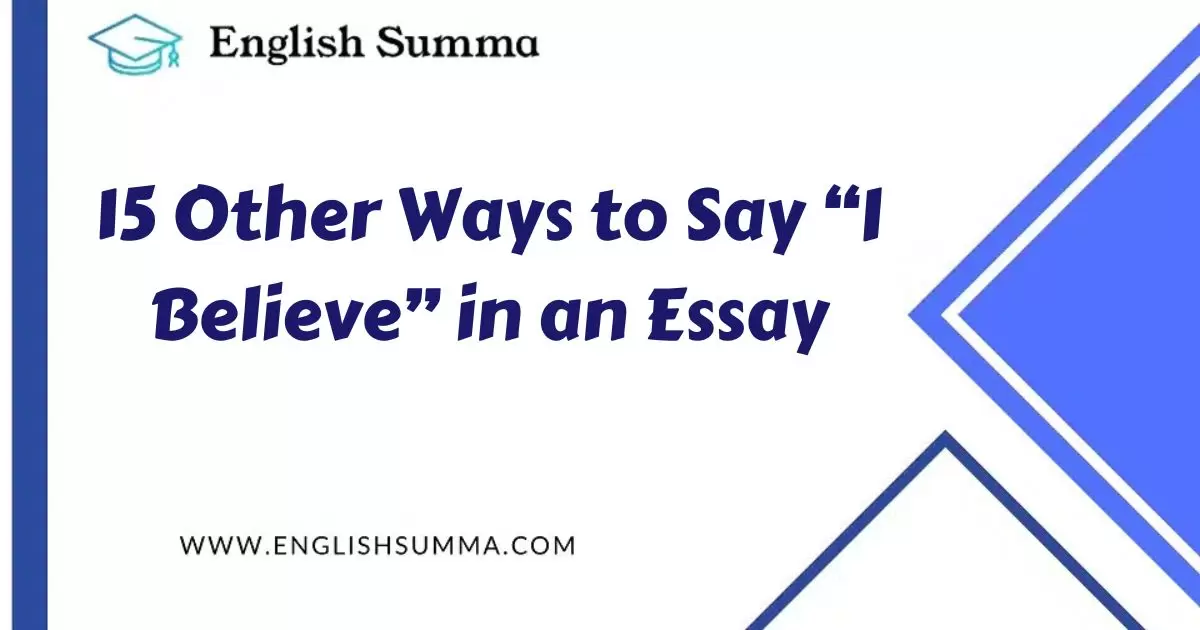
Introduction
Expressing one’s beliefs is an integral aspect of effective communication, especially in the realm of essay writing. While the phrase “I believe” is commonly used, a rich and varied vocabulary can enhance the expression of personal viewpoints. In this article, we’ll explore 15 alternative ways to convey belief in an essay, each with its unique nuances and applications. Let’s delve into diverse linguistic avenues to articulate your convictions with finesse and eloquence.
1. From Where I Stand
When discussing personal beliefs, using the phrase “from where I stand” adds a touch of perspective. This expression implies a particular viewpoint shaped by individual experiences or knowledge. For instance:
Scenario: Email to Justin Taylor
Subject: Exploring New Strategies for Project Management
Dear Justin,
I hope this message finds you well. From where I stand , I’ve been researching innovative project management approaches that could significantly enhance our team’s efficiency. Give me a few days to learn more about these methods, and we can discuss how they might benefit our ongoing projects.
Best regards,
James Wilson
Additional Note: This phrase allows you to bring attention to your unique position or insight on a particular matter.
2. My Take Is
The phrase “my take is” introduces a personal perspective or interpretation. It’s a more casual way of expressing one’s viewpoint.
Scenario: Team Meeting Discussion
Colleague: How do you think we should approach the client presentation?
You: Well, my take is that we should focus on highlighting the key features rather than delving too much into technical details. This way, we can better engage the client and address their specific needs.
Additional Note: This phrase is handy for informal settings, allowing you to share your opinion in a conversational manner.
3. In My Opinion
A classic alternative to “I believe,” “in my opinion” adds a layer of formality to your expression of belief.
Scenario: Academic Paper
Paragraph: The current economic policies have sparked debates among scholars. In my opinion , a comprehensive analysis of historical data is crucial to understanding the potential long-term effects of these policies.
Additional Note: This phrase is suitable for academic or professional contexts, conveying a thoughtful and considered viewpoint.
4. It Seems to Me
Adding a touch of subjectivity, “it seems to me” implies a sense of personal observation or interpretation.
Scenario: Discussion with a Friend
Friend: How did you find the movie?
You: Well, it seems to me that the plot was intricate, but the pacing could have been better.
Additional Note: This phrase is effective in expressing impressions or feelings about a situation.
5. I’m of the Opinion That
“I’m of the opinion that” is a more formal way of stating your belief, suitable for professional or academic discourse.
Scenario: Proposal Submission
Paragraph: In analyzing the current market trends, I’m of the opinion that our proposed marketing strategy aligns seamlessly with the evolving consumer preferences, positioning us for substantial growth.
Additional Note: This phrase carries a level of authority and is apt for situations where a more serious tone is required.
6. As Far as I Know
Introducing an element of uncertainty, “as far as I know” acknowledges the limitations of one’s knowledge.
Scenario: Group Research Project Update
You: As far as I know , the data collection process is on track, but we might encounter unforeseen challenges in the analysis phase.
Additional Note: This phrase is useful when expressing beliefs based on current knowledge while acknowledging the potential for new information.
7. My Position Is
Stating “my position is” conveys a sense of formality and authority, often used in professional or diplomatic contexts.
Scenario: Business Negotiation Email
After careful consideration, my position is that we should proceed with the proposed collaboration, as it aligns with our long-term strategic goals. I look forward to discussing the finer details in our upcoming meeting.
Additional Note: This phrase is suitable for asserting a stance in situations requiring a clear and decisive expression of belief.
8. In My View
Similar to “in my opinion,” “in my view” emphasizes a personal perspective while maintaining a more formal tone.
Scenario: Team Decision-Making Meeting
Team Lead: How do you think we should allocate resources for the upcoming project?
You: Well, in my view , prioritizing research and development would yield greater long-term benefits for our organization.
Additional Note: This phrase is versatile and can be employed in various professional or personal settings.
Don’t miss read out this Polite Ways to Say “I Called You, But You Didn’t Answer”
9. It Appears That
“It appears that” suggests a belief based on observable evidence or indications.
Scenario: Project Progress Report
Paragraph: After reviewing the project milestones, it appears that the team is ahead of schedule. This bodes well for the timely completion of the project.
Additional Note: This phrase is useful for conveying beliefs grounded in empirical evidence or visible trends.
10. From My Perspective
“From my perspective” is a straightforward way to express your point of view, often used in casual conversations or informal writing.
Scenario: Team Brainstorming Session
Colleague: How do you see the market evolving in the next quarter?
You: Well, from my perspective , consumer preferences are likely to shift towards more sustainable products.
Additional Note: This phrase is effective in providing a personal viewpoint without sounding overly formal.
11. My Take Is
Scenario: Virtual Team Discussion
Teammate: Any thoughts on how we can improve collaboration in our virtual team?
You: Absolutely. My take is that regular video meetings can help foster a stronger sense of connection among team members.
Additional Note: This phrase can be used in both professional and informal settings to convey personal opinions.
12. It Is My Contention That
A more assertive way to express belief, “it is my contention that” implies a strong argument or claim.
Scenario: Academic Debate Opening Statement
Opening Statement: In today’s debate, it is my contention that technological advancements have revolutionized communication, leading to profound societal changes.
Additional Note: This phrase is suitable for situations where you want to emphasize the strength of your belief or argument.
13. I Am Inclined to Think That
“I am inclined to think that” suggests a leaning towards a particular belief or opinion.
Manager: What’s your stance on adopting the new software?
You: Well, I am inclined to think that integrating the new software could streamline our workflow and improve overall efficiency.
Additional Note: This phrase conveys a sense of inclination or tendency in your belief.
14. In My Estimation
“In my estimation” adds a touch of calculation or assessment to your belief, suitable for situations where a measured opinion is required.
Scenario: Financial Analysis Report
Paragraph: In my estimation , the projected return on investment for the upcoming fiscal year is promising, given the current market trends.
Additional Note: This phrase is particularly effective in professional or analytical contexts where precision is valued.
15. I Maintain That
“I maintain that” conveys a sense of steadfastness and persistence in your belief, implying a continuous commitment to a particular viewpoint.
Scenario: Project Status Meeting
Team Lead: There have been concerns raised about the project timeline. What is your assessment?
You: Despite challenges, I maintain that our team is well-equipped to overcome these obstacles, and with collaborative effort, we can still meet the project deadlines.
Additional Note: This phrase is suitable for situations where you want to emphasize the ongoing validity of your belief.
Pros and Cons of Varied Expressions
While diversifying your language to express belief can enhance your communication, each phrase has its pros and cons.
- Clarity: Using diverse expressions ensures that your beliefs are communicated with precision, matching the tone and formality of the context.
- Engagement: Varied language keeps your writing interesting and engages the reader by avoiding repetitive phrases.
- Versatility: Different expressions suit different settings, allowing you to adapt your communication style to various audiences and situations.
- Overuse: While variety is beneficial, overusing different expressions in a single piece can lead to confusion or a lack of coherence.
- Inconsistency: Switching between expressions too frequently may create a disjointed flow in your writing, making it challenging for the reader to follow your line of thought.
- Context Sensitivity: Some expressions may be more suitable for specific contexts, and using them inappropriately may undermine the effectiveness of your communication.
In conclusion, the art of expressing beliefs in writing involves striking a balance between variety and coherence. While it’s essential to diversify your language to avoid monotony, it’s equally crucial to ensure that your expressions align with the context and maintain clarity for the reader.
By incorporating these alternative phrases into your writing arsenal, you can elevate your ability to articulate beliefs, fostering effective communication in both professional and personal spheres. Remember, the key lies not just in what you believe, but in how effectively you convey those beliefs to others.

Meet Steven Smith , the driving force behind “English Summa.” Armed with a Bachelor’s Degree in Linguistics and a passion for teaching, Steven is dedicated to unraveling language intricacies for eager minds. Join him on a journey of linguistic discovery through Language Odyssey—a space where education meets inspiration, and the beauty of language unfolds.
Leave a Comment Cancel reply
Save my name, email, and website in this browser for the next time I comment.
Recent Posts
Lucas’ or lucas’s, understanding brother’s or brothers’ or brothers, teacher’s, teachers’, or teachers, jones’ or jones’s, student’s, students’, or students, mystery: fox’s, foxes’, or foxes, backend, back-end, or back end, well written or well-written, problem solving or problem-solving, world class or world-class i which is correct., english summa.
Welcome to The English Summa, where language transforms into art. Explore dynamic lessons in synonyms, sentence structure, punctuation, possessives, and compound words. Elevate your English fluency and craft impactful expressions effortlessly. Join us on a journey of linguistic excellence
Top Categories
Punctuation
Compound Words
Possessives
Sentence Structure
Confusing Sentences
April 6, 2024
April 5, 2024
April 4, 2024
© 2024 English Summa
Terms of Service
Privacy policy
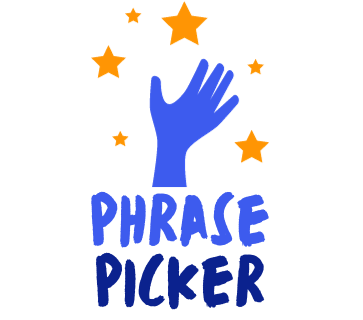
i believe in an essay
Table of contents.
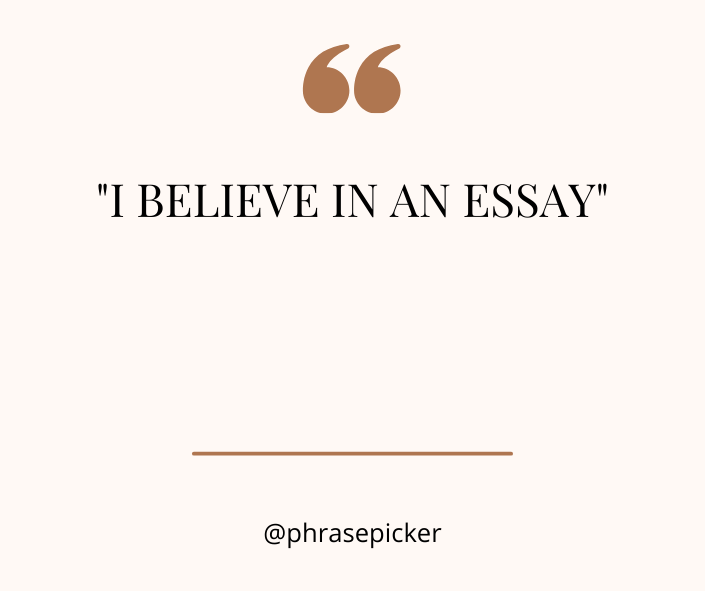
Introduction
The phrase ‘I believe’ is an important linguistic tool that can be used in essay writing to assert personal conviction or viewpoint on a subject matter. It is employed to communicate authentically and also to establish a personal connection with the readers. Although the phrase ‘I believe’ is frequently used in essay writing, there are a number of alternative phrases that can be employed to convey the same message with a similar impact. This article aims to provide an in-depth examination of the phrase ‘I believe’, its usage in essays, and will offer a set of alternative phrases that can be utilized as potent substitutes.
Key Takeaways
- The phrase ‘I believe’ in an essay demonstrates the personal conviction of the writer on the discussed topic.
- ‘I believe’ can sometimes make an essay feel less formal or academic, so it is important to consider the context before using it.
- Alternatives to ‘I believe’ might include ‘It is my view’, ‘In my opinion’, ‘I assert’, ‘I contend’, ‘I maintain’ and ‘I hold the view’.
Other Ways to Say “i believe in an essay”
- I am of the opinion that
- I think that
- I hold the view that
- My view is that
- From my perspective
- As far as I am concerned
- I consider that
- It seems to me that
- I am inclined to believe that
- I tend to agree that
- I am convinced that
- I feel that
- It is my belief that
- It is of my conviction that
A Formal Depiction of the Phrase I Believe in an Essay
Often, in academic and formal writing, there might be a need to depict a sober yet assertive tone. A statement like I believe could seem too straightforward or personal. Diversifying the phraseology can make your assertions more elegant and refined. For instance:
It is my contention that, I hold the view that, or It is my conviction that can serve as apt replacements for I believe.
Why would one consider these options? Using alternate phrases like these not only enriches your vocabulary but also enhances the gravitas of your essay. It provides a level of sophistication and assurance, subtly signifying that you have given thoughtful consideration to your argument.
Dear Reader, In the arena of writing, personal essays often incorpoate personal beliefs. One may present their viewpoints with the phrase ‘ I am of the conviction ‘. This serves as a formal variant of ‘ I believe ‘. Utilizing such language lends a greater sense of credibility and sophistication to your writing. Regards, Writer
How To Answer Formal
The phrase ‘I believe’ appears frequently in academic and casual writing, but it’s not always the best choice for more formal essays. Its direct nature can sometimes detract from your message by giving it a personal, subjective feel. For instance, if you write ‘I believe that environmental conservation is important’, your essay tends to sound personal rather than objective. To elevate the level of formality, use more impersonal phrases like ‘It is evident that’ , ‘Research suggests that’ , or ‘Based on the evidence, it can be inferred that’ . These alternatives lend an authoritative, evidence-based tone to your writing.
Similarly, the phrase ‘I believe’ may not be appropriate for scientific essays which require an impersonal tone. Using ‘The data indicates that’ or ‘Results show that’ would be more suitable in such cases. Ultimately, the choice between ‘I believe’ and its alternatives depends on the context of your writing, and understanding the requirements of particular academic fields will help in making the right choice.
- It is evident that climate change is a pressing global issue.
- Research suggests that machine learning has significant potential in healthcare.
- Based on the evidence, it can be inferred that global poverty rates are declining.
- The data indicates significant growth in the e-commerce industry.
- Results show that regular exercise can improve mental health.
Subject: Response to your ‘I believe in an essay’ statement Dear (Recipient’s Name), Thank you for expressing your confidence in essay writing. Here at (Your Name/Your Company’s Name), we value and support such dedication. As professional writers, we echo your sentiment, aligning with your belief in the transformative power of a well-crafted essay. We would be delighted to assist you further in any writing tasks or provide further insights into effective essay writing. Best regards, (Your Name/Your Company’s Name)
Informal Alternatives for ‘I Believe’ in Essays
In an informal context, ‘I believe’ can be replaced with more casual phrases. For example, we could use ‘ I reckon ‘, ‘ I’m of the view that ‘, or even simply ‘ I think ‘. These expressions provide a lighter tone and can be more relatable when writing for an audience that prefers a less formal style. The use of these alternatives can make your essay feel more approachable and less academic , inviting a wider range of readers to engage with your text. So, these informal variants are not just stylistic choices, but can also be strategic decisions depending on the essay’s intended audience and purpose.
Dear Reader, I wanted to chat with you about a concept that I’ve given a lot of thought to recently. I reckon that the use of personal pronouns in an essay can put forth persuasive and compelling arguments. Give it a spin the next time you jot down your thoughts. Remember, it’s your unique take that makes your writing special. Happy Writing!
How To Answer Informally
When stating your opinion or perspective in an essay, the phrase ‘I believe’ is often used. This phrase enables the writer to express their thoughts and ideas with conviction. When using this phrase, context is crucial. For example, in a persuasive essay, the writer uses the phrase to argue a point they’re passionate about. For instance, ‘I believe that we should implement stricter gun control laws.’ On the other hand, in a reflective essay, the writer might share a personal belief or experience, for instance, ‘I believe in the power of resilience.’
Though ‘I believe’ is formal and asserts the writer’s position, there are many ways to express the same sentiment in an informal way. Here are a few examples:
- ‘I reckon’
- ‘I figure’
- ‘It seems to me’
- ‘In my opinion’
- ‘I guess’
These alternatives, when used appropriately, can add a touch of informality and personality to your writing while maintaining the essence of your argument or viewpoint.
Hi there, Thanks for reaching out and expressing your approach! I also find value in the essay format and believe it’s a powerful tool for communication. Essays allow us to share our thoughts in a comprehensive way, making it easier for readers to grasp our ideas. Stay in touch and keep sharing your thoughts. Best, Your Name
Is It Correct to Say “i believe in an essay”?
Is it correct to say ‘I believe’ in an essay? This is a common question that many writers grapple with. When it comes to using the phrase ‘I believe’ in an essay, the answer largely depends on the context. In an academic setting, it’s often more appropriate to use phrases that display certainty and a clear stance based on evidence, such as ‘The evidence suggests’ or ‘Research indicates’ . However, in a more personal or reflective essay, the phrase ‘I believe’ can add a sense of individual conviction and a personal touch to your writing.
Is the phrase polite or rude? Primarily, it falls under the general category: it is neither intrinsically polite nor rude. Its appropriateness greatly depends on the context in which you incorporate it into your writing.
In conclusion , we hope that through this article, you’ve gained a clearer understanding of how to effectively utilize the phrase ‘I believe’ in an essay. Always remember, the choice of words can greatly impact the tone and clarity of your piece.

Ben Morrison
Ben Morrison is an English teacher and language blogger known for his passion and expertise in English. At phrasepicker.com, he shares concise insights into language quirks and grammar, helping readers navigate the complexities of English with ease and enthusiasm. His posts are a treasure trove for anyone eager to polish their language skills.

Discover the richness of English at PhrasePicker.com – your ultimate resource for mastering the language. From grammar tips to idiomatic expressions, we cover it all. Elevate your English with us
Quick Links
Get in touch.
- Email: [email protected]
- Address: 1st Floor, 239 Kensington High St, London W8 6SN, United Kingdom
© All Rights Reserved.

12 Fresh Synonyms for ‘I Believe’ in an Essay: Boost Your Vocabulary
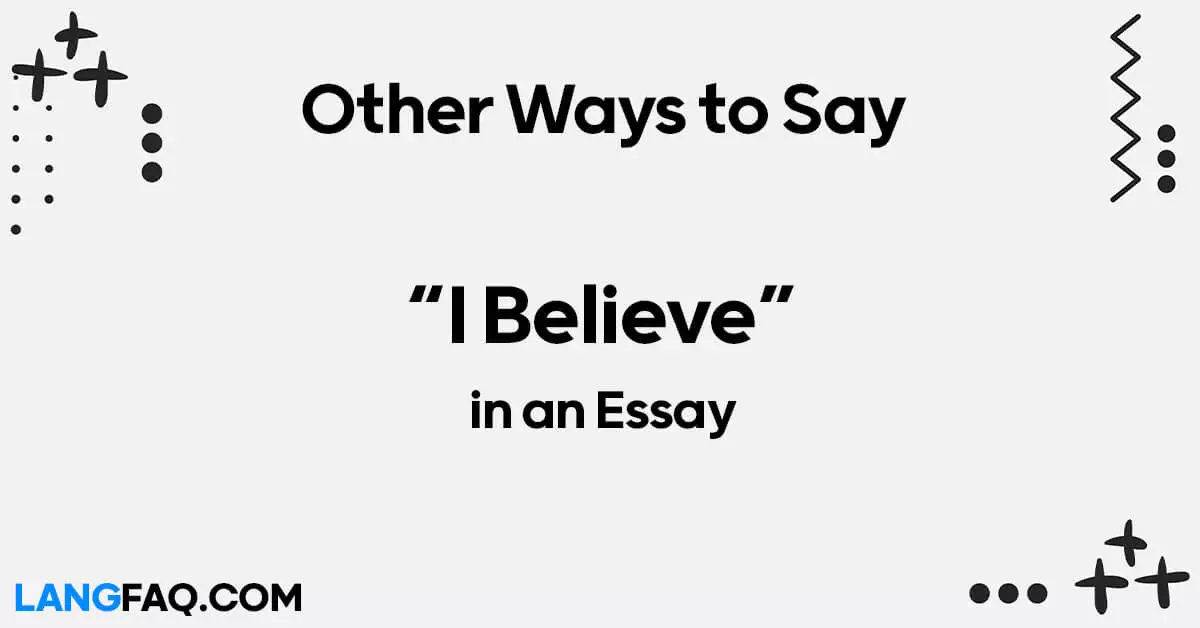
Share this post:
Welcome to our educational blog, where we’re dedicated to helping you elevate your command of the English language . In today’s article, we’re delving into the art of essay writing by exploring “12 Other Ways to Say ‘I Believe’ in an Essay.”
Whether you’re a student looking to impress your professors or a professional seeking to communicate with finesse, this article will provide you with valuable insights.
In the following sections, we’ll unlock a treasure trove of synonyms and creative expressions that will enrich your essays .
We understand that effective writing requires nuance and variety, and that’s precisely what we aim to deliver.
By the end of this article, you’ll have a toolkit of phrases at your disposal to convey your beliefs with eloquence and sophistication.
Key Takeaways:
- Uncover 12 synonyms for “I Believe” to diversify your essay vocabulary.
- Learn how to add depth and sophistication to your writing.
- Enhance your ability to convey thoughts and opinions effectively.
12 Other Ways to Say “I Believe” in an Essay
In the world of essay writing, using the same phrase repeatedly can make your writing monotonous and unimpressive. To help you elevate your essays, we’ve compiled a list of 12 alternative expressions for “I Believe.”
These phrases will add flavor and depth to your writing, making your essays stand out:
- In my opinion, – This classic phrase adds a personal touch to your beliefs.
- From my perspective, – Emphasizes your unique viewpoint.
- As far as I’m concerned, – Shows your commitment to your belief.
- It seems to me that, – Expresses a thoughtful observation.
- I am of the view that, – Conveys a structured and considered opinion.
- To my way of thinking, – Highlights your individual thought process.
- If you ask me, – Adds informality while asserting your opinion.
- I’d like to point out that, – Focuses on drawing attention to a specific aspect.
- It’s my contention that, – Suggests a strong belief or argument.
- I maintain that, – Demonstrates a firm stance on the topic.
- In my estimation, – Indicates a thoughtful evaluation.
- It’s worth noting that, – Emphasizes the significance of your belief.
By incorporating these alternatives into your essays, you’ll not only enrich your vocabulary but also convey your ideas with greater precision and impact. Experiment with these phrases and see how they can elevate your writing to the next level.
It’s My Contention That: Expressing Certainty and Conviction
In the realm of essay writing, conveying confidence in your beliefs is essential. The phrase “It’s my contention that” allows you to do just that. It implies a strong belief, showcasing your unwavering conviction in your argument.
When and Where to Use
- Formal Essays: “It’s my contention that” is highly suitable for formal essays, academic papers, or professional reports. It adds an authoritative tone to your writing.
- Professional Communication: You can use this phrase in professional emails or documents when you want to assert your viewpoint with conviction.
- Debates and Presentations: When you’re engaging in a debate or giving a presentation, using this phrase can emphasize your confidence in your position.
Example Sentences
- In a formal essay: “It’s my contention that the impact of climate change on our planet is undeniable, and immediate action is imperative.”
- In a professional email: “It’s my contention that implementing this strategy will lead to significant cost savings for our company.”
Variations for Different Contexts
- Colleagues: “I firmly believe that”
- Friends: “I’m absolutely convinced that”
- Mentor-Mentee: “It’s my strong belief that”
Pros and Cons
- Conveys a high level of certainty and conviction.
- Adds an authoritative tone to your writing or speech.
- Might sound too formal for casual or creative writing.
- Should be used selectively to avoid overemphasis.
Grammar/Usage Rule: When using “It’s my contention that,” follow it with a complete sentence that elaborates on your belief.
Exception: In very formal contexts, it can be used as a standalone statement.
Definition: According to Cambridge Dictionary, “contention” means “a strong opinion that is expressed with confidence.”
Tips: Use this phrase when you want to assert your viewpoint firmly, but be mindful of its formality and use it appropriately in different contexts.
I Am Convinced That: Emphasizing Certainty and Belief
When you want to convey a high level of certainty and belief in your writing, the phrase “I am convinced that” is a powerful choice. It leaves no room for doubt and shows your unwavering commitment to your perspective.
- Formal Essays: “I am convinced that” is suitable for formal essays and academic papers when you want to assert your viewpoint confidently.
- Persuasive Writing: In persuasive essays or speeches, this phrase can make your arguments more compelling by highlighting your strong belief.
- Professional Correspondence: Use it in professional emails or reports to express your certainty in a particular course of action.
- In a formal essay: “I am convinced that renewable energy is the key to a sustainable future.”
- In a persuasive speech: “I am convinced that our community will benefit greatly from investing in education.”
- Friends: “I wholeheartedly believe that”
- Mentor-Mentee: “I am steadfast in my belief that”
- Conveys unwavering certainty and belief.
- Enhances the persuasive impact of your writing or speech.
- May sound overly assertive in some contexts.
- Should be used judiciously to avoid appearing dogmatic.
Grammar/Usage Rule: Follow “I am convinced that” with a complete sentence that provides context or elaborates on your belief.
Definition: According to Cambridge Dictionary, “convinced” means “completely certain or sure about something.”
Tips: Use this phrase when you want to emphasize your strong conviction, but be aware of the potential for it to come across as too assertive in certain situations. Use it with confidence, but also with sensitivity to your audience’s expectations.
My Stance Is That: Clarifying Your Position
In the world of essay writing, clarity is key. You want your readers to understand your position on a topic unequivocally. The phrase “My stance is that” is a straightforward way to achieve this, making your perspective clear and concise.
- Formal Essays: “My stance is that” is ideal for formal essays, research papers, or any academic writing where you need to express your viewpoint clearly.
- Debates and Discussions: In debates or discussions, using this phrase can help you state your position in a way that leaves no room for misinterpretation.
- Argumentative Writing: If you’re writing an argumentative essay, this phrase can be particularly effective in presenting your thesis statement.
- In a formal essay: “My stance is that access to quality healthcare is a fundamental human right.”
- In a debate: “My stance is that stricter environmental regulations are necessary to combat climate change.”
- Colleagues: “I firmly hold that”
- Friends: “I strongly believe that”
- Mentor-Mentee: “My unwavering position is that”
- Provides clarity about your position.
- Effective for stating your thesis or central argument.
- Can be considered somewhat formal for casual writing.
- Use it selectively to avoid repetitiveness in your writing.
Grammar/Usage Rule: Follow “My stance is that” with a clear and concise statement of your position or belief.
Definition: According to Cambridge Dictionary, “stance” refers to “a particular way of thinking about something, especially expressed in a publicly stated opinion.”
Tips: Use this phrase when you want to leave no room for ambiguity regarding your position on a topic. It’s especially useful in academic or formal contexts where clarity is paramount.
I Maintain That: Upholding Your Belief
When you want to convey a sense of active commitment to your belief, the phrase “I maintain that” is a powerful choice. It suggests that you not only hold a particular viewpoint but also actively stand by it.
- Formal Essays: “I maintain that” is appropriate for formal essays, research papers, or any academic writing where you want to assert your commitment to your belief.
- Argumentative Writing: In argumentative essays, this phrase can emphasize your unwavering support for your thesis.
- Professional Discussions: Use it in professional discussions or presentations to demonstrate your firm belief in a particular idea or strategy.
- In a formal essay: “I maintain that art has the power to shape society and inspire change.”
- In a professional presentation: “I maintain that our company’s commitment to sustainability sets us apart from our competitors.”
- Colleagues: “I stand firmly by the belief that”
- Friends: “I passionately believe that”
- Mentor-Mentee: “I uphold the view that”
- Expresses active commitment to your belief.
- Adds a level of conviction and dedication to your writing or speech.
- May come across as overly assertive in some contexts.
- Use it judiciously to avoid appearing dogmatic.
Grammar/Usage Rule: Follow “I maintain that” with a clear and concise statement that reinforces your belief.
Definition: According to Cambridge Dictionary, “maintain” means “to continue to believe or do something, or to state that something is true, even though it may not be generally accepted.”
Tips: Use this phrase when you want to emphasize your active commitment to your belief. It conveys a strong sense of dedication and can be particularly effective in persuasive or argumentative writing. However, be mindful of the context and tone to avoid appearing too forceful.
In My Estimation: Emphasizing Thoughtful Consideration
In the realm of essay writing, showcasing your thoughtful consideration of a topic is essential. The phrase “In my estimation” allows you to do just that. It emphasizes that your viewpoint is the result of careful evaluation and analysis.
- Formal Essays: “In my estimation” is well-suited for formal essays, academic papers, or any writing where you want to convey that your viewpoint is the result of thorough consideration.
- Analytical Writing: If you’re writing an analytical essay, this phrase can underscore the depth of your analysis.
- Professional Reports: Use it in professional reports or documents when you want to express that your conclusions are based on meticulous examination.
- In a formal essay: “In my estimation, the economic benefits of sustainable agriculture far outweigh the initial investment.”
- In a research paper: “In my estimation, the data supports the hypothesis that increased exercise leads to improved mental health .”
- Colleagues: “I’ve carefully considered and believe that”
- Friends: “After thoughtful reflection, I believe that”
- Mentor-Mentee: “In my considered judgment, I hold that”
- Demonstrates that your viewpoint is the result of careful analysis.
- Adds an air of authority and thoughtfulness to your writing.
- May be considered somewhat formal for casual writing.
- Use it selectively to avoid overemphasizing your analysis.
Grammar/Usage Rule: Follow “In my estimation” with a clear and concise statement that reflects your thoughtful analysis of the topic.
Definition: According to Cambridge Dictionary, “estimation” refers to “the act of forming an opinion about something.”
Tips: Use this phrase when you want to convey that your viewpoint is the product of thorough consideration and analysis. It’s particularly effective in academic or formal contexts where demonstrating thoughtfulness is important.
To My Way of Thinking: Inviting Perspective
In the world of essay writing, inviting readers to see things from your perspective can be a powerful tool. The phrase “To my way of thinking” does just that. It adds a personal touch and encourages readers to consider your viewpoint.
- Formal Essays: “To my way of thinking” is suitable for formal essays, research papers, or any academic writing where you want to invite readers to see things from your perspective.
- Opinion Pieces: In opinion-based essays or editorials, this phrase can help you establish your unique viewpoint.
- Persuasive Writing: Use it in persuasive essays or speeches to encourage your audience to adopt your perspective.
- In a formal essay: “To my way of thinking, the principles of democracy are the foundation of a just society.”
- In an opinion piece: “To my way of thinking, the arts play a vital role in fostering creativity and innovation.”
- Colleagues: “From my perspective, I believe that”
- Friends: “In my view, I think that”
- Mentor-Mentee: “To my understanding, I hold that”
- Invites readers to consider your viewpoint.
- Adds a personal touch to your writing, making it more relatable.
- Can be considered somewhat informal for highly formal writing.
- Ensure it aligns with the tone and context of your piece.
Grammar/Usage Rule: Follow “To my way of thinking” with a clear statement that presents your perspective or belief.
Definition: According to Cambridge Dictionary, “perspective” refers to “a particular way of considering something.”
Tips: Use this phrase when you want to invite readers to view the topic from your perspective. It adds a personal touch to your writing and encourages engagement by inviting consideration of your viewpoint. Be mindful of the formality of your writing and use it appropriately.
It Appears to Me That: Conveying Introspection and Reflection
In the realm of essay writing, expressing introspection and reflection can add depth to your arguments. The phrase “It appears to me that” allows you to do just that. It conveys a sense of personal contemplation and invites readers to explore your insights.
- Formal Essays: “It appears to me that” can be used in formal essays and academic papers when you want to express your viewpoint while acknowledging your own reflection.
- Reflective Writing: In reflective essays or pieces where personal insight is valuable, this phrase can emphasize your contemplative approach.
- Persuasive Writing: Use it in persuasive essays or speeches to present your arguments as a product of careful consideration.
- In a formal essay: “It appears to me that the role of technology in education is continually evolving.”
- In a reflective essay: “It appears to me that my experiences have shaped my perspective on leadership.”
- Colleagues: “In my personal reflection, I believe that”
- Friends: “As I’ve thought about it, I feel that”
- Mentor-Mentee: “Through introspection, I’ve come to the conclusion that”
- Conveys introspection and personal reflection.
- Invites readers to consider your insights and perspective.
- May be perceived as somewhat informal for highly formal writing.
- Use it in contexts where personal reflection is appropriate.
Grammar/Usage Rule: Follow “It appears to me that” with a clear statement that reflects your introspection and personal insight.
Definition: According to Cambridge Dictionary, “introspection” refers to “the examination of and attention to your own ideas, thoughts, and feelings.”
Tips: Use this phrase when you want to convey a sense of personal reflection and introspection in your writing. It adds depth to your arguments and invites readers to explore your insights. Be mindful of the context and tone of your writing to use it effectively.
My Viewpoint Is That: Clarity in Expression
Clarity in essay writing is paramount, especially when expressing your beliefs. The phrase “My viewpoint is that” is a straightforward way to achieve this, ensuring your perspective is clear and easily understood by your readers.
- Formal Essays: “My viewpoint is that” is appropriate for formal essays, academic papers, or any writing where you need to express your viewpoint with precision.
- Analytical Writing: If you’re writing an analytical essay or report, this phrase can help you present your perspective in a clear and concise manner.
- Professional Documents: Use it in professional documents, such as reports or proposals, to ensure your viewpoint is explicitly stated.
- In a formal essay: “My viewpoint is that cultural diversity enriches our society in numerous ways.”
- In a professional report: “My viewpoint is that the proposed strategy aligns with our long-term goals.”
- Colleagues: “I hold the perspective that”
- Friends: “I believe that”
- Mentor-Mentee: “From my standpoint, I think that”
- Provides clarity and precision in expressing your viewpoint.
- Suitable for both formal and professional writing contexts.
- May sound somewhat formal for casual writing.
Grammar/Usage Rule: Follow “My viewpoint is that” with a clear and concise statement of your perspective or belief.
Definition: According to Cambridge Dictionary, “viewpoint” refers to “a way of considering something.”
Tips: Use this phrase when you want to ensure your viewpoint is expressed with utmost clarity. It’s particularly effective in formal and professional contexts where precision is crucial. Be mindful of the context and tone to use it appropriately.
In My Considered Judgment: A Deliberate Perspective
When you wish to convey a perspective rooted in careful thought and consideration, the phrase “In my considered judgment” is a distinguished choice. It signifies that your viewpoint is the product of thorough analysis and evaluation.
- Formal Essays: “In my considered judgment” is fitting for formal essays, research papers, or academic writing where you want to emphasize your thoughtful approach.
- Analytical Writing: In analytical essays or reports, this phrase can underscore the depth of your analysis and conclusions.
- Professional Reports: Use it in professional documents, such as reports or proposals, to express that your judgments are based on meticulous examination.
- In a formal essay: “In my considered judgment, the ethical implications of artificial intelligence warrant careful scrutiny.”
- In a professional report: “In my considered judgment, the data indicates a need for strategic adjustments in our marketing approach.”
- Colleagues: “I’ve thoroughly examined and believe that”
- Friends: “After careful thought, I feel that”
- Mentor-Mentee: “Through in-depth analysis, I’ve arrived at the conclusion that”
- Conveys a perspective rooted in careful analysis and judgment.
Grammar/Usage Rule: Follow “In my considered judgment” with a clear and concise statement that reflects your thorough analysis and judgment.
Definition: According to Cambridge Dictionary, “considered” means “thought carefully about something.”
Tips: Use this phrase when you want to emphasize the depth of your analysis and judgment in your writing. It adds a sense of authority and thoughtfulness to your arguments, making it particularly effective in formal and professional contexts. Be mindful of the context and tone to use it appropriately.
From My Perspective: Sharing Personal Insight
In the world of essay writing, sharing personal insight can be a powerful way to engage your readers. The phrase “From my perspective” accomplishes just that. It conveys that your viewpoint is shaped by your unique experiences and observations.
- Formal Essays: “From my perspective” is suitable for formal essays, research papers, or academic writing where you want to incorporate a personal touch.
- Persuasive Writing: In persuasive essays or speeches, this phrase can make your arguments more relatable by emphasizing your personal viewpoint.
- Professional Communication: Use it in professional emails, reports, or documents when you want to express your perspective while acknowledging its personal nature.
- In a formal essay: “From my perspective, the role of art in society extends beyond aesthetics; it serves as a reflection of our cultural identity .”
- In a professional email: “From my perspective, the proposed project timeline is ambitious but achievable.”
- Colleagues: “Based on my experiences and observations, I believe that”
- Friends: “In my personal view, I think that”
- Mentor-Mentee: “Drawing from my own insights, I hold that”
- Shares personal insight and experiences, making your writing more relatable.
- Adds a personal touch while maintaining a formal tone.
- May not be suitable for highly formal or objective writing where personal perspective is discouraged.
- Use it in contexts where personal insight is relevant and adds value.
Grammar/Usage Rule: Follow “From my perspective” with a clear statement that presents your personal viewpoint or belief.
Tips: Use this phrase when you want to incorporate a personal touch and share your unique perspective in your writing. It can make your arguments more relatable and engaging, particularly in formal and professional contexts. Be mindful of the context and tone to use it effectively.
To My Mind: Expressing Personal Opinion
When you want to express your personal opinion in a straightforward and clear manner, the phrase “To my mind” is an excellent choice. It allows you to share your viewpoint while maintaining a respectful and thoughtful tone.
- Formal Essays: “To my mind” can be used in formal essays, research papers, or academic writing to express your personal opinion in a respectful way.
- Persuasive Writing: In persuasive essays or speeches, this phrase can help you present your arguments as the product of your personal perspective.
- Professional Correspondence: Use it in professional emails, reports, or documents to convey your opinion while acknowledging its personal nature.
- In a formal essay: “To my mind , the ethical implications of genetic engineering are complex and require careful consideration.”
- In a professional report: “To my mind, the proposed marketing strategy aligns well with our brand identity.”
- Colleagues: “In my personal opinion, I believe that”
- Friends: “Personally, I think that”
- Mentor-Mentee: “In my view, I hold that”
- Expresses personal opinion in a clear and respectful manner.
- May not be appropriate in highly formal or objective writing.
- Use it selectively to avoid overemphasizing personal opinion.
Grammar/Usage Rule: Follow “To my mind” with a clear and concise statement that presents your personal opinion or belief.
Definition: According to Cambridge Dictionary, “mind” refers to “the part of a person that makes it possible for him or her to think, feel emotions, and understand things.”
Tips: Use this phrase when you want to express your personal opinion in a clear and respectful way. It’s particularly effective in formal and professional contexts where you want to convey your viewpoint while maintaining a respectful tone. Be mindful of the context and tone to use it appropriately.
In conclusion, mastering the art of expression is crucial in essay writing. “12 Other Ways to Say ‘I Believe’ in an Essay” equips you with the tools needed to articulate your beliefs effectively. With these alternatives, you’ll infuse your essays with freshness and sophistication, leaving a lasting impression on your readers.
So go ahead, explore these phrases, and watch your writing soar to new heights.
Similar Posts
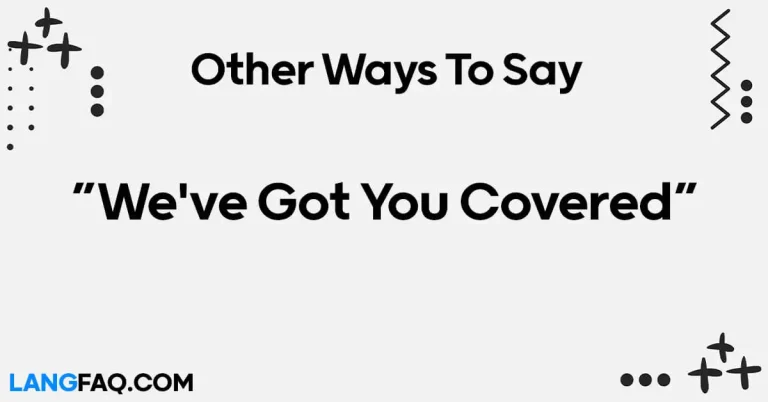
12 Other Ways to Say “We’ve Got You Covered”
Share this post: Facebook X Pinterest In the realm of communication, conveying assurance and support is paramount. The phrase “We’ve Got You Covered” is a staple, but diversity…
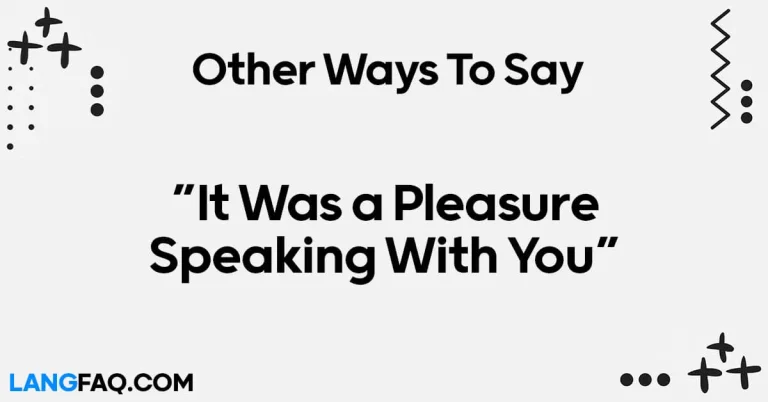
12 Other Ways to Say “It Was a Pleasure Speaking With You”
Engaging in meaningful conversations is an art, and expressing gratitude for enjoyable discussions can strengthen connections. In this article, we’ll delve into 12 alternative ways to convey “It…

12 Other Ways to Say “In Partnership With”
In today’s dynamic business landscape, effective communication is the key to successful partnerships. One crucial aspect is how we express collaboration. This article unveils 12 Other Ways to…

12 Other Ways to Say “Valuable Learning Experience”
In the journey of growth and development, each learning encounter is a valuable gem that enriches our understanding and shapes our perspectives. However, the way we articulate these…

12 Other Ways to Say “Have a Nice Day”
Embracing positivity in our daily lives goes beyond the ordinary “Have a Nice Day.” In this comprehensive guide, we explore 12 alternative ways to convey good wishes. Each…
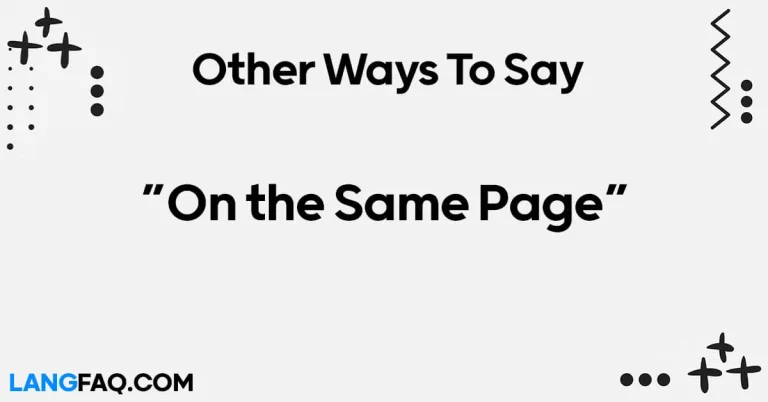
12 Other Ways to Say “On the Same Page”
Are you tired of using the same old phrase “On the Same Page” repeatedly? Do you want to add variety and flair to your communication? Look no further!…
Using “I” in Academic Writing
Traditionally, some fields have frowned on the use of the first-person singular in an academic essay and others have encouraged that use, and both the frowning and the encouraging persist today—and there are good reasons for both positions (see “Should I”).
I recommend that you not look on the question of using “I” in an academic paper as a matter of a rule to follow, as part of a political agenda (see webb), or even as the need to create a strategy to avoid falling into Scylla-or-Charybdis error. Let the first-person singular be, instead, a tool that you take out when you think it’s needed and that you leave in the toolbox when you think it’s not.
Examples of When “I” May Be Needed
- You are narrating how you made a discovery, and the process of your discovering is important or at the very least entertaining.
- You are describing how you teach something and how your students have responded or respond.
- You disagree with another scholar and want to stress that you are not waving the banner of absolute truth.
- You need “I” for rhetorical effect, to be clear, simple, or direct.
Examples of When “I” Should Be Given a Rest
- It’s off-putting to readers, generally, when “I” appears too often. You may not feel one bit modest, but remember the advice of Benjamin Franklin, still excellent, on the wisdom of preserving the semblance of modesty when your purpose is to convince others.
- You are the author of your paper, so if an opinion is expressed in it, it is usually clear that this opinion is yours. You don’t have to add a phrase like, “I believe” or “it seems to me.”
Works Cited
Franklin, Benjamin. The Autobiography of Benjamin Franklin . Project Gutenberg , 28 Dec. 2006, www.gutenberg.org/app/uploads/sites/3/20203/20203-h/20203-h.htm#I.
“Should I Use “I”?” The Writing Center at UNC—Chapel Hill , writingcenter.unc.edu/handouts/should-i-use-i/.
webb, Christine. “The Use of the First Person in Academic Writing: Objectivity, Language, and Gatekeeping.” ResearchGate , July 1992, doi: 10.1111/j.1365-2648.1992.tb01974.x.
J.S.Beniwal 05 August 2017 AT 09:08 AM
I have borrowed MLA only yesterday, did my MAEnglish in May 2017.MLA is of immense help for scholars.An overview of the book really enlightened me.I should have read it at bachelor's degree level.
Your e-mail address will not be published
Dr. Raymond Harter 25 September 2017 AT 02:09 PM
I discourage the use of "I" in essays for undergraduates to reinforce a conversational tone and to "self-recognize" the writer as an authority or at least a thorough researcher. Writing a play is different than an essay with a purpose.
Osayimwense Osa 22 March 2023 AT 05:03 PM
When a student or writer is strongly and passionately interested in his or her stance and argument to persuade his or her audience, the use of personal pronoun srenghtens his or her passion for the subject. This passion should be clear in his/her expression. However, I encourage the use of the first-person, I, sparingly -- only when and where absolutely necessary.
Eleanor 25 March 2023 AT 04:03 PM
I once had a student use the word "eye" when writing about how to use pronouns. Her peers did not catch it. I made comments, but I think she never understood what eye was saying!
Join the Conversation
We invite you to comment on this post and exchange ideas with other site visitors. Comments are moderated and subject to terms of service.
If you have a question for the MLA's editors, submit it to Ask the MLA!

Other-Ways-To-Say-I-Believe-In-An-Essay
Unveiling the diversity of conviction:.
Other Ways to Convey Belief in Your Essay
Belief, a cornerstone of human cognition, permeates every facet of our existence. It underpins our actions, shapes our perceptions, and defines our identities. In the realm of academia, expressing belief in an essay is not merely a matter of stating a personal stance; it’s an art form that requires nuance, sophistication, and a keen awareness of language’s power to captivate and persuade. In this exploration, we embark on a journey to uncover the myriad expressions that transcend the mundane proclamation of “I believe” in scholarly discourse. Prepare to delve into a tapestry of eloquence, where conviction intertwines with creativity to elevate your writing to new heights.

Other Ways to Say “I Believe” in an Essay:
- Asserting Certainty: When crafting your essay, infuse your prose with unwavering confidence. Replace the pedestrian “I believe” with resolute affirmations such as “I am convinced,” “I am certain,” or “I have no doubt.” These declarations not only exude authority but also convey a steadfast commitment to your viewpoint.
- Embracing Conviction: Embrace the fervor of your beliefs by employing expressions that resonate with passion and conviction. Instead of merely stating your stance, inject vigor into your writing with phrases like “I am steadfast in my conviction that,” “It is my firm belief that,” or “I am deeply convinced that.” Such language imbues your essay with emotional resonance, compelling readers to empathize with your perspective.
- Expressing Confidence: Confidence is key when articulating your beliefs. Replace the generic “I believe” with assertive statements such as “I am confident that,” “It is my unwavering belief that,” or “Without hesitation, I affirm.” By exuding certainty and assurance, you invite readers to trust in the validity of your arguments and insights.
- Conveying Faith: In the tapestry of language, faith weaves a thread of unwavering trust and belief. Infuse your essay with the essence of faith by employing expressions like “I have faith in,” “I place my trust in,” or “I am steadfast in my faith that.” Such phrases not only convey belief but also evoke a sense of devotion and loyalty to your convictions.
- Affirming Conviction: Strengthen the fabric of your argument by affirming your conviction with unwavering resolve. Replace the commonplace “I believe” with resolute affirmations such as “I am resolutely convinced,” “It is my unwavering conviction that,” or “I stand firmly by the belief that.” By asserting your conviction with clarity and determination, you establish yourself as a credible and persuasive voice in the academic discourse.
- Declaring Allegiance: Declare your allegiance to your beliefs with unwavering certainty and resolve. Replace the generic “I believe” with declarations such as “I pledge allegiance to,” “I stand unwaveringly by,” or “I am steadfast in my allegiance to.” By articulating your commitment with clarity and conviction, you invite readers to align themselves with your perspective and join you in the journey of exploration and discovery.
- Emphasizing Confidence: Confidence is the bedrock upon which belief stands tall. Infuse your essay with unwavering confidence by employing expressions such as “I am confident in asserting that,” “It is with full confidence that I state,” or “Without a shadow of a doubt, I affirm.” By exuding assurance and conviction, you compel readers to engage with your ideas with trust and respect.
In the realm of academic writing, the expression of belief transcends the mere declaration of personal opinion; it is a testament to the depth of one’s convictions and the power of language to convey them. By embracing the diverse array of expressions that go beyond the mundane “I believe,” you enrich your writing with nuance, sophistication, and persuasive power. So, as you embark on your next essay-writing odyssey, remember to wield the language with finesse, and let your beliefs shine brightly through the tapestry of your prose.
Have a language expert improve your writing
Run a free plagiarism check in 10 minutes, generate accurate citations for free.
- Knowledge Base
- How to write an argumentative essay | Examples & tips
How to Write an Argumentative Essay | Examples & Tips
Published on July 24, 2020 by Jack Caulfield . Revised on July 23, 2023.
An argumentative essay expresses an extended argument for a particular thesis statement . The author takes a clearly defined stance on their subject and builds up an evidence-based case for it.
Instantly correct all language mistakes in your text
Upload your document to correct all your mistakes in minutes

Table of contents
When do you write an argumentative essay, approaches to argumentative essays, introducing your argument, the body: developing your argument, concluding your argument, other interesting articles, frequently asked questions about argumentative essays.
You might be assigned an argumentative essay as a writing exercise in high school or in a composition class. The prompt will often ask you to argue for one of two positions, and may include terms like “argue” or “argument.” It will frequently take the form of a question.
The prompt may also be more open-ended in terms of the possible arguments you could make.
Argumentative writing at college level
At university, the vast majority of essays or papers you write will involve some form of argumentation. For example, both rhetorical analysis and literary analysis essays involve making arguments about texts.
In this context, you won’t necessarily be told to write an argumentative essay—but making an evidence-based argument is an essential goal of most academic writing, and this should be your default approach unless you’re told otherwise.
Examples of argumentative essay prompts
At a university level, all the prompts below imply an argumentative essay as the appropriate response.
Your research should lead you to develop a specific position on the topic. The essay then argues for that position and aims to convince the reader by presenting your evidence, evaluation and analysis.
- Don’t just list all the effects you can think of.
- Do develop a focused argument about the overall effect and why it matters, backed up by evidence from sources.
- Don’t just provide a selection of data on the measures’ effectiveness.
- Do build up your own argument about which kinds of measures have been most or least effective, and why.
- Don’t just analyze a random selection of doppelgänger characters.
- Do form an argument about specific texts, comparing and contrasting how they express their thematic concerns through doppelgänger characters.
Receive feedback on language, structure, and formatting
Professional editors proofread and edit your paper by focusing on:
- Academic style
- Vague sentences
- Style consistency
See an example

An argumentative essay should be objective in its approach; your arguments should rely on logic and evidence, not on exaggeration or appeals to emotion.
There are many possible approaches to argumentative essays, but there are two common models that can help you start outlining your arguments: The Toulmin model and the Rogerian model.
Toulmin arguments
The Toulmin model consists of four steps, which may be repeated as many times as necessary for the argument:
- Make a claim
- Provide the grounds (evidence) for the claim
- Explain the warrant (how the grounds support the claim)
- Discuss possible rebuttals to the claim, identifying the limits of the argument and showing that you have considered alternative perspectives
The Toulmin model is a common approach in academic essays. You don’t have to use these specific terms (grounds, warrants, rebuttals), but establishing a clear connection between your claims and the evidence supporting them is crucial in an argumentative essay.
Say you’re making an argument about the effectiveness of workplace anti-discrimination measures. You might:
- Claim that unconscious bias training does not have the desired results, and resources would be better spent on other approaches
- Cite data to support your claim
- Explain how the data indicates that the method is ineffective
- Anticipate objections to your claim based on other data, indicating whether these objections are valid, and if not, why not.
Rogerian arguments
The Rogerian model also consists of four steps you might repeat throughout your essay:
- Discuss what the opposing position gets right and why people might hold this position
- Highlight the problems with this position
- Present your own position , showing how it addresses these problems
- Suggest a possible compromise —what elements of your position would proponents of the opposing position benefit from adopting?
This model builds up a clear picture of both sides of an argument and seeks a compromise. It is particularly useful when people tend to disagree strongly on the issue discussed, allowing you to approach opposing arguments in good faith.
Say you want to argue that the internet has had a positive impact on education. You might:
- Acknowledge that students rely too much on websites like Wikipedia
- Argue that teachers view Wikipedia as more unreliable than it really is
- Suggest that Wikipedia’s system of citations can actually teach students about referencing
- Suggest critical engagement with Wikipedia as a possible assignment for teachers who are skeptical of its usefulness.
You don’t necessarily have to pick one of these models—you may even use elements of both in different parts of your essay—but it’s worth considering them if you struggle to structure your arguments.
Regardless of which approach you take, your essay should always be structured using an introduction , a body , and a conclusion .
Like other academic essays, an argumentative essay begins with an introduction . The introduction serves to capture the reader’s interest, provide background information, present your thesis statement , and (in longer essays) to summarize the structure of the body.
Hover over different parts of the example below to see how a typical introduction works.
The spread of the internet has had a world-changing effect, not least on the world of education. The use of the internet in academic contexts is on the rise, and its role in learning is hotly debated. For many teachers who did not grow up with this technology, its effects seem alarming and potentially harmful. This concern, while understandable, is misguided. The negatives of internet use are outweighed by its critical benefits for students and educators—as a uniquely comprehensive and accessible information source; a means of exposure to and engagement with different perspectives; and a highly flexible learning environment.
The body of an argumentative essay is where you develop your arguments in detail. Here you’ll present evidence, analysis, and reasoning to convince the reader that your thesis statement is true.
In the standard five-paragraph format for short essays, the body takes up three of your five paragraphs. In longer essays, it will be more paragraphs, and might be divided into sections with headings.
Each paragraph covers its own topic, introduced with a topic sentence . Each of these topics must contribute to your overall argument; don’t include irrelevant information.
This example paragraph takes a Rogerian approach: It first acknowledges the merits of the opposing position and then highlights problems with that position.
Hover over different parts of the example to see how a body paragraph is constructed.
A common frustration for teachers is students’ use of Wikipedia as a source in their writing. Its prevalence among students is not exaggerated; a survey found that the vast majority of the students surveyed used Wikipedia (Head & Eisenberg, 2010). An article in The Guardian stresses a common objection to its use: “a reliance on Wikipedia can discourage students from engaging with genuine academic writing” (Coomer, 2013). Teachers are clearly not mistaken in viewing Wikipedia usage as ubiquitous among their students; but the claim that it discourages engagement with academic sources requires further investigation. This point is treated as self-evident by many teachers, but Wikipedia itself explicitly encourages students to look into other sources. Its articles often provide references to academic publications and include warning notes where citations are missing; the site’s own guidelines for research make clear that it should be used as a starting point, emphasizing that users should always “read the references and check whether they really do support what the article says” (“Wikipedia:Researching with Wikipedia,” 2020). Indeed, for many students, Wikipedia is their first encounter with the concepts of citation and referencing. The use of Wikipedia therefore has a positive side that merits deeper consideration than it often receives.
An argumentative essay ends with a conclusion that summarizes and reflects on the arguments made in the body.
No new arguments or evidence appear here, but in longer essays you may discuss the strengths and weaknesses of your argument and suggest topics for future research. In all conclusions, you should stress the relevance and importance of your argument.
Hover over the following example to see the typical elements of a conclusion.
The internet has had a major positive impact on the world of education; occasional pitfalls aside, its value is evident in numerous applications. The future of teaching lies in the possibilities the internet opens up for communication, research, and interactivity. As the popularity of distance learning shows, students value the flexibility and accessibility offered by digital education, and educators should fully embrace these advantages. The internet’s dangers, real and imaginary, have been documented exhaustively by skeptics, but the internet is here to stay; it is time to focus seriously on its potential for good.
If you want to know more about AI tools , college essays , or fallacies make sure to check out some of our other articles with explanations and examples or go directly to our tools!
- Ad hominem fallacy
- Post hoc fallacy
- Appeal to authority fallacy
- False cause fallacy
- Sunk cost fallacy
College essays
- Choosing Essay Topic
- Write a College Essay
- Write a Diversity Essay
- College Essay Format & Structure
- Comparing and Contrasting in an Essay
(AI) Tools
- Grammar Checker
- Paraphrasing Tool
- Text Summarizer
- AI Detector
- Plagiarism Checker
- Citation Generator
An argumentative essay tends to be a longer essay involving independent research, and aims to make an original argument about a topic. Its thesis statement makes a contentious claim that must be supported in an objective, evidence-based way.
An expository essay also aims to be objective, but it doesn’t have to make an original argument. Rather, it aims to explain something (e.g., a process or idea) in a clear, concise way. Expository essays are often shorter assignments and rely less on research.
At college level, you must properly cite your sources in all essays , research papers , and other academic texts (except exams and in-class exercises).
Add a citation whenever you quote , paraphrase , or summarize information or ideas from a source. You should also give full source details in a bibliography or reference list at the end of your text.
The exact format of your citations depends on which citation style you are instructed to use. The most common styles are APA , MLA , and Chicago .
The majority of the essays written at university are some sort of argumentative essay . Unless otherwise specified, you can assume that the goal of any essay you’re asked to write is argumentative: To convince the reader of your position using evidence and reasoning.
In composition classes you might be given assignments that specifically test your ability to write an argumentative essay. Look out for prompts including instructions like “argue,” “assess,” or “discuss” to see if this is the goal.
Cite this Scribbr article
If you want to cite this source, you can copy and paste the citation or click the “Cite this Scribbr article” button to automatically add the citation to our free Citation Generator.
Caulfield, J. (2023, July 23). How to Write an Argumentative Essay | Examples & Tips. Scribbr. Retrieved April 11, 2024, from https://www.scribbr.com/academic-essay/argumentative-essay/
Is this article helpful?

Jack Caulfield
Other students also liked, how to write a thesis statement | 4 steps & examples, how to write topic sentences | 4 steps, examples & purpose, how to write an expository essay, "i thought ai proofreading was useless but..".
I've been using Scribbr for years now and I know it's a service that won't disappoint. It does a good job spotting mistakes”

What Is Another Way to Say “I Believe”?
September 18, 2023
Kahlan House
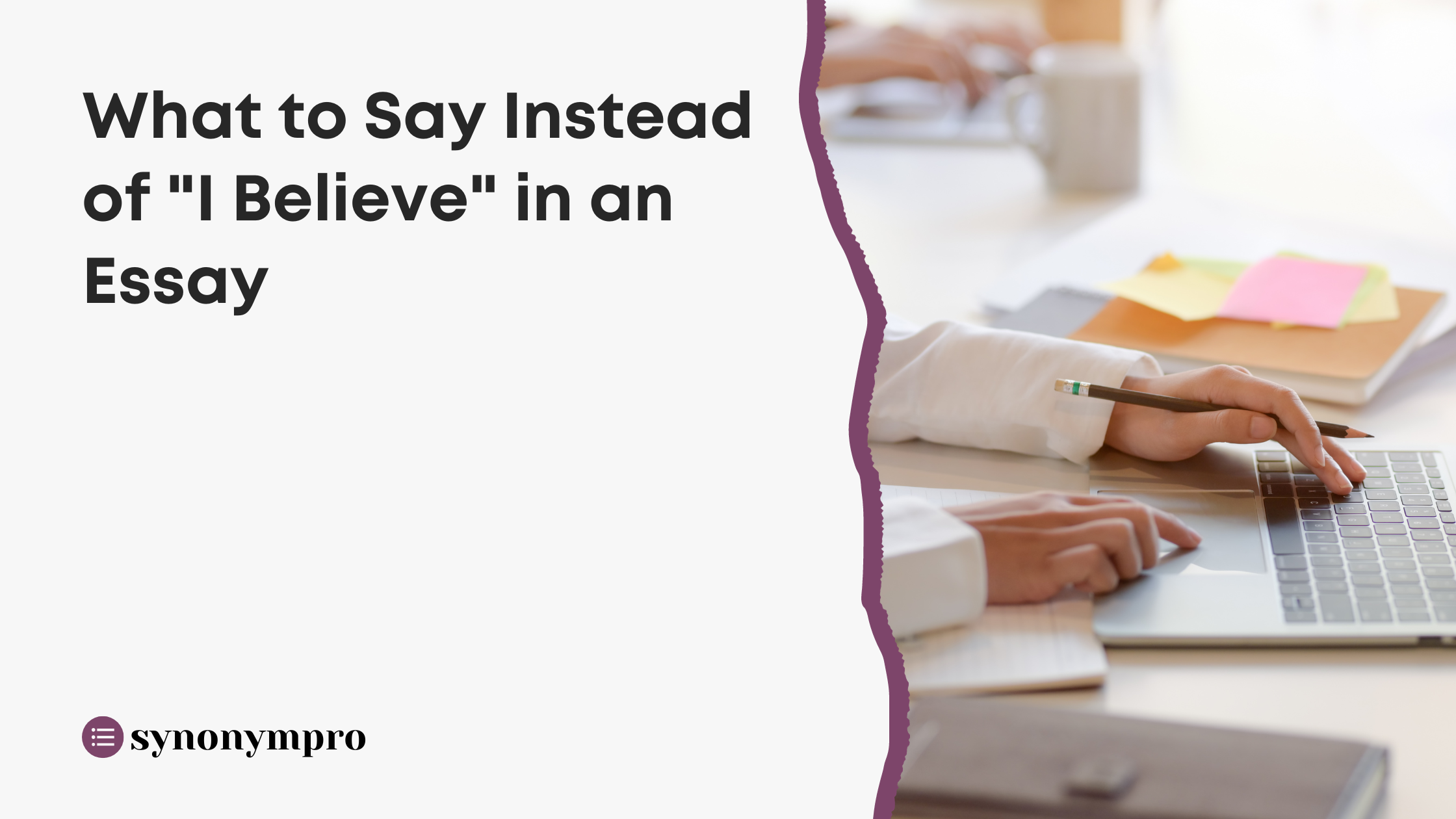
You want to express your opinion in an argumentative or discursive essay.
But is it appropriate to use the phrase I believe in academic writing?
We’ll discuss the correctness of this phrase below. In addition, we’ll show you 6 alternative phrases that you can use to diversify your papers and avoid personal pronouns as needed.

6 Alternative Ways to Say “I Believe” in an Essay
Below, you’ll find 6 alternative phrases to I believe that you can use in your academic writing:
- One might argue
- From my perspective
- This illustrates
- It is the author’s opinion
- I would argue
1. It Appears
You can use the phrase it appears when you want to state your opinion about an issue without using the personal pronoun “I.”
This phrase implies that you are about to extrapolate from some data or something you have observed . Therefore, you are expressing what you think that data indicates.
The benefit of this phrase is that it doesn’t state your observation as a hard and clear fact.
Instead, it suggests that you are simply making an observation that the reader can consider and form their own opinion about.
This makes it a good, tentative phrase for when you want to point something out without making any sweeping statements on the topic.
For example:
Upon studying the graph above, it appears that the impacts of the pandemic have had a lasting effect on small businesses more so than their larger, corporate counterparts.
2. One Might Argue
One might argue is a great phrase to use in an argumentative essay when you want to set out your opinion on your topic without using any personal pronouns.
The inclusion of “might” makes it clear that you are only suggesting a possible argument based on all the information you have provided in your paper.
See how we’ve used it in an example:
One might argue that the pursuit of a sustainable diet requires more than simply switching to plant-based meals, but rather a greater participation in land reform activism.
3. From My Perspective
From my perspective is another way to say I believe in an essay when you want to clearly and unequivocally state your opinions or beliefs about a topic.
This phrase may be a tad risky since it uses the personal pronoun “my.”
However, it would be perfectly suitable to use this phrase if you have discussed your writing with the marker of your essay.
In addition, it can be just as valuable to base your writing on your perspective if you are a professional or knowledgeable academic in your field.
After all, in this context, you will be providing your expert opinion on the issue.
Thus, stating that you are providing your opinion should be no less compelling to any reader.
Consider the example below:
From my perspective , one must dismantle the lens of Western individualism through which they see the world before they can address the issues caused by colonialism.
4. This Shows
You can use the phrase this shows to come across as more objective in your essay.
After all, you would usually use this phrase to draw a conclusion based on all the evidence you have set out in your paper.
Rather than stating what you as the writer believe, it states what both you and the reader can clearly see from the facts and evidence.
Of course, your conclusion on what certain data shows may differ from someone else. Thus, you can still use this phrase to state what you believe.
However, saying this shows allows you to remove any personal phrasing in the essay. As such, it allows the reader to focus on the facts in front of them.
Therefore, let’s see an essay snippet that includes this phrase:
Many children are given access to social media sites at the age of 13 to 14 on average. It is also around these ages that children report feelings of dread and insecurity. This shows that access to social media is indeed having an impact on the self-worth of pubescents.
5. This Illustrates
This illustrates is essentially a more formal synonym for this shows . Therefore, you can use either one of these phrases interchangeably.
Your choice may depend on the topic and nature of your paper, as well as what you want the prevailing tone of your essay to be.
The phrase this illustrates may come across as a touch more severe due to its formal phrasing. Meanwhile, this shows is more straightforward and accessible to read.
Check out this example to see this phrase in action:
Many respondents expressed distrust in many if not all of the reports from mainstream news stations. This illustrates how faith in the journalistic integrity of our media has decreased over the last decade.
6. It Is the Author’s Opinion
You can say it is the author’s opinion in your essay when you want to make clear that you are expressing your personal opinion on an issue.
Moreover, you can do this while still avoiding the phrase I believe and the use of personal pronouns. This will often suffice even according to stricter academics!
This phrase may be considered a tad verbose and outdated in modern times.
However, many writers prefer it as a stylistic choice.
Additionally, it’s a good way to ramp up your word count if you are struggling to reach your minimum!
See the example below:
Most experts have pointed to food processing procedures as the main culprit. However, it is the author’s opinion that the air quality in the city center plays a far greater role.
Is It Okay to Say “I Believe” in an Essay?
It is okay to say I believe in an essay in some circumstances .
There are many differing opinions over whether people should use personal pronouns in their essays, particularly in argumentative essays.
Some academics argue that phrases like I believe are redundant in an argumentative essay .
After all, the point of the essay is to express your opinions on a topic, so there’s no need to state as much.
However, many other academics argue that whether it is correct to say I believe depends greatly on the topic of the article, the style of the writer, and the intent of the paper.
Below, we’ll show you how to say I believe in an essay using two faux essay snippets:
However, I believe , and shall illustrate in this paper, that the Constitution is as malleable as the opinions and biases of those who are granted the power to interpret its content.
It is clear that our current procedures to ensure sustainability do not go far enough, and I believe this will be obvious to anyone privy to the current water crisis affecting several states in the south.
So, we know that there are instances in which you can use I believe in an academic essay.
However, personal pronouns are not preferred by all academics and are a risky choice in general.
Related posts:
- Another Way to Say “Please Don’t Hesitate to Contact Me”
- Another Way to Say “Food and Drinks Will Be Provided”
- What Is Another Way to Say “Talk to You Then”?
- What Is Another Way to Say “Just to Clarify”?
- What Is Another Way to Say “Correct Me if I’m Wrong”?
- What Is Another Way to Say “Family Emergency”?
- Another Way to Say “I Am Excited About the Opportunity”
- What Is Another Way to Say “Have You Had a Chance To”?
- What Is Another Way to Say “Have a Great Weekend”?
- What Is Another Way to Say “Enjoy Your Stay”?
[email protected]
We help you expand your vocabulary and improve your understanding of the English language.
© SynonymPro
10 English Phrases to Express Your Opinion in an Essay
This is a guest post by Sam Pealing. Make sure to visit his website EnglishForStudy.com for more academic English help!
I admire international students. Seriously. If you’re a non-native English speaker doing a degree or doctorate in English, then I take my hat off to you.
I get a lot of questions about writing essays, and I’ve taught hundreds of students how to write effective essays (which get good grades). One of the most common mistakes that I see is a lack of opinion.
Most of the time, students describe a situation, but they don’t give their opinion or stance. This can really damage your grade because lecturers are always looking for ‘critical thinking’. If you don’t give your opinion in your essays, your lecturers can’t see your critical thinking.
To put it simply: If you don’t put your opinion or stance in an essay, then you’ll probably lose marks.
In this article, you’ll learn 10 effective phrases that you can use to give your opinion in your essay. I’ve also created a free lesson pack which will help you to practice the phrases in this article. CLICK HERE to download it.
Introducing the Phrases
If you’re looking for a quick fix for your essay, these phrases should help you to start putting your own opinions in your essays.
But, before you rush over to your essays to start putting these phrases in, there’s something you need to know.
If you’re writing an academic essay, you will need to support your opinions with strong evidence . This is especially true if you are using some of the stronger phrases.
This evidence can be a journal article, a lecture, a textbook, or something else which is a trustworthy source of information.
In a more informal essay, like one in an IELTS or TOEFL language test, you don’t need to support your answers with strong evidence. Your experiences or opinions will be enough.
Quick note : I know! You’re ready to see the phrases.
This won’t take long and it’s really important.
1. For these phrases to be really effective, you’ll need to review your grammar. Shayna has some great videos on her Espresso English Youtube channel .
I recommend these:
- Subject/Verb agreement
- Formal and Informal English
- Correcting Grammar Mistakes
2. If you want to know the structure of a good essay paragraph, check my post here .

Informal English Phrases
These phrases are suitable for language tests such as TOEFL or IELTS. In an academic essay, these phrases will probably be too informal because they are too personal.
“In my opinion, + [your sentence]”
- In my opinion , a good education is more important than a good car.
“I believe that + [your sentence]”
- I believe that schools should encourage students to walk or cycle to school rather than drive.
“In my mind, + [your sentence]”
- “ In my mind , no-one should have to pay for medical care.”
More Formal Academic Phrases With ‘That’
These phrases are more suitable for academic essays. If you are unsure whether you should use an informal phrase or an academic phrase, use an academic one. If you think your writing might be informal, read this post to learn more.
The patterns here are quite straightforward. Just add your sentence after ‘that’.
“It would seem that + [your sentence]”
Use this when you support your opinion with evidence.
- “ It would seem that children learn best when they are feeling comfortable.”
“It could be argued that + [your sentence]”
Use this when you want to challenge an existing opinion.
- “ It could be argued that the benefits outweigh the drawbacks in this situation.”
“This suggests that + [your sentence]”
Use this when you don’t want to fully commit to an opinion. You’re giving yourself some distance.
- “ The evidence suggests that people who speak more than one language have more job opportunities.”
“This proves that + [your sentence]”
Use this when you are confident with your opinion. This phrase is quite strong*
- “ This proves that the best way to lose weight is through a controlled diet and a good exercise program.”
“This supports the idea that + [your sentence]”
Use this one when you are supporting an opinion that you have already made.
- “ This new research supports the idea that successful English learners look for opportunities to use English.”
Other Ways to Express Opinion
“although [idea you disagree with], [idea you agree with]”.
Use this when you want make your opinion seem balanced.
- “ Although reports suggest that cigarettes could help people to lose weight, there are too many serious health problems associated with smoking.”
Note: The ‘ although’ pattern is very effective because it shows two sides of the argument. In the example, I support the idea that smoking is bad for your health –BUT- I recognise that it could have some benefits.
Structure your ‘ although’ sentence like this: Although, [weaker argument you disagree with], [stronger argument you agree with].
Using Adverbs, Adjectives and Nouns
You can use adjectives to show your opinion.
- “This research was poorly conducted with a lack of control .”
The adjective and nouns in the example are negative . You can get some good ideas from this video on Extreme Adjectives . Note: try not to use any emotional adjectives .
Make Your Own Phrases!
Of course, these phrases aren’t the only ones that you can use! You can find more – or – you can create your own by combining different patterns.
Here’s an example of #7, #9 and #10 used together.
“Although it is difficult for older adults to learn a second language, an important study by Smith (2014) proved that the elderly can successfully learn new languages.”
What Should You Do Now?
So now you should have a better idea of how to include more opinions in your essays. But that’s not all; there are probably some new words here that you don’t know.
So here’s what you should do:
- Choose three of the opinion expressions and phrases that you want to try.
- Practice writing sentences using them (if you don’t have a topic, try this: should students do homework? You can see examples of this in the lesson pack )
- Get the Lesson Pack for this lesson (which contains the vocabulary and the phrases from this lesson) CLICK HERE to download it .
Learn more:
- Basic English phrases
- Intermediate English phrases
- Advanced English phrases
About Sam Pealing
Sam Pealing is an English language coach who specialises in two important areas: 1. helping you to get great grades at university, and 2. helping you to become an effective and confident English user. If you’re feeling frustrated or confused with English, Sam has created the perfect email course for you! You can join his course here –or- you can read more by him on English For Study .
Get corrections on your written English:

More Espresso English Lessons:
About the author.
Shayna Oliveira
Shayna Oliveira is the founder of Espresso English, where you can improve your English fast - even if you don’t have much time to study. Millions of students are learning English from her clear, friendly, and practical lessons! Shayna is a CELTA-certified teacher with 10+ years of experience helping English learners become more fluent in her English courses.

Choose Your Test
Sat / act prep online guides and tips, how to write an a+ argumentative essay.
Miscellaneous

You'll no doubt have to write a number of argumentative essays in both high school and college, but what, exactly, is an argumentative essay and how do you write the best one possible? Let's take a look.
A great argumentative essay always combines the same basic elements: approaching an argument from a rational perspective, researching sources, supporting your claims using facts rather than opinion, and articulating your reasoning into the most cogent and reasoned points. Argumentative essays are great building blocks for all sorts of research and rhetoric, so your teachers will expect you to master the technique before long.
But if this sounds daunting, never fear! We'll show how an argumentative essay differs from other kinds of papers, how to research and write them, how to pick an argumentative essay topic, and where to find example essays. So let's get started.
What Is an Argumentative Essay? How Is it Different from Other Kinds of Essays?
There are two basic requirements for any and all essays: to state a claim (a thesis statement) and to support that claim with evidence.
Though every essay is founded on these two ideas, there are several different types of essays, differentiated by the style of the writing, how the writer presents the thesis, and the types of evidence used to support the thesis statement.
Essays can be roughly divided into four different types:
#1: Argumentative #2: Persuasive #3: Expository #4: Analytical
So let's look at each type and what the differences are between them before we focus the rest of our time to argumentative essays.
Argumentative Essay
Argumentative essays are what this article is all about, so let's talk about them first.
An argumentative essay attempts to convince a reader to agree with a particular argument (the writer's thesis statement). The writer takes a firm stand one way or another on a topic and then uses hard evidence to support that stance.
An argumentative essay seeks to prove to the reader that one argument —the writer's argument— is the factually and logically correct one. This means that an argumentative essay must use only evidence-based support to back up a claim , rather than emotional or philosophical reasoning (which is often allowed in other types of essays). Thus, an argumentative essay has a burden of substantiated proof and sources , whereas some other types of essays (namely persuasive essays) do not.
You can write an argumentative essay on any topic, so long as there's room for argument. Generally, you can use the same topics for both a persuasive essay or an argumentative one, so long as you support the argumentative essay with hard evidence.
Example topics of an argumentative essay:
- "Should farmers be allowed to shoot wolves if those wolves injure or kill farm animals?"
- "Should the drinking age be lowered in the United States?"
- "Are alternatives to democracy effective and/or feasible to implement?"
The next three types of essays are not argumentative essays, but you may have written them in school. We're going to cover them so you know what not to do for your argumentative essay.
Persuasive Essay
Persuasive essays are similar to argumentative essays, so it can be easy to get them confused. But knowing what makes an argumentative essay different than a persuasive essay can often mean the difference between an excellent grade and an average one.
Persuasive essays seek to persuade a reader to agree with the point of view of the writer, whether that point of view is based on factual evidence or not. The writer has much more flexibility in the evidence they can use, with the ability to use moral, cultural, or opinion-based reasoning as well as factual reasoning to persuade the reader to agree the writer's side of a given issue.
Instead of being forced to use "pure" reason as one would in an argumentative essay, the writer of a persuasive essay can manipulate or appeal to the reader's emotions. So long as the writer attempts to steer the readers into agreeing with the thesis statement, the writer doesn't necessarily need hard evidence in favor of the argument.
Often, you can use the same topics for both a persuasive essay or an argumentative one—the difference is all in the approach and the evidence you present.
Example topics of a persuasive essay:
- "Should children be responsible for their parents' debts?"
- "Should cheating on a test be automatic grounds for expulsion?"
- "How much should sports leagues be held accountable for player injuries and the long-term consequences of those injuries?"
Expository Essay
An expository essay is typically a short essay in which the writer explains an idea, issue, or theme , or discusses the history of a person, place, or idea.
This is typically a fact-forward essay with little argument or opinion one way or the other.
Example topics of an expository essay:
- "The History of the Philadelphia Liberty Bell"
- "The Reasons I Always Wanted to be a Doctor"
- "The Meaning Behind the Colloquialism ‘People in Glass Houses Shouldn't Throw Stones'"
Analytical Essay
An analytical essay seeks to delve into the deeper meaning of a text or work of art, or unpack a complicated idea . These kinds of essays closely interpret a source and look into its meaning by analyzing it at both a macro and micro level.
This type of analysis can be augmented by historical context or other expert or widely-regarded opinions on the subject, but is mainly supported directly through the original source (the piece or art or text being analyzed) .
Example topics of an analytical essay:
- "Victory Gin in Place of Water: The Symbolism Behind Gin as the Only Potable Substance in George Orwell's 1984"
- "Amarna Period Art: The Meaning Behind the Shift from Rigid to Fluid Poses"
- "Adultery During WWII, as Told Through a Series of Letters to and from Soldiers"

There are many different types of essay and, over time, you'll be able to master them all.
A Typical Argumentative Essay Assignment
The average argumentative essay is between three to five pages, and will require at least three or four separate sources with which to back your claims . As for the essay topic , you'll most often be asked to write an argumentative essay in an English class on a "general" topic of your choice, ranging the gamut from science, to history, to literature.
But while the topics of an argumentative essay can span several different fields, the structure of an argumentative essay is always the same: you must support a claim—a claim that can reasonably have multiple sides—using multiple sources and using a standard essay format (which we'll talk about later on).
This is why many argumentative essay topics begin with the word "should," as in:
- "Should all students be required to learn chemistry in high school?"
- "Should children be required to learn a second language?"
- "Should schools or governments be allowed to ban books?"
These topics all have at least two sides of the argument: Yes or no. And you must support the side you choose with evidence as to why your side is the correct one.
But there are also plenty of other ways to frame an argumentative essay as well:
- "Does using social media do more to benefit or harm people?"
- "Does the legal status of artwork or its creators—graffiti and vandalism, pirated media, a creator who's in jail—have an impact on the art itself?"
- "Is or should anyone ever be ‘above the law?'"
Though these are worded differently than the first three, you're still essentially forced to pick between two sides of an issue: yes or no, for or against, benefit or detriment. Though your argument might not fall entirely into one side of the divide or another—for instance, you could claim that social media has positively impacted some aspects of modern life while being a detriment to others—your essay should still support one side of the argument above all. Your final stance would be that overall , social media is beneficial or overall , social media is harmful.
If your argument is one that is mostly text-based or backed by a single source (e.g., "How does Salinger show that Holden Caulfield is an unreliable narrator?" or "Does Gatsby personify the American Dream?"), then it's an analytical essay, rather than an argumentative essay. An argumentative essay will always be focused on more general topics so that you can use multiple sources to back up your claims.
Good Argumentative Essay Topics
So you know the basic idea behind an argumentative essay, but what topic should you write about?
Again, almost always, you'll be asked to write an argumentative essay on a free topic of your choice, or you'll be asked to select between a few given topics . If you're given complete free reign of topics, then it'll be up to you to find an essay topic that no only appeals to you, but that you can turn into an A+ argumentative essay.
What makes a "good" argumentative essay topic depends on both the subject matter and your personal interest —it can be hard to give your best effort on something that bores you to tears! But it can also be near impossible to write an argumentative essay on a topic that has no room for debate.
As we said earlier, a good argumentative essay topic will be one that has the potential to reasonably go in at least two directions—for or against, yes or no, and why . For example, it's pretty hard to write an argumentative essay on whether or not people should be allowed to murder one another—not a whole lot of debate there for most people!—but writing an essay for or against the death penalty has a lot more wiggle room for evidence and argument.
A good topic is also one that can be substantiated through hard evidence and relevant sources . So be sure to pick a topic that other people have studied (or at least studied elements of) so that you can use their data in your argument. For example, if you're arguing that it should be mandatory for all middle school children to play a sport, you might have to apply smaller scientific data points to the larger picture you're trying to justify. There are probably several studies you could cite on the benefits of physical activity and the positive effect structure and teamwork has on young minds, but there's probably no study you could use where a group of scientists put all middle-schoolers in one jurisdiction into a mandatory sports program (since that's probably never happened). So long as your evidence is relevant to your point and you can extrapolate from it to form a larger whole, you can use it as a part of your resource material.
And if you need ideas on where to get started, or just want to see sample argumentative essay topics, then check out these links for hundreds of potential argumentative essay topics.
101 Persuasive (or Argumentative) Essay and Speech Topics
301 Prompts for Argumentative Writing
Top 50 Ideas for Argumentative/Persuasive Essay Writing
[Note: some of these say "persuasive essay topics," but just remember that the same topic can often be used for both a persuasive essay and an argumentative essay; the difference is in your writing style and the evidence you use to support your claims.]

KO! Find that one argumentative essay topic you can absolutely conquer.
Argumentative Essay Format
Argumentative Essays are composed of four main elements:
- A position (your argument)
- Your reasons
- Supporting evidence for those reasons (from reliable sources)
- Counterargument(s) (possible opposing arguments and reasons why those arguments are incorrect)
If you're familiar with essay writing in general, then you're also probably familiar with the five paragraph essay structure . This structure is a simple tool to show how one outlines an essay and breaks it down into its component parts, although it can be expanded into as many paragraphs as you want beyond the core five.
The standard argumentative essay is often 3-5 pages, which will usually mean a lot more than five paragraphs, but your overall structure will look the same as a much shorter essay.
An argumentative essay at its simplest structure will look like:
Paragraph 1: Intro
- Set up the story/problem/issue
- Thesis/claim
Paragraph 2: Support
- Reason #1 claim is correct
- Supporting evidence with sources
Paragraph 3: Support
- Reason #2 claim is correct
Paragraph 4: Counterargument
- Explanation of argument for the other side
- Refutation of opposing argument with supporting evidence
Paragraph 5: Conclusion
- Re-state claim
- Sum up reasons and support of claim from the essay to prove claim is correct
Now let's unpack each of these paragraph types to see how they work (with examples!), what goes into them, and why.
Paragraph 1—Set Up and Claim
Your first task is to introduce the reader to the topic at hand so they'll be prepared for your claim. Give a little background information, set the scene, and give the reader some stakes so that they care about the issue you're going to discuss.
Next, you absolutely must have a position on an argument and make that position clear to the readers. It's not an argumentative essay unless you're arguing for a specific claim, and this claim will be your thesis statement.
Your thesis CANNOT be a mere statement of fact (e.g., "Washington DC is the capital of the United States"). Your thesis must instead be an opinion which can be backed up with evidence and has the potential to be argued against (e.g., "New York should be the capital of the United States").
Paragraphs 2 and 3—Your Evidence
These are your body paragraphs in which you give the reasons why your argument is the best one and back up this reasoning with concrete evidence .
The argument supporting the thesis of an argumentative essay should be one that can be supported by facts and evidence, rather than personal opinion or cultural or religious mores.
For example, if you're arguing that New York should be the new capital of the US, you would have to back up that fact by discussing the factual contrasts between New York and DC in terms of location, population, revenue, and laws. You would then have to talk about the precedents for what makes for a good capital city and why New York fits the bill more than DC does.
Your argument can't simply be that a lot of people think New York is the best city ever and that you agree.
In addition to using concrete evidence, you always want to keep the tone of your essay passionate, but impersonal . Even though you're writing your argument from a single opinion, don't use first person language—"I think," "I feel," "I believe,"—to present your claims. Doing so is repetitive, since by writing the essay you're already telling the audience what you feel, and using first person language weakens your writing voice.
For example,
"I think that Washington DC is no longer suited to be the capital city of the United States."
"Washington DC is no longer suited to be the capital city of the United States."
The second statement sounds far stronger and more analytical.
Paragraph 4—Argument for the Other Side and Refutation
Even without a counter argument, you can make a pretty persuasive claim, but a counterargument will round out your essay into one that is much more persuasive and substantial.
By anticipating an argument against your claim and taking the initiative to counter it, you're allowing yourself to get ahead of the game. This way, you show that you've given great thought to all sides of the issue before choosing your position, and you demonstrate in multiple ways how yours is the more reasoned and supported side.
Paragraph 5—Conclusion
This paragraph is where you re-state your argument and summarize why it's the best claim.
Briefly touch on your supporting evidence and voila! A finished argumentative essay.

Your essay should have just as awesome a skeleton as this plesiosaur does. (In other words: a ridiculously awesome skeleton)
Argumentative Essay Example: 5-Paragraph Style
It always helps to have an example to learn from. I've written a full 5-paragraph argumentative essay here. Look at how I state my thesis in paragraph 1, give supporting evidence in paragraphs 2 and 3, address a counterargument in paragraph 4, and conclude in paragraph 5.
Topic: Is it possible to maintain conflicting loyalties?
Paragraph 1
It is almost impossible to go through life without encountering a situation where your loyalties to different people or causes come into conflict with each other. Maybe you have a loving relationship with your sister, but she disagrees with your decision to join the army, or you find yourself torn between your cultural beliefs and your scientific ones. These conflicting loyalties can often be maintained for a time, but as examples from both history and psychological theory illustrate, sooner or later, people have to make a choice between competing loyalties, as no one can maintain a conflicting loyalty or belief system forever.
The first two sentences set the scene and give some hypothetical examples and stakes for the reader to care about.
The third sentence finishes off the intro with the thesis statement, making very clear how the author stands on the issue ("people have to make a choice between competing loyalties, as no one can maintain a conflicting loyalty or belief system forever." )
Paragraphs 2 and 3
Psychological theory states that human beings are not equipped to maintain conflicting loyalties indefinitely and that attempting to do so leads to a state called "cognitive dissonance." Cognitive dissonance theory is the psychological idea that people undergo tremendous mental stress or anxiety when holding contradictory beliefs, values, or loyalties (Festinger, 1957). Even if human beings initially hold a conflicting loyalty, they will do their best to find a mental equilibrium by making a choice between those loyalties—stay stalwart to a belief system or change their beliefs. One of the earliest formal examples of cognitive dissonance theory comes from Leon Festinger's When Prophesy Fails . Members of an apocalyptic cult are told that the end of the world will occur on a specific date and that they alone will be spared the Earth's destruction. When that day comes and goes with no apocalypse, the cult members face a cognitive dissonance between what they see and what they've been led to believe (Festinger, 1956). Some choose to believe that the cult's beliefs are still correct, but that the Earth was simply spared from destruction by mercy, while others choose to believe that they were lied to and that the cult was fraudulent all along. Both beliefs cannot be correct at the same time, and so the cult members are forced to make their choice.
But even when conflicting loyalties can lead to potentially physical, rather than just mental, consequences, people will always make a choice to fall on one side or other of a dividing line. Take, for instance, Nicolaus Copernicus, a man born and raised in Catholic Poland (and educated in Catholic Italy). Though the Catholic church dictated specific scientific teachings, Copernicus' loyalty to his own observations and scientific evidence won out over his loyalty to his country's government and belief system. When he published his heliocentric model of the solar system--in opposition to the geocentric model that had been widely accepted for hundreds of years (Hannam, 2011)-- Copernicus was making a choice between his loyalties. In an attempt t o maintain his fealty both to the established system and to what he believed, h e sat on his findings for a number of years (Fantoli, 1994). But, ultimately, Copernicus made the choice to side with his beliefs and observations above all and published his work for the world to see (even though, in doing so, he risked both his reputation and personal freedoms).
These two paragraphs provide the reasons why the author supports the main argument and uses substantiated sources to back those reasons.
The paragraph on cognitive dissonance theory gives both broad supporting evidence and more narrow, detailed supporting evidence to show why the thesis statement is correct not just anecdotally but also scientifically and psychologically. First, we see why people in general have a difficult time accepting conflicting loyalties and desires and then how this applies to individuals through the example of the cult members from the Dr. Festinger's research.
The next paragraph continues to use more detailed examples from history to provide further evidence of why the thesis that people cannot indefinitely maintain conflicting loyalties is true.
Paragraph 4
Some will claim that it is possible to maintain conflicting beliefs or loyalties permanently, but this is often more a matter of people deluding themselves and still making a choice for one side or the other, rather than truly maintaining loyalty to both sides equally. For example, Lancelot du Lac typifies a person who claims to maintain a balanced loyalty between to two parties, but his attempt to do so fails (as all attempts to permanently maintain conflicting loyalties must). Lancelot tells himself and others that he is equally devoted to both King Arthur and his court and to being Queen Guinevere's knight (Malory, 2008). But he can neither be in two places at once to protect both the king and queen, nor can he help but let his romantic feelings for the queen to interfere with his duties to the king and the kingdom. Ultimately, he and Queen Guinevere give into their feelings for one another and Lancelot—though he denies it—chooses his loyalty to her over his loyalty to Arthur. This decision plunges the kingdom into a civil war, ages Lancelot prematurely, and ultimately leads to Camelot's ruin (Raabe, 1987). Though Lancelot claimed to have been loyal to both the king and the queen, this loyalty was ultimately in conflict, and he could not maintain it.
Here we have the acknowledgement of a potential counter-argument and the evidence as to why it isn't true.
The argument is that some people (or literary characters) have asserted that they give equal weight to their conflicting loyalties. The refutation is that, though some may claim to be able to maintain conflicting loyalties, they're either lying to others or deceiving themselves. The paragraph shows why this is true by providing an example of this in action.
Paragraph 5
Whether it be through literature or history, time and time again, people demonstrate the challenges of trying to manage conflicting loyalties and the inevitable consequences of doing so. Though belief systems are malleable and will often change over time, it is not possible to maintain two mutually exclusive loyalties or beliefs at once. In the end, people always make a choice, and loyalty for one party or one side of an issue will always trump loyalty to the other.
The concluding paragraph summarizes the essay, touches on the evidence presented, and re-states the thesis statement.
How to Write an Argumentative Essay: 8 Steps
Writing the best argumentative essay is all about the preparation, so let's talk steps:
#1: Preliminary Research
If you have the option to pick your own argumentative essay topic (which you most likely will), then choose one or two topics you find the most intriguing or that you have a vested interest in and do some preliminary research on both sides of the debate.
Do an open internet search just to see what the general chatter is on the topic and what the research trends are.
Did your preliminary reading influence you to pick a side or change your side? Without diving into all the scholarly articles at length, do you believe there's enough evidence to support your claim? Have there been scientific studies? Experiments? Does a noted scholar in the field agree with you? If not, you may need to pick another topic or side of the argument to support.
#2: Pick Your Side and Form Your Thesis
Now's the time to pick the side of the argument you feel you can support the best and summarize your main point into your thesis statement.
Your thesis will be the basis of your entire essay, so make sure you know which side you're on, that you've stated it clearly, and that you stick by your argument throughout the entire essay .
#3: Heavy-Duty Research Time
You've taken a gander at what the internet at large has to say on your argument, but now's the time to actually read those sources and take notes.
Check scholarly journals online at Google Scholar , the Directory of Open Access Journals , or JStor . You can also search individual university or school libraries and websites to see what kinds of academic articles you can access for free. Keep track of your important quotes and page numbers and put them somewhere that's easy to find later.
And don't forget to check your school or local libraries as well!
#4: Outline
Follow the five-paragraph outline structure from the previous section.
Fill in your topic, your reasons, and your supporting evidence into each of the categories.
Before you begin to flesh out the essay, take a look at what you've got. Is your thesis statement in the first paragraph? Is it clear? Is your argument logical? Does your supporting evidence support your reasoning?
By outlining your essay, you streamline your process and take care of any logic gaps before you dive headfirst into the writing. This will save you a lot of grief later on if you need to change your sources or your structure, so don't get too trigger-happy and skip this step.
Now that you've laid out exactly what you'll need for your essay and where, it's time to fill in all the gaps by writing it out.
Take it one step at a time and expand your ideas into complete sentences and substantiated claims. It may feel daunting to turn an outline into a complete draft, but just remember that you've already laid out all the groundwork; now you're just filling in the gaps.
If you have the time before deadline, give yourself a day or two (or even just an hour!) away from your essay . Looking it over with fresh eyes will allow you to see errors, both minor and major, that you likely would have missed had you tried to edit when it was still raw.
Take a first pass over the entire essay and try your best to ignore any minor spelling or grammar mistakes—you're just looking at the big picture right now. Does it make sense as a whole? Did the essay succeed in making an argument and backing that argument up logically? (Do you feel persuaded?)
If not, go back and make notes so that you can fix it for your final draft.
Once you've made your revisions to the overall structure, mark all your small errors and grammar problems so you can fix them in the next draft.
#7: Final Draft
Use the notes you made on the rough draft and go in and hack and smooth away until you're satisfied with the final result.
A checklist for your final draft:
- Formatting is correct according to your teacher's standards
- No errors in spelling, grammar, and punctuation
- Essay is the right length and size for the assignment
- The argument is present, consistent, and concise
- Each reason is supported by relevant evidence
- The essay makes sense overall
#8: Celebrate!
Once you've brought that final draft to a perfect polish and turned in your assignment, you're done! Go you!

Be prepared and ♪ you'll never go hungry again ♪, *cough*, or struggle with your argumentative essay-writing again. (Walt Disney Studios)
Good Examples of Argumentative Essays Online
Theory is all well and good, but examples are key. Just to get you started on what a fully-fleshed out argumentative essay looks like, let's see some examples in action.
Check out these two argumentative essay examples on the use of landmines and freons (and note the excellent use of concrete sources to back up their arguments!).
The Use of Landmines
A Shattered Sky
The Take-Aways: Keys to Writing an Argumentative Essay
At first, writing an argumentative essay may seem like a monstrous hurdle to overcome, but with the proper preparation and understanding, you'll be able to knock yours out of the park.
Remember the differences between a persuasive essay and an argumentative one, make sure your thesis is clear, and double-check that your supporting evidence is both relevant to your point and well-sourced . Pick your topic, do your research, make your outline, and fill in the gaps. Before you know it, you'll have yourself an A+ argumentative essay there, my friend.
What's Next?
Now you know the ins and outs of an argumentative essay, but how comfortable are you writing in other styles? Learn more about the four writing styles and when it makes sense to use each .
Understand how to make an argument, but still having trouble organizing your thoughts? Check out our guide to three popular essay formats and choose which one is right for you.
Ready to make your case, but not sure what to write about? We've created a list of 50 potential argumentative essay topics to spark your imagination.
Courtney scored in the 99th percentile on the SAT in high school and went on to graduate from Stanford University with a degree in Cultural and Social Anthropology. She is passionate about bringing education and the tools to succeed to students from all backgrounds and walks of life, as she believes open education is one of the great societal equalizers. She has years of tutoring experience and writes creative works in her free time.
Student and Parent Forum
Our new student and parent forum, at ExpertHub.PrepScholar.com , allow you to interact with your peers and the PrepScholar staff. See how other students and parents are navigating high school, college, and the college admissions process. Ask questions; get answers.

Ask a Question Below
Have any questions about this article or other topics? Ask below and we'll reply!
Improve With Our Famous Guides
- For All Students
The 5 Strategies You Must Be Using to Improve 160+ SAT Points
How to Get a Perfect 1600, by a Perfect Scorer
Series: How to Get 800 on Each SAT Section:
Score 800 on SAT Math
Score 800 on SAT Reading
Score 800 on SAT Writing
Series: How to Get to 600 on Each SAT Section:
Score 600 on SAT Math
Score 600 on SAT Reading
Score 600 on SAT Writing
Free Complete Official SAT Practice Tests
What SAT Target Score Should You Be Aiming For?
15 Strategies to Improve Your SAT Essay
The 5 Strategies You Must Be Using to Improve 4+ ACT Points
How to Get a Perfect 36 ACT, by a Perfect Scorer
Series: How to Get 36 on Each ACT Section:
36 on ACT English
36 on ACT Math
36 on ACT Reading
36 on ACT Science
Series: How to Get to 24 on Each ACT Section:
24 on ACT English
24 on ACT Math
24 on ACT Reading
24 on ACT Science
What ACT target score should you be aiming for?
ACT Vocabulary You Must Know
ACT Writing: 15 Tips to Raise Your Essay Score
How to Get Into Harvard and the Ivy League
How to Get a Perfect 4.0 GPA
How to Write an Amazing College Essay
What Exactly Are Colleges Looking For?
Is the ACT easier than the SAT? A Comprehensive Guide
Should you retake your SAT or ACT?
When should you take the SAT or ACT?
Stay Informed
Get the latest articles and test prep tips!
Looking for Graduate School Test Prep?
Check out our top-rated graduate blogs here:
GRE Online Prep Blog
GMAT Online Prep Blog
TOEFL Online Prep Blog
Holly R. "I am absolutely overjoyed and cannot thank you enough for helping me!”
OtherWaysSaying.com

Expressing Belief: Other Ways to Say ‘I Believe’ in an Essay
In this section, we will embark on a poetic journey, exploring the countless avenues available to express our deeply cherished beliefs in the realm of essay writing. As writers and thinkers, we often find ourselves yearning for alternative phrases and expressions that can paint our personal opinions with vivid colors. Through the power of language, we thrive in conveying our conviction, our unwavering faith in our own perspectives.
As we traverse this literary path, we will discover a tapestry of words waiting to be unravelled. Synonyms for ‘I believe’ will dance on our tongues, and phrases to convey personal perspective will caress the pages of our essays, inviting readers into the heart of our beliefs.
Table of Contents
Common Phrases to Express Opinion
In the realm of personal expression, finding the right words to articulate our beliefs and opinions is paramount. While the phrase “I believe” is a common choice, there exist myriad alternative phrases that can add depth and nuance to our writing. By diversifying our linguistic arsenal, we can convey our convictions in a more impactful and convincing manner.
When it comes to expressing personal belief, phrases such as “I think,” “I feel,” and “In my opinion” serve as reliable go-tos. These phrases effortlessly communicate our viewpoint while acknowledging the subjectivity of our perspective. Furthermore, the addition of adverbs or adjectives can lend greater weight to our expressions of opinion. By saying “I strongly believe,” “I firmly think,” or “I wholeheartedly feel,” we emphasize the conviction behind our words and enhance the persuasiveness of our arguments.
“In my humble view, the solutions to these complex issues lie in fostering open dialogue and embracing diverse perspectives.”
It’s also crucial to provide reasons or justifications for our opinions, as this adds credibility and persuasiveness to our arguments. By using phrases like “The evidence suggests that,” “It is evident that,” or “Based on my observations,” we incorporate the logical underpinnings of our beliefs, making them even more compelling.
Expressing our personal viewpoint is an art form, and mastering the repertoire of common phrases to express opinion greatly facilitates this process. As we tailor our language to reflect our perspective, we invite deeper engagement and open the doors to fruitful discussions. The table below highlights a selection of common phrases to express opinion in everyday writing:
With these common phrases at our disposal, we can confidently and eloquently express our beliefs and opinions, enriching our writing and fostering meaningful conversations. Remember, the key to effective communication lies in our ability to convey our personal viewpoint with conviction and clarity.
Formal Phrases for Expressing Opinion
In formal writing and professional settings, it is essential to use appropriate language to express opinions. By utilizing formal phrases, we can effectively convey our viewpoint and engage in meaningful discussions. Whether you are writing an academic paper, attending a business meeting, or participating in a conference, employing these formal phrases will help you express your opinions with precision and eloquence.
Here are some formal phrases for expressing opinion :
- “From my point of view” – This phrase is commonly used to introduce your perspective in a formal setting. It signals that you are presenting your opinion while recognizing that others may have differing views.
- “In my view” – This phrase is used to express one’s personal perspective in a formal manner. It conveys a sense of professionalism and credibility to your opinion.
- “It seems to me that” – This phrase is used to express a subjective opinion while acknowledging that it is based on your personal interpretation. It adds a nuanced perspective to your argument.
These formal phrases can be integrated seamlessly into your writing or speech to express your opinions in a sophisticated manner. By utilizing them, you can effectively present your viewpoint while maintaining a respectful and professional tone.
Remember, the choice of formal phrases is subjective and may vary based on the context and audience. It is crucial to adapt your language to suit the specific situation and adhere to the established norms of formal communication.

Asking for Opinions and Agreeing/Disagreeing
In this final section, we will delve into the art of seeking others’ opinions and expressing agreement or disagreement in a manner that promotes healthy discussions and fosters mutual respect. By embracing diverse perspectives and encouraging open dialogue, we create opportunities for growth and learning.
When engaging with others, it is important to approach the conversation with humility and genuine curiosity. Phrases such as “What are your thoughts on…?” and “I would love to hear your perspective on…” show a willingness to listen and value the opinions of others. By asking for opinions , we create a space where ideas can be shared, challenged, and refined.
When expressing agreement, it is essential to affirm the points that resonate with our own beliefs. Polite phrases such as “I completely agree with you,” “I share your viewpoint,” or “You make a valid point” demonstrate our support and validate the thoughts of the individual we are engaging with. Agreement allows us to build connections, find common ground, and further develop our understanding of a topic.
However, disagreement is equally important in fostering intellectual growth. It is crucial to express differing opinions in a respectful and considerate manner. By employing phrases such as “I see where you’re coming from, but…” or “I respectfully disagree because…” we can articulate our dissenting views while still maintaining a courteous and constructive dialogue. Disagreement offers the opportunity for critical thinking, challenging assumptions, and expanding our own perspectives.
What are some alternative phrases for ‘I believe’ that can be used in an essay?
There are several alternative phrases that can be used to convey personal beliefs and opinions in an essay, such as “In my opinion,” “From my perspective,” “It is my conviction that,” or “I am of the view that.”
How can I add depth and variety to my writing when expressing personal beliefs?
To add depth and variety to your writing, you can incorporate adverbs or adjectives to strengthen the expression of belief. For example, instead of simply saying “I believe,” you can say “I strongly believe,” “I firmly believe,” or “I wholeheartedly believe.”
What are some common phrases that can be used to express personal opinions in everyday speech and writing?
Common phrases such as “I think,” “I believe,” “In my opinion,” or “From my point of view” can be used to assert personal perspectives and convey conviction in everyday speech and writing.
Are there formal phrases that can be used to express opinions in more professional or academic contexts?
Yes, there are formal phrases that are suitable for expressing opinions in professional or academic contexts. Some examples include “In my view,” “It seems to me that,” “From my standpoint,” or “I am inclined to believe.”
How can I ask for others’ opinions and engage in polite discussions?
To ask for others’ opinions, you can use phrases such as “What do you think of…?” or “What’s your opinion on…?” When expressing agreement or disagreement, it is important to be polite and respectful. You can use phrases like “I agree with you to some extent, but…” or “I respectfully disagree because…” to convey your perspective while maintaining a respectful tone.
Source Links
- https://learningenglish.voanews.com/a/how-to-express-your-opinions-in-english/4755937.html
- https://www.pinterest.com/pin/20-ways-to-say-i-think-express-your-opinion-i-believe-i-would-say-i-consider-to-me-i-feel-in-my-op–587367976395379937/
- https://www.csusm.edu/writingcenter/cougarswrite/thisibelieve/index.html
About The Author
Welcome to the author page of Henry, a literary virtuoso with an unparalleled command over synonyms, expressions, and the art of novel writing. Henry’s journey in the realm of words has been a fascinating odyssey marked by creativity, linguistic prowess, and a deep passion for storytelling.
See author's posts
Related Posts:

Leave a Comment Cancel reply
Save my name, email, and website in this browser for the next time I comment.
50 I Believe Essay Topics
To better train students on how to present their personal opinions on subjective matters, teachers will assign what is known as an “I Believe” or “This I Believe” essay writing assignment.
Designed to provide the reader with insight into the writer’s character, these essays are typically written in first-person point of view. The writer shares their beliefs on a particular topic – ranging from religion and politics to more personal subjects such as love and happiness – and offers supporting arguments for why they hold these beliefs.
The Challenges of Writing “I Believe” Essays
This type of essay prompt is a welcome break from more detail-oriented or researched-based writing assignments for many students. However, “I believe” essay writing assignments aren’t always easy.
It can be challenging for students to articulate their beliefs in a clear and concise way that isn’t argumentative or offensive to the reader. Students may also struggle to explain their reasoning behind these beliefs in a thorough and not overly simplistic way.
Despite these challenges, “I believe” essays can be an excellent opportunity for students to share their thoughts and feelings on important topics and learn more about themselves in the process.
Tips for Writing “I Believe” Essays
If you’re given an “I believe” essay assignment, here are a few tips to help you get started:
- Start by defining what it is that you believe. This may seem like a simple task, but it can be challenging to identify your core beliefs. If you’re struggling, start by jotting down a list of topics that are important to you – from politics and religion to family and friendship.
- Reflect on why each topic is important to you. Think about the reasoning behind your choices and how these reasons evolved over time. After all, your core beliefs are likely to have changed or grown since you reached adolescence.
- Determine which of your beliefs are the most important. Focusing on developing thought processes that support your beliefs. For extra help, consider sharing these thoughts with a trusted friend or family member for advice.
By reflecting upon your core beliefs and developing clear arguments to support them, you can craft a powerful “I believe” essay that will truly reflect your thoughts and feelings.
How to Write an “I Believe” Essay
To craft a well-written “I Believe” essay, students must forgo the typical essay structure of introduction, body, and conclusion.
Instead, the essay should be organized around a series of specific beliefs that the writer wishes to share. Each thought should be introduced with a clear thesis statement, followed by supporting arguments and examples.
The conclusion of the essay should wrap up the main points that have been made and leave the reader with a final thought to ponder.
Here is an example of how an “I Believe” essay might be structured:
Thesis: I believe that everyone has the right to love and be loved.
Argument: Everyone deserves to find love and experience happiness in their lives. This should not be limited by race, religion, socioeconomic status, or any other factor.
Example: I saw a video of a man proposing to his girlfriend at Fenway Park. She said yes and the crowd went wild! Now that is love. If they can find it, then so can we all!
Conclusion: Society should not stand in the way of love. Love is the most powerful force in the world, and we should all embrace it.
As you can see, the “I Believe” essay structure allows for a great deal of flexibility. Students can choose to focus on a variety of topics and can organize their essays in different ways. An “I Believe” essay can be an excellent opportunity for students to present their thoughts on important issues under a few simple guidelines. With a bit of planning and organization, this type of essay writing assignment can be a breeze!
What You Shouldn’t Do When Writing an “I Believe” Essay
To ensure that you are writing an “I Believe” essay and not another form of an argumentative or persuasive essay, avoid doing the following:
- Don’t provide evidence or use statistics to support your position – this is not an essay that calls for research.
- Don’t attack or criticize the beliefs of others – your goal is to share your own opinions, not to tear down those of others.
- Don’t go off on tangents – stay focused on the main points you want to make.
- Don’t speak objectively or in the third person – for example, don’t say “people believe that” or “studies show.”
- Don’t use filler words and phrases such as “I think,” “I feel,” and “it seems like.”
Use any of these 50 “I Believe” essay topics to help you brainstorm ideas for your essay!
I Believe Essay Topics About Life
- I believe that life is too short to spend time with people who bring you down.
- I believe that laughter is the best medicine
- I believe that we should make time for quiet reflection every day.
- I believe that the only thing that matters in life is love.
- I believe that we are all capable of change.
- I believe that it is never too late to learn and grow.
- I believe in the power of positive thinking.
- I believe that we should always be kind, even when it is difficult.
- I believe that there is no such thing as a coincidence.
- I believe in the saying “what goes around, comes around.”
- I believe that we are all responsible for our own happiness.
- I believe that the best things in life are free.
- I believe that it is essential to be grateful for what we have.
- I believe that it is never too late to achieve our dreams.
- I believe that we should surround ourselves with people who make us better.
- I believe that you can either love or hate something; there is no in-between.
I Believe Essay Topics About Education & School
- I believe that education is the key to a bright future
- I believe that children are our future and should be treasured as such.
- I believe that there is no such thing as a dumb question.
- I believe that schools should do more to celebrate diversity.
- I believe that homework is essential, but it should not be excessive.
- I believe in the importance of having a strong support system while attending school.
- I believe that standardized tests are not an accurate measure of a student’s knowledge.
- I believe that it is vital to find a balance between work and play while in school.
- I believe that everyone should have the opportunity to learn how to swim.
- I believe in the importance of recess and physical activity in students’ lives.
- I believe that there is no such thing as a bad grade.
- I believe that teachers deserve more respect and better pay.
- I believe that it is never too early to learn a foreign language.
- I believe that education should be free for everyone.
I Believe Essay Topics About Friends & Family
- I believe that family is the most important thing in life.
- I believe that friends are the family we choose for ourselves.
- I believe that it is essential to maintain close relationships with friends and family.
- I believe that there is no substitute for quality time spent with loved ones.
- I believe that family is not defined by blood but by love and commitment.
- I believe that we should spend more time with the people we care about and less time worrying about material things.
- I believe that it is better to have a few close friends than many superficial ones.
- I believe that it is healthy for friends to grow apart.
- I believe that competition between friends is healthy.
I Believe Essay Topics About Money
- I believe that money cannot buy happiness.
- I believe that it is essential to be happy with what you have, not what you want.
- I believe that people are more important than things.
- I believe that it is okay to splurge on something even if it means going into debt.
- I believe that it is better to give than to receive.
- I believe that money can’t buy everything.
- I believe that the love of money is the root of all evil.
- I believe in saving for a rainy day.
- I believe in investing in oneself.
- I believe in the saying, “money doesn’t grow on trees.”
- I believe that rich people should be forced to pay more taxes.
These 50 I Believe essay topics are sure to inspire your own original beliefs and help you create a powerful and unique essay. When writing your I Believe essay, be sure to focus on the beliefs that are most important to you and that you feel passionate about discussing. The best I Believe essays are the ones that are personal and reflective, so don’t be afraid to share your own thoughts and experiences.
Related Posts
- 80 Holocaust Essay Topics
- 160 Process Analysis Essay Topics
- 140 Definition Essay Topics
- 170 Ethics Essay Topics
- 25 Excellent Topics for a Research Paper in Geography
Categories:
- Essay Samples
- Essay Topics
- Essay Writing Guides
Recent posts:
- 160 Satire Essay Topics
- 160 Rhetorical Essay Topics
- 155 Criminal Justice Essay Topics
- 150 Political Essay Topics
- 145 Classification Essay Topics
- 140 Sociology Essay Topics
- 140 Opinion Essay Topics
- 140 Environmental Essay Topics
- 135 Controversial Essay Topics
- 125 Classification and Division Essay Topics
- 120 Literary Essay Topics
- 100 Profile Essay Topics
- 90 Heart of Darkness Essay Topics
Testimonials

- Have your assignments done by seasoned writers. 24/7
- Contact us:
- +1 (213) 221-0069
- [email protected]

How to Replace I in Essays: Alternative 3rd Person Pronouns

replacing I in essays
Learning how to write an essay without using ‘I,’ ‘We,’ or ‘You,’ and other personal languages can be challenging for students. The best writing skills recommend not to use such pronouns. This guide explores how to replace ‘I,’ ‘We,’ or ‘You’ in an essay and the methods to avoid them.
For those of us who have been able to overcome this, you will agree that there was a time when you experienced a challenge when finding alternatives to clauses such as “I will argue” or “I think.”
The good thing is that there are several methods of communicating your point and writing an essay without using ‘I’ or related personal language.

Let us Write your Essays! No Plagiarism
Get an expert writer to score an A in your next essay assignment. Place your order today, and you will enjoy it.
Why Avoid Using Pronouns in Formal Writing
Before identifying the communication methods without using personal language like “I,” it is best to know why we should avoid such language while writing essays.
The most important reason for avoiding such language is because it is not suitable for formal writing such as essays. Appropriate professional English should not include any form of personal pronouns or language.

The second and equally important reason to avoid using personal language while writing an essay is to sound impersonal, functional, and objective.
In formal English, personal pronouns conflict with the idea of being impersonal, functional, and objective because they make redundant references to the writer and other people.
Personal pronouns will make an essay seem to contain only the writer’s perspectives and others they have deliberately selected. Again, they will make the work appear subjective.
Another reason to avoid personal language while coming up with an essay is to avoid sounding as if you have an urgent need to impress the reader through wording.
Personal pronouns like “you” and “I” tend to suggest something important that is away from what the writing is all about.
By continually using “I,” “we,” or “you,” you are taking the reader’s attention from the essay to other personal issues. The essay becomes all about the writer.
That being said, let’s explore how to replace “I” in an essay.
Custom Essay Writing Service by vetted writers
Ways of avoiding pronouns “i,” “you,” and “we” in an essay.
You can replace the pronouns ‘I’, ‘You’, and ‘We’ by replacing them with acceptable wording, applying passive voice instead of pronouns, Using a third-person perspective, adopting an objective language, and including strong verbs and adjectives.
In our other guide, we explained the best practices to avoid using ‘you’ in essay writing and use academically sound words. Let us explore each of these strategies in detail.
1. Replacing it with an Acceptable Wording
This is a very good strategy for replacing “I” in an essay. The problem is that it is often difficult to find the right word to replace the personal pronoun. Though this is the case, “I” has some alternatives.
For example, if the verb that follows it revolves around writing and research, such as “…will present” or “…have described”, it is best to replace “I” with text-referencing nouns such as “the essay.”
If you wanted to say “I will present” or “I have described”, then the alternative will be “the essay will present,” or “as described in the essay.”
Another method of replacing “I” in an essay is using appropriate wording like “this writer” if the verb’s action is not within the text.
While this is sometimes acceptable, it is often advised to have no words here by using passive verbs or their equivalents.
A wording that may also be used but rarely suitable is “the researcher”. This alternative can only be used when your actions as a writer are completely detached from the writing.
2. Using Passive voice Instead of Pronouns
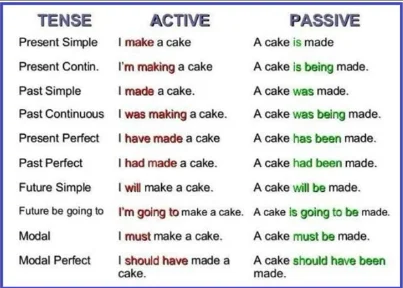
Another way to replace “I” and other personal pronouns in an essay is to use passive voice. This is achieved by transforming an active verb passive.
Though this is the case, the strategy is often difficult, and it may create sentence structures that are not acceptable in formal writing and language.
The sentences in which “I” can be successfully changed using this strategy is when an active verb describing an object is transformed into its passive form.
3. Using a Third-Person Perspective
This is a very important and applicable strategy when replacing “I” in an essay. This is where you avoid using first-person and second-person perspectives.
When referring to the subject matter, refer directly to them using the third person. For example, if you were to write, “I think regular exercise is good for mind and body”, you can replace it with “Regular exercise is good for mind and body”.
4. Use of Objective Language
Objective language is lost when a person uses informal expressions like colloquialisms, slang, contractions, and clichés. It is the reason why we discourage the use of contractions in essay writing so that you can keep things formal.
While informal language can be applicable in casual writing and speeches, it is not acceptable when writing essays. This is because you will be tempted to use a first-person perspective to convey your message.
5. Being Specific and using Strong Verbs and Adjectives
In most cases, essays that have been written using a lot of personal pronouns tend to be imprecise. When you want to avoid using “I” in your essay, try to be exact and straight to the point.
Personal pronouns tend to convey a subjective message, and it is up to the writer to explain their perspectives through writing.
Here, a writer will use a lot of “I think…” or “I believe…” to express their opinion. By doing so, the writer will end up wasting a lot of time explaining a concept.
Instead of doing that, it is best to look for appropriate verbs and adjectives to explain the points. Also, use objective language. Refer to the suggestions given by credible evidence instead of basing your arguments on what you think.
Get an essay written by a Team
Our team avoids plagiarism and ensures checks to guarantee a quality and ORIGINAL paper
Words to use Instead of Personal Pronouns like “You” and “I”
As noted, it is important to avoid using personal pronouns such as “You” and “I” when writing an essay.
By eliminating them or finding alternatives to them, your essay will be formal and objective. You can decide to eliminate them in a sentence.

For example, you could be having a sentence like “I think the author makes a valid point concerning capitalism.”
In this example, you can eliminate the personal language and write, “The author makes a valid point concerning capitalism.”
The second sentence goes straight to the point and is objective.
Other words to use instead of personal pronouns, like “You” and “I,” can be created when personal judgment words are avoided.
Instead, it is best to replace those words with those that refer to the evidence.
Examples of Ways to Replace Personal Pronouns
Below are examples of how personal judgment words can be replaced by words referring to the evidence.
- I feel – In light of the evidence
- From I think – According to the findings
- I agree – It is evident from the data that
- I am convinced – Considering the results
- You can see that – From the results, it is evident that
Using the third-person or “it” constructions can be used to replace personal pronouns like “You” and “I.” Such words also help to reduce the word count of your essay and make it short and precise.
For example, if you write “I conclude that, “replace those words with “it could be concluded that. ” Here, “it” constructions are helping replace personal pronouns to make the sentence more objective and precise.
To be more specific, words to replace personal pronouns like “I” include “one,” the viewer,” “the author,” “the reader,” “readers,” or something similar.
However, avoid overusing those words because your essay will seem stiff and awkward. For example, if you write, “I can perceive the plot’s confusion,” you can replace “I” by writing, “Readers can perceive the plot’s confusion.”
Words that can be used instead of personal pronouns like “You” include “one,” “the viewer,” reader,” “readers,” or any other similar phrases. It is similar to words that replace first-person pronouns.
For example, if you write “you can see that the poet’s tone is serious and urgent,” you can replace “You” by writing “readers/one can see that the poet’s tone is serious and urgent.”
Words to use Instead of “My” in an Essay
Since “My” demonstrates the possessiveness of something, in this case, the contents or thoughts within an essay, it makes the writing subjective. According to experts, writing should take an objective language . To do this, it is important to replace it.

You can replace the word “My” with “the”. For example, if you write, “My final thoughts concerning the issue are”, you can write, “The final thoughts concerning the issues are”.
In this case, the article “The” makes the sentence formal and objective.
Another method is eliminating the word “My” from the sentence to make it more objective and straight to the point.
In the same example above, if you write “My final thoughts concerning the issue are”, you can write “Final thoughts concerning the issue are”.
The major difference here is that the word “my” in the first example makes it subjective, and eliminating it from the sentence makes it sound formal and objective.
Final Advice
Therefore, when writing an essay, it is important to avoid personal pronouns like “You”, “I,” and “My.” Not all papers use third-person language. Different types of essays are formatted differently, a 5-paragraph essay is different from a 4-page paper , but all use third-person tones.
This is because an essay should be written in formal language, and using personal pronouns makes it appear and sound informal. Therefore, writing an essay without using ‘I’ is good.
Formal language makes your essay sound objective and precise. However, do not remove the first-person language when writing personal experiences in an essay or a paper. This is because it is acceptable and formal that way.
Order an Excellent Essay today!
Let us help you get that A in your next assignment. Place your order today, and you will enjoy the benefits.

With over 10 years in academia and academic assistance, Alicia Smart is the epitome of excellence in the writing industry. She is our managing editor and is in charge of the writing operations at Grade Bees.
Related posts

Overcoming the feeling and fear of writing essays
Overcoming the Feeling and Fear of Writing Essays

Spaces between Paragraphs in an Essay
How Many Spaces between Paragraphs in an Essay

Double Space an Essay
Should You Double Space an Essay: When and When Not To

Want to create or adapt books like this? Learn more about how Pressbooks supports open publishing practices.
32 “This I Believe” Essay
The history of ‘this i believe’.
by Tanya Matthews
This I Believe is an exciting media project that invites individuals from all walks of life to write about and discuss the core beliefs that guide their daily lives. They share these statements in weekly broadcasts on NPR’s Morning Edition and All Things Considered .
The series is based on the 1950’s radio program This I Believe , hosted by acclaimed journalist Edward R. Murrow. Each day, some 39-million Americans gathered by their radios to hear compelling essays from the likes of Eleanor Roosevelt, Jackie Robinson, Helen Keller and Harry Truman as well as corporate leaders, cab drivers, scientists and secretaries — anyone able to distill into a few minutes the guiding principles by which they lived. Their words brought comfort and inspiration to a country worried about the Cold War, McCarthyism and racial division.
Eventually, the radio series became a cultural phenomenon. Eighty-five leading newspapers printed a weekly column based on This I Believe . A collection of essays published in 1952 sold 300,000 copies — second only to the Bible that year. The series was translated and broadcast around the globe on the Voice of America. A book of essays translated into Arabic sold 30,000 copies in just three days.
[The NPR series This I Believe can be read and heard here . In addition, the website and organization This I Believe houses thousands of essays written by famous people, such as the ones mentioned above, and everyday people like you and me.]
As a college student in 2020, you are faced with turbulent politics, socioeconomic issues, and ethical dilemmas that will challenge you to take a stand and contribute to the local, national, and global conversation around you. The purpose of this writing task is not to persuade you to agree on the same beliefs. Rather, it is to encourage you to begin the much more difficult task of developing respect for beliefs different from your own. Fifty years ago, Edward R. Murrow’s project struck such a chord with millions of Americans. It can do so again today…with you.
Video Resources for Generating Ideas
Dan gediman on writing a “this i believe essay”.
Read Cecelia Munoz’s essay “Getting Angry Can Be a Good Thing” referred to in the previous video here .
“This I Believe” Essay with Animation
“This I Believe” Essay Ideas
Prewriting Activity
1) analyze others’ statements.
Consider the following statements, written in response to the question What Have You Learned About Life? Highlight any sentences that resonate with you. Talk about them with a partner or group, explaining why. 1. I’ve learned that when I wave to people in the country, they stop what they are doing and wave back. – Age 9 2. I’ve learned that if you want to cheer yourself up, you should try cheering someone else up. – Age 14 3. I’ve learned that although it’s hard to admit it, I’m secretly glad my parents are strict with me. – Age 15 4. I’ve learned that if someone says something unkind about me, I must live so that no one will believe it. – Age 39 5. I’ve learned that there are people who love you dearly but just don’t know how to show it. – Age 42 6. I’ve learned that you can make someone’s day by simply sending them a little note. – Age 44 7. I’ve learned that the greater a person’s sense of guilt, the greater his or her need to cast blame on others. – Age 46 8. I’ve learned that no matter what happens, or how bad it seems today, life does go on, and it will be better tomorrow. – Age 48 9. I’ve learned that regardless of your relationship with your parents, you miss them terribly after they die. – Age 53 10. I’ve learned that making a living is not the same thing as making a life. – Age 58 11. I’ve learned that life sometimes gives you a second chance. – Age 62 12. I’ve learned that whenever I decide something with kindness, I usually make the right decision. – Age 66 13. I’ve learned that it pays to believe in miracles. And to tell the truth, I’ve seen several. – Age 75 14. I’ve learned that even when I have pains, I don’t have to be one. – Age 82 15. I’ve learned that every day you should reach out and touch someone. People love that human touch—holding hands, a warm hug, or just a friendly pat on the back. – Age 85 16. I’ve learned that I still have a lot to learn. – Age 92
2) Compose Your Own Statement
Write down a sentence that expresses what YOU have learned about life. Maybe it is similar to one of the statements above; maybe it’s completely different. Whatever it is, write it down.
3) Freewrit e
Now free-write about your sentence. Include at least two examples / experiences that you have had that support why you think this way.
Personal Statement/Philosophy: ______________________________________________________________________________________________________________________________________________________ Why do you believe in this statement? ______________________________________________________________________________________________________________________________________________________ Name two experiences that you had that would support the statement: _______________________________________________________________________________________________________________________________________________________________________________________________________________________________________________________________________________________________________________________________________________________________________________________ What does this say about yourself or your personality? _________________________________________________________________________________________________________________________________________________________________________________________________________________________________ After your life experience, how have you come to the conclusion that this should be your statement? How have your beliefs changed, if at all? ____________________________________________________________________________________________________________________________________________________________________________________________________________________________________________________________________________________________________________ How has the event effected your relationship with a person, place, or object? _________________________________________________________________________________________________________________________________________________________________________________________________________________________________ How does your statement apply to you today? (How you view yourself & society) ______________________________________________________________________________________________________________________________________________________
SAMPLE STUDENT ESSAYS
Sample #1: america’s beauty is in its diversity.
written by Alaa El-Saad, high school student, as heard on NPR’s Tell Me More (2009)
America is built on the idea of freedom, and there is no exception for Muslim women. I believe in the freedom of religion and speech. But mostly, I believe it’s OK to be different, and to stand up for who and what you are. So I believe in wearing the hijab.
The hijab is a religious head covering, like a scarf. I am Muslim and keeping my head covered is a sign of maturity and respect toward my religion and to Allah’s will. To be honest, I also like to wear it to be different. I don’t usually like to do what everyone else is doing. I want to be an individual, not just part of the crowd. But when I first wore it, I was also afraid of the reaction that I’d get at school.
I decided on my own that sixth grade was the time I should start wearing the hijab. I was scared about what the kids would say or even do to me. I thought they might make fun of me, or even be scared of me and pull off my headscarf. Kids at that age usually like to be all the same, and there’s little or no acceptance for being different.
On the first day of school, I put all those negative thoughts behind my back and walked in with my head held high. I was holding my breath a little, but inside I was also proud to be a Muslim, proud to be wearing the hijab, proud to be different.
I was wrong about everything I thought the kids would say or even do to me. I actually met a lot of people because of wearing my head covering. Most of the kids would come and ask me questions—respectfully—about the hijab, and why I wore it.
I did hear some kid was making fun of me, but there was one girl—she wasn’t even in my class, we never really talked much—and she stood up for me, and I wasn’t even there! I made a lot of new friends that year, friends that I still have until this very day, five years later.
Yes, I’m different, but everyone is different here, in one way or another. This is the beauty of America. I believe in what America is built on: all different religions, races and beliefs. Different everything.
Sample #2: The Essentials to Happiness
written by Alexxandra Schuman, high school student, as heard on The Bob Edwards Show (2013)
As a child, I was generally happy; singing and dancing to my favorite songs; smiling and laughing with my friends and family. But as far back as second grade, I noticed a “darkness,” about me. I didn’t enjoy engaging in many things. I didn’t relate to my peers in elementary school because they appeared so happy, and I didn’t have that ability to achieve happiness so easily.
In middle school things in my life began to get even worse. I began withdrawing from everything I once enjoyed; swimming, tennis, family. I hated going to sleep knowing I had to wake up to another day. I was always tired. Everything was horrible. Finally, midway through eighth grade, I was told I had a chemical imbalance; diagnosed with clinical depression and put on medication. It took months for me to feel the effects of the medication.
When I began to feel happy again, is when I realized that I had to take the responsibility for getting better myself, rather than relying on medication and therapy alone. Aristotle said, “To live happily is an inward power of the soul,” and I believe that this quote describes what I had to do to achieve happiness. Happiness is a journey. Everyone seems to need different things to be happy. But I believe people are blinded from what truly makes one happy.
Growing up, we’re encouraged to be successful in life; but how is success defined? Success and happiness are imagined now as having a lot of money. It is so untrue. Recently I went to Costa Rica and visited the small town of El Roble. I spent the day with a nine-year old girl named Marilyn. She took me to her house to meet her parents. It was obvious that they were not rich; living in a small house with seven children. The house was cluttered but full of life. Those who have decided that success and happiness comes from having money and a big house would be appalled at how utterly happy this family from El Roble is. People say that seeing things like that make you appreciate what you have, but for me, it made me envy them for being so happy without all the things I have.
“The essentials to happiness are something to love, something to do, and something to hope for,” a quote from William Blake sums up what I believe people need to realize to be truly happy in life. People need love; I feel they need their family and their friends more than anything in the world. People need work to do, something to make them feel they are making a difference in the world. People need to know that more good is to come in the future, so they continue to live for “now” instead of constantly worrying about the bad that could come. And most importantly people need to know that happiness is not something that happens overnight. Love and hope is happiness.
Sample #3: Find a Good Frog
written by Delia Motavalli, high school student, as heard on The Bob Edwards Show (2013)
I believe in finding a good frog. It seems that all throughout childhood, we are taught to look for a happily ever after. “And they all lived happily ever after”; isn’t that the conclusion to many children’s films? When I was a kid I always thought of that as magical; but now really it just seems unrealistic. And it teaches us that what we want is a fairytale like they have in the storybooks. We all want to be Cinderella who gets swept off her feet by the hot prince; we want to live in the royal castle, right? But I don’t think that’s necessarily a good thing for us to seek. Now I’m not saying I believe in being pessimistic, but I do believe in being realistic; it’s something I got from my mom.
My mother and I always have our best conversations in the rain. We sit in the car, neither of us wanting to brave the rain to get to the house. So we sit. We watch droplets race down the windshield, listen to the rain strike the roof of her little blue Honda, and feel the heater on full-blast rushing at our feet (just the way we like it). I don’t know why, but sitting in the car, we always talk more than normal. There was one rainy day when my mom told me something that is going to stick with me forever. Earlier that day she and my dad had been arguing about something; I can’t remember what. So she said, “Don’t spend your life looking for Prince Charming. Instead, find yourself a really good frog.”
At the time, I found this thought really disheartening. Who wants to think that you’ll never find Prince Charming? You’ll never get to be Cinderella? Another thought that struck my mind: if my mom says there’s no Prince Charming, then what’s my dad? A frog? I asked her, and she replied with, “Of course! If he were Prince Charming, he wouldn’t snore, would be able to cook, and we would never argue. But you know what? He’s a damn good frog.” Of course, being young, I didn’t think of the meaning behind what she was saying. I was too busy thinking of it literally, visualizing my mom as a princess and my dad in frog form.
But a few years later, I understand the value of my mom’s words. You can’t expect everything to be perfect. Let’s be completely honest; if you wait your whole life for your prince with flowing hair, statuesque features, and a white horse, you’re going to be lonely. I think that the point of finding a good frog is you accept something that’s great, flaws and all. It’s so easy to be picky. You can find the one tiny thing that’s wrong, and that one tiny thing is what you can’t get your mind off of. But in life, we can’t afford to wait years in vain for perfection. So I think that a good frog, an amazing frog, the best frog you can find is what we’re really looking for in this world. Don’t laze through life waiting for a happily ever after, because I don’t think you’ll be very happy with the outcome.
Examples from the ‘This I Believe’ Website
Be Cool to the Pizza Dude by Sarah Adams
They Lived Their Faith by Charles Henry Parrish
Returning to What’s Natural by Amelia Baxter-Stoltzfus
The Birthright of Human Dignity by Will Thomas
Remembering All The Boys by Elvia Bautista
I Am Still The Greatest by Muhammad Ali
A Goal Of Service To Humankind by Anthony Fauci
My Life Is Better by Abraham
Give Me a Waffle by Brenda
The Little Things by Sophie Crossley
You can also browse thousands more This I Believe essays by theme .
Prefer to Listen to Get Inspiration?
Check out This I Believe’s Podcast Series
4) Drafting
Assignment guidelines + suggestions and tips for drafting.
1. While the examples you’ve been given can serve as a model, it is essential that each of you write about a personal belief or philosophy that you feel strongly about. 2. Tell a story. Personal experiences are the corner stone of a good essay. Your story doesn’t have to be a heart breaker or even a major event, but it must be something that has affected how you think, feel, and act. List your personal experiences that you intend to use as evidence below: 3. Be concise. Avoid repetition. This essay should be between 500 – 650 words. When read aloud, it should take roughly four minutes. 4. Name your belief. It is essential that you can name your belief in a sentence or two. Focus on one belief only. This is your thesis. Write it here: 5. Be positive. Avoid preaching or persuading. You aren’t trying to change the way others think or act. Write about what you believe, not what you don’t believe. 6. Use the first person. Speak for yourself. Avoid using we or you. 7. Let your voice shine. Use language that sounds like you. Read it aloud as your revise. Keep making changes until your essay sounds like you and captures the essence of your belief.
5) Peer Review
Once you have written your first draft, arrange for your essay to be edited by a peer, using the following Peer-Editing Checklist: Writer’s Name: ________________________________________________ Peer Editor’s Name: ________________________________________________ Use your PENCIL or PEN (NOT red or green) to make corrections. Remember, this essay is a work in progress. You are not done writing! Look for ways to improve what you’ve already written. Tick each step if it has been completed. _____ 1. Read the paper backwards, one sentence at a time. Check for spelling errors. Use a dictionary, a friend, or a spell checker to find the correct spelling. _____ 2. Check for capitalized proper nouns and the first word of each sentence. _____ 3. Skip a line between each paragraph. _____ 4. Every sentence should have end punctuation. _____ 5. Check commas. Are they only used for compound sentences, a list of items, an introductory word or phrase, direct address, setting off interruptions, separating adjectives, or in dates? Do you need to add commas? Make sure you do not have commas separating complete sentences (i.e. comma splice errors that create run-on sentences). _____ 6. Apostrophes are used only for contractions and to show ownership. _____ 7. The use of more complex punctuation (dashes, hyphens, semi-colons, parentheses, etc.) is done correctly. _____ 8. Have you used commonly mixed pairs of words correctly? Check these: they’re/their/there, your/you’re, it’s/its, a/an, to/too/two, are/our/hour, and others. _____ 9. Read the paper backwards one sentence at a time. Check for sentence fragments and run-ons and correct them. _____ 10. Did you stay in present tense (such as is, am, do, take, know, etc.) or past tense (such as was, were, did, took, knew, etc.) throughout the entire essay? _____ 11. Did you stay in first person (I, me, my, we, us, our) or third person (he, him, she, her, they, them, their) throughout the entire essay? _____ 12. Was there adequate use of specific details and sensory details? Were the details clear and relevant to the statement? _____ 13. Is the overall purpose/philosophy clear? _____ 14. Does the conclusion make you go, “Wow!” “Cool!” “I never thought about it that way,” or any other similar reaction? Other suggestions for the overall content of the piece: ____________________________________________________________________________________________________________________________________________________________________________________________________________________________________________________________________________________________________________
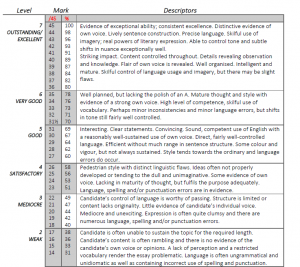
This I Believe by Tanya Matthews is licensed by CC-BY-SA
“This I Believe” Essay Copyright © 2020 by Liza Long; Amy Minervini; and Joel Gladd is licensed under a Creative Commons Attribution-ShareAlike 4.0 International License , except where otherwise noted.
Share This Book
- Entertainment
I Made a Show About Talking to White Nationalists. Then I Talked to My Audience

F or promotional purposes, I am often asked to sum up Just For Us . Sometimes, I get very technical and say it’s a comedy-theater hybrid, or a solo show about assimilation or something high-minded, but what usually happens is that the interviewer stares at me until I give them what they want. Which is this:
Just For Us , if you must know, is a show about a guy who attends a meeting of White Nationalists in Queens. The thing that makes this hooky, presumably, is the fact that that guy (me, I’m the guy) was raised as an Orthodox Jew.
Eventually, I’m found out. The resultant story, as crafted for the stage with a few related comedic tangents, wound its way through the Anglophone live comedy world over the past six years, making some fun stops— Broadway , Montreal, Australia—before it airs on HBO April 6.
And the thing I like most about my corner of the pixelated comedy landscape, my own stall now set out at the farmers market of online streaming, is the tens of thousands of people who have come to see it live; stopped and visited and left their fingerprints on my countertop. In the comet’s tail behind the show there have been innumerable conversations afterwards in the lobby, bar, or the middle of the sidewalk outside the venue. Anyone with the patience and wherewithal to ask a question, has.
Not all the conversations have been good or illuminating. There are a lot of watery compliments, or Jewish geography (over the five years I attended a Jewish summer camp , I seem to have overlapped with literally everyone’s cousin). A nice man in Detroit complained that I don’t offer any answers, only more questions. Fair. The queries aimed at me mostly revolve around the White Nationalists in the room that night back in 2018. Am I still in touch? I am not. Would I do it again? Yes. Have any of them seen the show? No idea. I thought I saw one of them in Union Square in 2022, but going up to a stranger to ask, “Hey, do I know you from a meeting of White Nationalists?” struck me as a bad move.
Because of the nature of live performance, and the way we tell stories, some of those conversations, besides being a more explicit window into what people respond to, have found their way into the show itself—which is wild. The show is different from the show it was six months ago, a year ago, six years ago. I didn't even present as Jewish in the original draft of it. To offer work that is a living thing, responsive to the world around it, is a unique experience. It’s a bit like if you were watching a movie and DiCaprio got to look directly into camera and say, “People get really sad here, when we hit the iceberg .” Live theater! It’s the best.
And in the post-show conversations that light me up the most, I find my tribe: people animated by curiosity or a unique approach to discourse. They’re interested in the craft of telling a story, or they talk about a time where they connected with someone very different from them, or offer an anecdote about wandering into a room where they did not belong. After a show in Wales, out of nowhere, a woman in her seventies told me she liked “that I knew enough to listen” in that room. When I told her that the opinions at this meeting of White Nationalists were pretty offensive, regressive, etc., she said to me, genuinely baffled, “What does that have to do with listening?”
Read more: How to Have More Meaningful Conversations
I now see that extant desire to listen and be heard, to be seen and understood, in so much. I catch glimpses of it in our newspapers, in courtroom testimonies, on Love is Blind .
I read once that there is nothing more romantic than being seen, and the average American is, in my opinion, looking for romance. I’m not naive enough to think that we can head for a kumbaya moment that sees MAGA conservatives locked in tear-soaked embrace with Joy Behar , but I’m encouraged by that desire for understanding—especially from those who are different from us. I think it accounts for a huge amount of the resonance that Just For Us has had.
A few weeks ago, after a show in Atlanta, someone asked me, framed through their anger at another’s position on the current conflict in Gaza , “What should be the limits of our empathy?” I told them that I don’t know, but I think the more you can extend, the more of the opposing perspective you can come to grips with, the higher your chances are of reaching something productive. It’s an answer I don’t know that I would’ve given six years ago. I’m resistant to “what I’ve learned” stuff from comedians and solo show artists—it’s very pat—but I can say what’s changed for me. Which is that I’ve found much more productivity when I can remove my self-righteousness from my arguments. I’ve found a surprising appetite for grace in the average person. And, I’ve found so much more comfort in asking questions than offering answers. Sorry, guy from Detroit.
Alex Edelman is a comedian and writer based in New York City. His debut comedy special Alex Edelman: Just for Us premieres on Saturday, April 6 on HBO and streaming on Max.
More Must-Reads From TIME
- Exclusive: Google Workers Revolt Over $1.2 Billion Contract With Israel
- Jane Fonda Champions Climate Action for Every Generation
- Stop Looking for Your Forever Home
- The Sympathizer Counters 50 Years of Hollywood Vietnam War Narratives
- The Bliss of Seeing the Eclipse From Cleveland
- Hormonal Birth Control Doesn’t Deserve Its Bad Reputation
- The Best TV Shows to Watch on Peacock
- Want Weekly Recs on What to Watch, Read, and More? Sign Up for Worth Your Time
Contact us at [email protected]
- Share full article
For more audio journalism and storytelling, download New York Times Audio , a new iOS app available for news subscribers.

- April 14, 2024 The Sunday Read: ‘What I Saw Working at The National Enquirer During Donald Trump’s Rise’
- April 12, 2024 • 34:23 How One Family Lost $900,000 in a Timeshare Scam
- April 11, 2024 • 28:39 The Staggering Success of Trump’s Trial Delay Tactics
- April 10, 2024 • 22:49 Trump’s Abortion Dilemma
- April 9, 2024 • 30:48 How Tesla Planted the Seeds for Its Own Potential Downfall
- April 8, 2024 • 30:28 The Eclipse Chaser
- April 7, 2024 The Sunday Read: ‘What Deathbed Visions Teach Us About Living’
- April 5, 2024 • 29:11 An Engineering Experiment to Cool the Earth
- April 4, 2024 • 32:37 Israel’s Deadly Airstrike on the World Central Kitchen
- April 3, 2024 • 27:42 The Accidental Tax Cutter in Chief
- April 2, 2024 • 29:32 Kids Are Missing School at an Alarming Rate
- April 1, 2024 • 36:14 Ronna McDaniel, TV News and the Trump Problem
How One Family Lost $900,000 in a Timeshare Scam
A mexican drug cartel is targeting seniors and their timeshares..
Hosted by Katrin Bennhold
Produced by Asthaa Chaturvedi and Will Reid
With Clare Toeniskoetter and Lynsea Garrison
Edited by Brendan Klinkenberg and Michael Benoist
Original music by Marion Lozano , Rowan Niemisto , Dan Powell , Pat McCusker and Will Reid
Engineered by Chris Wood
Listen and follow The Daily Apple Podcasts | Spotify | Amazon Music
Warning: this episode contains descriptions of violence.
A massive scam targeting older Americans who own timeshare properties has resulted in hundreds of millions of dollars sent to Mexico.
Maria Abi-Habib, an investigative correspondent for The Times, tells the story of a victim who lost everything, and of the criminal group making the scam calls — Jalisco New Generation, one of Mexico’s most violent cartels.
On today’s episode

Maria Abi-Habib , an investigative correspondent for The New York Times based in Mexico City.

Background reading
How a brutal Mexican drug cartel came to target seniors and their timeshares .
There are a lot of ways to listen to The Daily. Here’s how.
We aim to make transcripts available the next workday after an episode’s publication. You can find them at the top of the page.
The Daily is made by Rachel Quester, Lynsea Garrison, Clare Toeniskoetter, Paige Cowett, Michael Simon Johnson, Brad Fisher, Chris Wood, Jessica Cheung, Stella Tan, Alexandra Leigh Young, Lisa Chow, Eric Krupke, Marc Georges, Luke Vander Ploeg, M.J. Davis Lin, Dan Powell, Sydney Harper, Mike Benoist, Liz O. Baylen, Asthaa Chaturvedi, Rachelle Bonja, Diana Nguyen, Marion Lozano, Corey Schreppel, Rob Szypko, Elisheba Ittoop, Mooj Zadie, Patricia Willens, Rowan Niemisto, Jody Becker, Rikki Novetsky, John Ketchum, Nina Feldman, Will Reid, Carlos Prieto, Ben Calhoun, Susan Lee, Lexie Diao, Mary Wilson, Alex Stern, Dan Farrell, Sophia Lanman, Shannon Lin, Diane Wong, Devon Taylor, Alyssa Moxley, Summer Thomad, Olivia Natt, Daniel Ramirez and Brendan Klinkenberg.
Our theme music is by Jim Brunberg and Ben Landsverk of Wonderly. Special thanks to Sam Dolnick, Paula Szuchman, Lisa Tobin, Larissa Anderson, Julia Simon, Sofia Milan, Mahima Chablani, Elizabeth Davis-Moorer, Jeffrey Miranda, Renan Borelli, Maddy Masiello, Isabella Anderson and Nina Lassam.
Katrin Bennhold is the Berlin bureau chief. A former Nieman fellow at Harvard University, she previously reported from London and Paris, covering a range of topics from the rise of populism to gender. More about Katrin Bennhold
Advertisement
- International edition
- Australia edition
- Europe edition

Trump’s bizarre, vindictive incoherence has to be heard in full to be believed
Excerpts from his speeches do not do justice to Trump’s smorgasbord of vendettas, non sequiturs and comparisons to famous people
Donald Trump’s speeches on the 2024 campaign trail so far have been focused on a laundry list of complaints, largely personal, and an increasingly menacing tone.
He’s on the campaign trail less these days than he was in previous cycles – and less than you’d expect from a guy with dedicated superfans who brags about the size of his crowds every chance he gets. But when he has held rallies, he speaks in dark, dehumanizing terms about migrants, promising to vanquish people crossing the border. He rails about the legal battles he faces and how they’re a sign he’s winning, actually. He tells lies and invents fictions. He calls his opponent a threat to democracy and claims this election could be the last one.
Trump’s tone, as many have noted, is decidedly more vengeful this time around, as he seeks to reclaim the White House after a bruising loss that he insists was a steal. This alone is a cause for concern, foreshadowing what the Trump presidency redux could look like. But he’s also, quite frequently, rambling and incoherent, running off on tangents that would grab headlines for their oddness should any other candidate say them.
Journalists rightly chose not to broadcast Trump’s entire speeches after 2016, believing that the free coverage helped boost the former president and spread lies unchecked. But now there’s the possibility that stories about his speeches often make his ideas appear more cogent than they are – making the case that, this time around, people should hear the full speeches to understand how Trump would govern again.
Watching a Trump speech in full better shows what it’s like inside his head: a smorgasbord of falsehoods, personal and professional vendettas, frequent comparisons to other famous people, a couple of handfuls of simple policy ideas, and a lot of non sequiturs that veer into barely intelligible stories.
Curiously, Trump tucks the most tangible policy implications in at the end. His speeches often finish with a rundown of what his second term in office could bring, in a meditation-like recitation the New York Times recently compared to a sermon. Since these policies could become reality, here’s a few of those ideas:
Instituting the death penalty for drug dealers.
Creating the “Trump Reciprocal Trade Act”: “If China or any other country makes us pay 100% or 200% tariff, which they do, we will make them pay a reciprocal tariff of 100% or 200%. In other words, you screw us and we’ll screw you.”
Indemnifying all police officers and law enforcement officials.
Rebuilding cities and taking over Washington DC, where, he said in a recent speech, there are “beautiful columns” put together “through force of will” because there were no “Caterpillar tractors” and now those columns have graffiti on them.
Issuing an executive order to cut federal funding for any school pushing critical race theory, transgender and other inappropriate racial, sexual or political content.
Moving to one-day voting with paper ballots and voter ID.
This conclusion is the most straightforward part of a Trump speech and is typically the extent of what a candidate for office would say on the campaign trail, perhaps with some personal storytelling or mild joking added in.
But it’s also often the shortest part.
Trump’s tangents aren’t new, nor is Trump’s penchant for elevating baseless ideas that most other presidential candidates wouldn’t, like his promotion of injecting bleach during the pandemic.
But in a presidential race among two old men that’s often focused on the age of the one who’s slightly older, these campaign trail antics shed light on Trump’s mental acuity, even if people tend to characterize them differently than Joe Biden’s. While Biden’s gaffes elicit serious scrutiny, as writers in the New Yorker and the New York Times recently noted, we’ve seemingly become inured to Trump’s brand of speaking, either skimming over it or giving him leeway because this has always been his shtick.
Trump, like Biden, has confused names of world leaders (but then claims it’s on purpose ). He has also stumbled and slurred his words. But beyond that, Trump’s can take a different turn. Trump has described using an “iron dome” missile defense system as “ding, ding, ding, ding, ding, ding. They’ve only got 17 seconds to figure this whole thing out. Boom. OK. Missile launch. Whoosh. Boom.”
These tangents can be part of a tirade, or they can be what one can only describe as complete nonsense.
During this week’s Wisconsin speech, which was more coherent than usual, Trump pulled out a few frequent refrains: comparing himself, incorrectly , to Al Capone, saying he was indicted more than the notorious gangster; making fun of the Georgia prosecutor Fani Willis’s first name (“It’s spelled fanny like your ass, right? Fanny. But when she became DA, she decided to add a little French, a little fancy”).

He made fun of Biden’s golfing game, miming how Biden golfs, perhaps a ding back at Biden for poking Trump about his golf game. Later, he called Biden a “lost soul” and lamented that he gets to sit at the president’s desk. “Can you imagine him sitting at the Resolute Desk? What a great desk,” Trump said.
One muddled addition in Wisconsin involved squatters’ rights, a hot topic related to immigration now: “If you have illegal aliens invading your home, we will deport you,” presumably meaning the migrant would be deported instead of the homeowner. He wanted to create a federal taskforce to end squatting, he said.
“Sounds like a little bit of a weird topic but it’s not, it’s a very bad thing,” he said.
These half-cocked remarks aren’t new; they are a feature of who Trump is and how he communicates that to the public, and that’s key to understanding how he is as a leader.
The New York Times opinion writer Jamelle Bouie described it as “something akin to the soft bigotry of low expectations”, whereby no one expected him to behave in an orderly fashion or communicate well.
Some of these bizarre asides are best seen in full, like this one about Biden at the beach in Trump’s Georgia response to the State of the Union:
“Somebody said he looks great in a bathing suit, right? And you know, when he was in the sand and he was having a hard time lifting his feet through the sand, because you know sand is heavy, they figured three solid ounces per foot, but sand is a little heavy, and he’s sitting in a bathing suit. Look, at 81, do you remember Cary Grant? How good was Cary Grant, right? I don’t think Cary Grant, he was good. I don’t know what happened to movie stars today. We used to have Cary Grant and Clark Gable and all these people. Today we have, I won’t say names, because I don’t need enemies. I don’t need enemies. I got enough enemies. But Cary Grant was, like – Michael Jackson once told me, ‘The most handsome man, Trump, in the world.’ ‘Who?’ ‘Cary Grant.’ Well, we don’t have that any more, but Cary Grant at 81 or 82, going on 100. This guy, he’s 81, going on 100. Cary Grant wouldn’t look too good in a bathing suit, either. And he was pretty good-looking, right?”
Or another Hollywood-related bop, inspired by a rant about Willis and special prosecutor Nathan Wade’s romantic relationship:
“It’s a magnificent love story, like Gone With the Wind. You know Gone With the Wind, you’re not allowed to watch it any more. You know that, right? It’s politically incorrect to watch Gone With the Wind. They have a list. What were the greatest movies ever made? Well, Gone With the Wind is usually number one or two or three. And then they have another list you’re not allowed to watch any more, Gone With the Wind. You tell me, is our country screwed up?”
He still claims to have “done more for Black people than any president other than Abraham Lincoln” and also now says he’s being persecuted more than Lincoln and Andrew Jackson:
“ All my life you’ve heard of Andrew Jackson, he was actually a great general and a very good president. They say that he was persecuted as president more than anybody else, second was Abraham Lincoln. This is just what they said. This is in the history books. They were brutal, Andrew Jackson’s wife actually died over it.”
You not only see the truly bizarre nature of Trump’s speeches when viewing them in full, but you see the sheer breadth of his menace and animus toward those who disagree with him.
His comments especially toward migrants have grown more dehumanizing. He has said they are “poisoning the blood” of the US – a nod at Great Replacement Theory, the far-right conspiracy that the left is orchestrating migration to replace white people. Trump claimed the people coming in were “prisoners, murderers, drug dealers, mental patients and terrorists, the worst they have”. He has repeatedly called migrants “animals”.

“Democrats said please don’t call them ‘animals’. I said, no, they’re not humans, they’re animals,” he said during a speech in Michigan this week.
“In some cases they’re not people, in my opinion,” he said during his March appearance in Ohio. “But I’m not allowed to say that because the radical left says that’s a terrible thing to say. “These are animals, OK, and we have to stop it,” he said.
And he has turned more authoritarian in his language, saying he would be a “dictator on day one” but then later said it would only be for a day. He’s called his political enemies “vermin”: “We pledge to you that we will root out the communists, Marxists, fascists and the radical left thugs that live like vermin within the confines of our country,” he said in New Hampshire in late 2023.
At a speech in March in Ohio about the US auto industry he claimed there would be a “bloodbath” if he lost, which some interpreted as him claiming there would be violence if he loses the election.
Trump’s campaign said later that he meant the comment to be specific to the auto industry, but now the former president has started saying Biden created a “border bloodbath” and the Republican National Committee created a website to that effect as well.
It’s tempting to find a coherent line of attack in Trump speeches to try to distill the meaning of a rambling story. And it’s sometimes hard to even figure out the full context of what he’s saying, either in text or subtext and perhaps by design, like the “bloodbath” comment or him saying there wouldn’t be another election if he doesn’t win this one.
But it’s only in seeing the full breadth of the 2024 Trump speech that one can truly understand what kind of president he could become if he won the election.
“It’s easiest to understand the threat that Trump poses to American democracy most clearly when you see it for yourself,” Susan B Glasser wrote in the New Yorker. “Small clips of his craziness can be too easily dismissed as the background noise of our times.”
If you ask Trump himself, of course, these are just examples that Trump is smart.
“The fake news will say, ‘Oh, he goes from subject to subject.’ No, you have to be very smart to do that. You got to be very smart. You know what it is? It’s called spot-checking. You’re thinking about something when you’re talking about something else, and then you get back to the original. And they go, ‘Holy shit. Did you see what he did?’ It’s called intelligence.”
- Donald Trump
- US elections 2024
- Republicans
- US politics
Most viewed
Read our research on: Gun Policy | International Conflict | Election 2024
Regions & Countries
9 facts about americans and marijuana.

The use and possession of marijuana is illegal under U.S. federal law, but about three-quarters of states have legalized the drug for medical or recreational purposes. The changing legal landscape has coincided with a decades-long rise in public support for legalization, which a majority of Americans now favor.
Here are nine facts about Americans’ views of and experiences with marijuana, based on Pew Research Center surveys and other sources.
As more states legalize marijuana, Pew Research Center looked at Americans’ opinions on legalization and how these views have changed over time.
Data comes from surveys by the Center, Gallup , and the 2022 National Survey on Drug Use and Health from the U.S. Substance Abuse and Mental Health Services Administration. Information about the jurisdictions where marijuana is legal at the state level comes from the National Organization for the Reform of Marijuana Laws .
More information about the Center surveys cited in the analysis, including the questions asked and their methodologies, can be found at the links in the text.
Around nine-in-ten Americans say marijuana should be legal for medical or recreational use, according to a January 2024 Pew Research Center survey . An overwhelming majority of U.S. adults (88%) say either that marijuana should be legal for medical use only (32%) or that it should be legal for medical and recreational use (57%). Just 11% say the drug should not be legal in any form. These views have held relatively steady over the past five years.
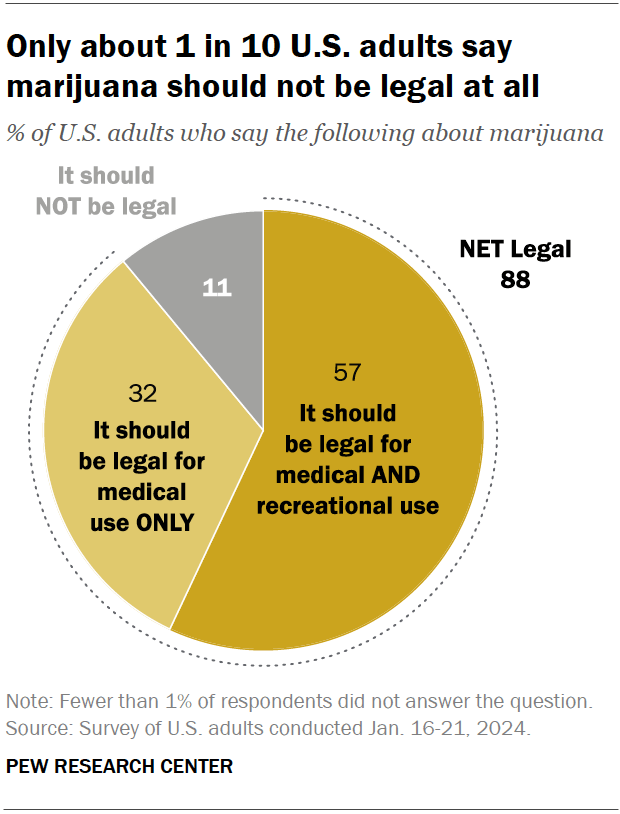
Views on marijuana legalization differ widely by age, political party, and race and ethnicity, the January survey shows.

While small shares across demographic groups say marijuana should not be legal at all, those least likely to favor it for both medical and recreational use include:
- Older adults: 31% of adults ages 75 and older support marijuana legalization for medical and recreational purposes, compared with half of those ages 65 to 74, the next youngest age category. By contrast, 71% of adults under 30 support legalization for both uses.
- Republicans and GOP-leaning independents: 42% of Republicans favor legalizing marijuana for both uses, compared with 72% of Democrats and Democratic leaners. Ideological differences exist as well: Within both parties, those who are more conservative are less likely to support legalization.
- Hispanic and Asian Americans: 45% in each group support legalizing the drug for medical and recreational use. Larger shares of Black (65%) and White (59%) adults hold this view.
Support for marijuana legalization has increased dramatically over the last two decades. In addition to asking specifically about medical and recreational use of the drug, both the Center and Gallup have asked Americans about legalizing marijuana use in a general way. Gallup asked this question most recently, in 2023. That year, 70% of adults expressed support for legalization, more than double the share who said they favored it in 2000.
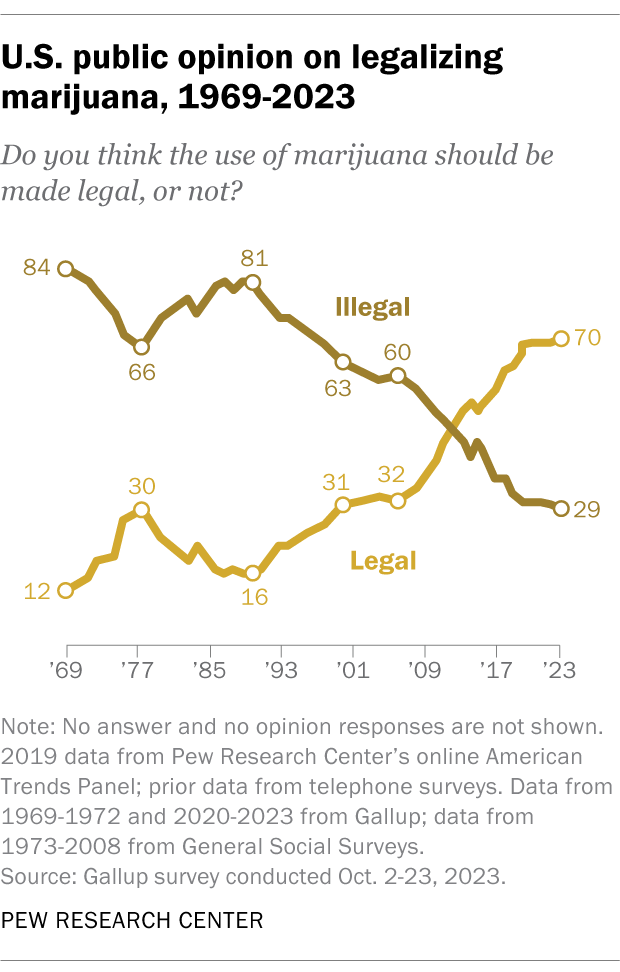
Half of U.S. adults (50.3%) say they have ever used marijuana, according to the 2022 National Survey on Drug Use and Health . That is a smaller share than the 84.1% who say they have ever consumed alcohol and the 64.8% who have ever used tobacco products or vaped nicotine.
While many Americans say they have used marijuana in their lifetime, far fewer are current users, according to the same survey. In 2022, 23.0% of adults said they had used the drug in the past year, while 15.9% said they had used it in the past month.
While many Americans say legalizing recreational marijuana has economic and criminal justice benefits, views on these and other impacts vary, the Center’s January survey shows.
- Economic benefits: About half of adults (52%) say that legalizing recreational marijuana is good for local economies, while 17% say it is bad. Another 29% say it has no impact.
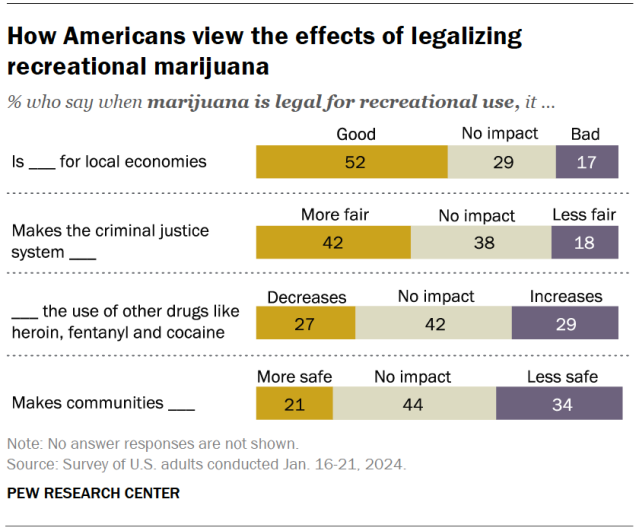
- Criminal justice system fairness: 42% of Americans say legalizing marijuana for recreational use makes the criminal justice system fairer, compared with 18% who say it makes the system less fair. About four-in-ten (38%) say it has no impact.
- Use of other drugs: 27% say this policy decreases the use of other drugs like heroin, fentanyl and cocaine, and 29% say it increases it. But the largest share (42%) say it has no effect on other drug use.
- Community safety: 21% say recreational legalization makes communities safer and 34% say it makes them less safe. Another 44% say it doesn’t impact safety.
Democrats and adults under 50 are more likely than Republicans and those in older age groups to say legalizing marijuana has positive impacts in each of these areas.
Most Americans support easing penalties for people with marijuana convictions, an October 2021 Center survey found . Two-thirds of adults say they favor releasing people from prison who are being held for marijuana-related offenses only, including 41% who strongly favor this. And 61% support removing or expunging marijuana-related offenses from people’s criminal records.
Younger adults, Democrats and Black Americans are especially likely to support these changes. For instance, 74% of Black adults favor releasing people from prison who are being held only for marijuana-related offenses, and just as many favor removing or expunging marijuana-related offenses from criminal records.
Twenty-four states and the District of Columbia have legalized small amounts of marijuana for both medical and recreational use as of March 2024, according to the National Organization for the Reform of Marijuana Laws (NORML), an advocacy group that tracks state-level legislation on the issue. Another 14 states have legalized the drug for medical use only.
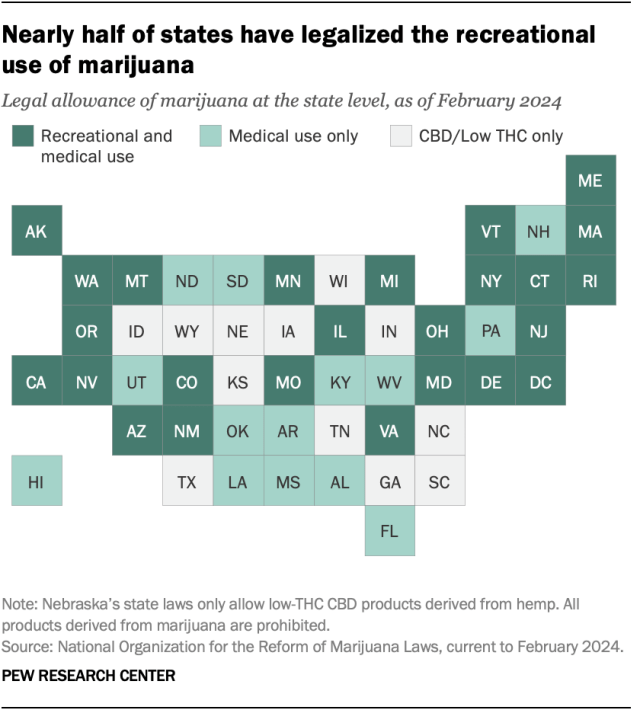
Of the remaining 12 states, all allow limited access to products such as CBD oil that contain little to no THC – the main psychoactive substance in cannabis. And 26 states overall have at least partially decriminalized recreational marijuana use , as has the District of Columbia.
In addition to 24 states and D.C., the U.S. Virgin Islands , Guam and the Northern Mariana Islands have legalized marijuana for medical and recreational use.
More than half of Americans (54%) live in a state where both recreational and medical marijuana are legal, and 74% live in a state where it’s legal either for both purposes or medical use only, according to a February Center analysis of data from the Census Bureau and other outside sources. This analysis looked at state-level legislation in all 50 states and the District of Columbia.
In 2012, Colorado and Washington became the first states to pass legislation legalizing recreational marijuana.
About eight-in-ten Americans (79%) live in a county with at least one cannabis dispensary, according to the February analysis. There are nearly 15,000 marijuana dispensaries nationwide, and 76% are in states (including D.C.) where recreational use is legal. Another 23% are in medical marijuana-only states, and 1% are in states that have made legal allowances for low-percentage THC or CBD-only products.
The states with the largest number of dispensaries include California, Oklahoma, Florida, Colorado and Michigan.
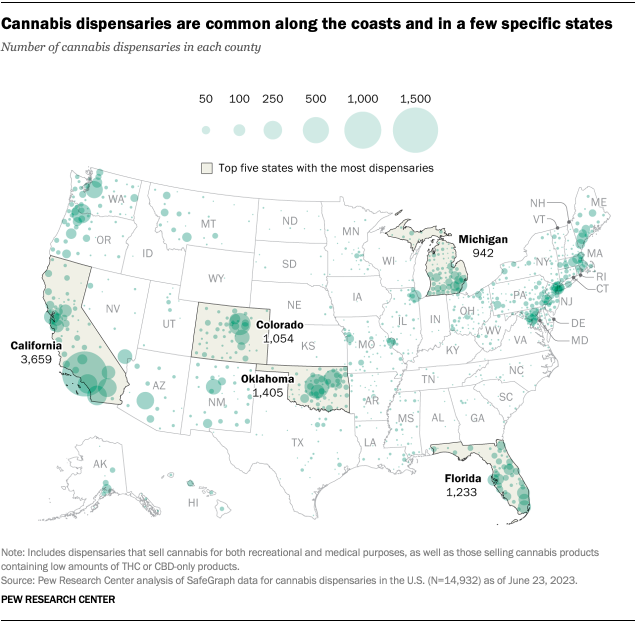
Note: This is an update of a post originally published April 26, 2021, and updated April 13, 2023.

Sign up for our weekly newsletter
Fresh data delivered Saturday mornings
Americans overwhelmingly say marijuana should be legal for medical or recreational use
Religious americans are less likely to endorse legal marijuana for recreational use, four-in-ten u.s. drug arrests in 2018 were for marijuana offenses – mostly possession, two-thirds of americans support marijuana legalization, most popular.
About Pew Research Center Pew Research Center is a nonpartisan fact tank that informs the public about the issues, attitudes and trends shaping the world. It conducts public opinion polling, demographic research, media content analysis and other empirical social science research. Pew Research Center does not take policy positions. It is a subsidiary of The Pew Charitable Trusts .
share this!
April 8, 2024
This article has been reviewed according to Science X's editorial process and policies . Editors have highlighted the following attributes while ensuring the content's credibility:
fact-checked
reputable news agency
During a solar eclipse, some Indigenous groups believe it's not just your eyes that need protecting
by Valerie Russ, The Philadelphia Inquirer

The last time a total solar eclipse cast its shadows across the United States in August 2017, Jenée Chizick-Agüero, the founder and publisher of Motivos magazine, was pregnant with her son.
There was a viewing party in the parking lot outside Esperanza, a nonprofit on North 5th Street, and Chizick-Agüero was determined to go. In a total solar eclipse , the moon aligns up between the earth and the sun, temporarily blocking the sun's light and turning day into nearly night, in some places.
But first, the Fishtown resident had to negotiate with some strong cultural beliefs of her husband, Jorge Arturo Agüero, and his family, who are Costa Rican.
Both Jorge Agüero and his mother, Nereida Esquivel, who still lives in Costa Rica, were worried about Chizick-Agüero catching a glimpse of the eclipse while pregnant.
"His mom covered herself in black clothing during the 1991 eclipse, when [she] was pregnant with his younger sister," she said.
Her mother-in-law told her she had worn all black to guard against her baby being born with a birthmark.
By the 2017 eclipse, Chizick-Agüero, who loved science, was all set to go out to watch it. Her own child would be born one month later. "But my husband said, 'No, you can't do this. It might jeopardize our son,'" Chizick-Agüero recalled.
That's when Chizick-Agüero learned that people in Costa Rica, especially the areas where Indigenous beliefs are strong, have customs about what pregnant women should do during a solar eclipse.
The 2017 eclipse was the first to be seen in a broad sweep across the country, from the Pacific to the Atlantic, in nearly a century, since June 1918. There had been an eclipse in February 1979, but that one was only visible in the Pacific Northwest of the U.S. through Canada.
So this was a major eclipse. Chizick-Agüero, born in the United States, had not grown up with myths about solar eclipses. She was adamant about watching it.
Her compromise was to attend the viewing party with a friend. In addition to wearing protective eye wear, Chizick-Agüero tied a black sweatshirt around her belly to honor her husband's beliefs. Their son was born a month later, without any birthmarks.
Remembering Maya eclipse myths
Diliana Cho Solis, a bilingual counseling assistant for the Philadelphia School District, lives in South Philly.
But she was born in Honduras, the daughter of a Chinese father and a Nicaraguan mother. Cho Solis said the eclipse myths in Honduras stem from Mayan legends. One belief is that crops will go bad because the moon "has taken the energy away from the sun."
There's also a belief that pregnant women should wear a red ribbon or anything red. "And if a child is born [during] an eclipse, people believe the child will be born with superpowers and be gifted," she said.
There are also beliefs that the sun and moon are lovers who have been punished, so they can only meet one time over several years.
U.S. Indigenous customs
There has been so much excitement about recent eclipses with crowds gathering to view them together that the Smithsonian Magazine and the New York Times published articles noting that for Indigenous peoples throughout the world, a solar eclipse can be spiritual and sacred.
During an annular eclipse in October 2023, the Navajo Nation closed all its parks during the eclipse to accommodate traditional beliefs.
"Navajo look at the universe as holistic," David Begay, a cultural astronomer and vice president of the Indigenous Education Institute, told the Times. The alignment of the planet, moon and sun during eclipses is understood as one cycle within an interconnected cosmic order."
And the Institute for Diné Culture, Philosophy and Government, in Arizona, on the Navajo Nation, told the Smithsonian Magazine in 2017:
"During the eclipse, we must be in full prayer and reverence. Prayers must be focused on the concept of the sun or moon going through an ending, and we are to pray about the ending of bad or evil, or the ending of phases of life. In addition, our prayers must be focused on the birth and renewal that will arrive when the eclipse ends."
Diné is what the Navajo people call themselves.
The Smithsonian listed a detailed description of various Indigenous beliefs about eclipses:
During a solar or lunar eclipse, "it is believed that a death occurs. A death is a very sacred occurrence. There are certain necessary protocols, but most important is the strict and comprehensive reverence in observing the occurrence of death," the Diné Institute said.
The Diné also believe the sun is male and the moon is female and that during an eclipse, the sun and moon are mating.
Once the eclipse has passed and the sun and moon are bright once again, the Diné believe "that a birthing has just taken place. It is believed that the mating is to give birth to, or renew, the universe and all creation."
The Taos Pueblo of New Mexico believe that people should stay indoors and keep babies away from windows.
The Cherokee in Oklahoma say the eclipse means "a giant frog in the sky is trying to eat the sun. Everybody is supposed to go outside and make a big noise with drums, whistles, and voices to scare the frog away."
A rare astronomical event
For Derrick Pitts, an astronomer at the Franklin Institute, many people growing up in the United States did not learn about solar eclipses because the widespread teaching of science didn't occur until after the Industrial Revolution.
Pitts said for many civilizations, the natural phenomenon of the moon blocking the sun caused fears that "something was interrupting the sun, and either we try to do something to reverse that, or we wait fearfully indoors until it's over and pray for protection from what evil or bad spirits might be affecting the sun."
"This is a rare astronomical event, and it's always great to connect people with real science," he said. Pitts will be hosting the Franklin Institute's viewing party from 1: 30 to 5. p.m. on Monday. "I've seen eclipses before, and it's like a very deep dusk. It's not like night," he said.
Astrological interpretations
Stephanie Renée, who describes herself as the "Vibe Mistress," of Soul Sanctuary, a nonprofit arts education foundation, is Black and Caribbean and lives in Roxborough.
She didn't know of any customs surrounding solar eclipses while growing up in Washington, D.C., but as someone who studies astrology, Renée said astronomical events like eclipses, in general, represent "a new beginning, and a radical change."
"It's about a radical moving forward in your own individual energy," she said. "What makes this solar eclipse significant is that it is happening while Mercury is in retrograde. This happens about three times a year, when there is an approximately three-week period where you need to double- and triple-check what you say, think and do. "
For instance, she said during a Mercury retrograde, people should be careful about making major purchases or signing contracts and there should be a high level of caution.
It's also significant that this eclipse is happening as the skies enter the astrological sign of Aries, Renée added.
"This means that you have all this Aries energy which is pushing you forward, an eclipse, that is about an inner shift, while at the same time the Mercury retrograde is telling you to slow down, double-check things and make sure your communications don't go haywire," she said.
Watch the animals
Addie Johnston, a research scientist who works at the University of Pennsylvania, lives in the Graduate Hospital area of the city and is chair of the Friends of Carpenter Green Park, at 17th and Carpenter.
Johnston is asking her neighbors and parents of students at the nearby Edwin M. Stanton school to encourage children to get involved in a science project watching out for odd behaviors from animals, birds and insects during the eclipse.
She has posted fliers about the Solar Eclipse Safari, which is asking people to go outdoors and observe animals.
"All animals are affected or controlled to some degree by their circadian rhythms , and with the skies turning darker, there's a potential for bees to act a bit odd," Johnston said. "You may notice some alteration in the flying habits of the bees, or birds."
Distributed by Tribune Content Agency, LLC.
Explore further
Feedback to editors

The experimental demonstration of a verifiable blind quantum computing protocol
22 hours ago

A machine learning-based approach to discover nanocomposite films for biodegradable plastic alternatives

Saturday Citations: Listening to bird dreams, securing qubits, imagining impossible billiards
23 hours ago

Physicists solve puzzle about ancient galaxy found by Webb telescope
Apr 13, 2024

Researchers study effects of solvation and ion valency on metallopolymers

Chemists devise easier new method for making a common type of building block for drugs

Research team discovers more than 50 potentially new deep-sea species in one of the most unexplored areas of the planet
Apr 12, 2024

New study details how starving cells hijack protein transport stations

New species of ant found pottering under the Pilbara named after Voldemort

Searching for new asymmetry between matter and antimatter
Relevant physicsforums posts, cover songs versus the original track, which ones are better.
2 hours ago
Today's Fusion Music: T Square, Cassiopeia, Rei & Kanade Sato
3 hours ago
A Rain Song -- Favorite one? Memorable one? One you like?
15 hours ago
Interesting anecdotes in the history of physics?
Favorite mashups - all your favorites in one place, which ancient civilizations are you most interested in.
More from Art, Music, History, and Linguistics
Related Stories

A lunar eclipse is coming Sunday: Will Colorado be able to see it?
Mar 25, 2024

How to safely watch a solar eclipse with children
Apr 1, 2024

The next total solar eclipse is in April: Here's what to know and where to see it

New 'Eclipse Watch' tool shows eclipses from space any time

Partial solar eclipse takes a bite out of the sun
Oct 25, 2022

NASA launches Snap It! computer game to learn about eclipses
Mar 11, 2024
Recommended for you

Building footprints could help identify neighborhood sociodemographic traits
Apr 10, 2024

Are the world's cultures growing apart?

First languages of North America traced back to two very different language groups from Siberia
Apr 9, 2024

Can the bias in algorithms help us see our own?

The 'Iron Pipeline': Is Interstate 95 the connection for moving guns up and down the East Coast?

Americans are bad at recognizing conspiracy theories when they believe they're true, says study
Apr 8, 2024
Let us know if there is a problem with our content
Use this form if you have come across a typo, inaccuracy or would like to send an edit request for the content on this page. For general inquiries, please use our contact form . For general feedback, use the public comments section below (please adhere to guidelines ).
Please select the most appropriate category to facilitate processing of your request
Thank you for taking time to provide your feedback to the editors.
Your feedback is important to us. However, we do not guarantee individual replies due to the high volume of messages.
E-mail the story
Your email address is used only to let the recipient know who sent the email. Neither your address nor the recipient's address will be used for any other purpose. The information you enter will appear in your e-mail message and is not retained by Phys.org in any form.
Newsletter sign up
Get weekly and/or daily updates delivered to your inbox. You can unsubscribe at any time and we'll never share your details to third parties.
More information Privacy policy
Donate and enjoy an ad-free experience
We keep our content available to everyone. Consider supporting Science X's mission by getting a premium account.
E-mail newsletter

IMAGES
VIDEO
COMMENTS
There are many different ways to express that what you're saying is an opinion or a conclusion you have drawn using stronger wording than "I think" and "I believe.". Here are some options: The preferred option is "in my opinion." "In my opinion" is clear and direct, and sounds more formal than "I believe" and "I think ...
It's okay to use "I believe" in an essay if the person grading your paper permits you to use personal pronouns. You can say "one might argue" if you want to use a more formal alternative in the third person. "It appears" is another good option that removes the personal pronoun "I.". Don't go anywhere!
Here are ten professional alternatives to "I believe" that can enhance your essay writing: 1. In my view. Using "In my view" in your essay suggests that you're presenting a personal perspective, but with a tone that's a bit more formal and detached than "I believe.". It hints that you've given the matter some thought.
From where I stand, this is the best course of action. Therefore, I think we should capitalize on it. 2. My Take Is. For a more direct alternative, you can write "my take is.". It's another way to say "I believe" in an essay. Saying you have a "take" suggests you believe something that others might not.
Formal Ways to Say "I Believe" When writing in a formal style, it is essential to use language that is appropriate for academic or professional settings. Here are several phrases you can use to express your belief in a formal essay: 1. In my view. Example: In my view, education is the key to personal and societal development. 2. From my ...
The phrase "I believe" is essential in essay writing as it helps the writer to assert their viewpoint. However, using it repeatedly can make an essay monotonous and less engaging. By exploring alternative phrases, you can add variety to your writing and make it more captivating. Here are some reasons why you should consider using ...
Each essay should have exactly five paragraphs. Don't begin a sentence with "and" or "because.". Never include personal opinion. Never use "I" in essays. We get these ideas primarily from teachers and other students. Often these ideas are derived from good advice but have been turned into unnecessarily strict rules in our minds.
James Wilson. Additional Note: This phrase is suitable for asserting a stance in situations requiring a clear and decisive expression of belief. 8. In My View. Similar to "in my opinion," "in my view" emphasizes a personal perspective while maintaining a more formal tone. Scenario: Team Decision-Making Meeting.
However, using this phrase repeatedly can make your writing sound repetitive and unoriginal. In this article, we will explore 12 other ways to say "I believe" in an essay, helping you to add variety and depth to your writing. I am convinced that… One way to express belief in your writing is by using the phrase "I am convinced that ...
This article aims to provide an in-depth examination of the phrase 'I believe', its usage in essays, and will offer a set of alternative phrases that can be utilized as potent substitutes. Key Takeaways. The phrase 'I believe' in an essay demonstrates the personal conviction of the writer on the discussed topic.
To help you elevate your essays, we've compiled a list of 12 alternative expressions for "I Believe.". These phrases will add flavor and depth to your writing, making your essays stand out: In my opinion, - This classic phrase adds a personal touch to your beliefs. From my perspective, - Emphasizes your unique viewpoint.
Using "I" in Academic Writing. by Michael Kandel. Traditionally, some fields have frowned on the use of the first-person singular in an academic essay and others have encouraged that use, and both the frowning and the encouraging persist today—and there are good reasons for both positions (see "Should I"). I recommend that you not ...
Unveiling the Diversity of Conviction: Other Ways to Convey Belief in Your Essay Belief, a cornerstone of human cognition, permeates every facet of our existence. It underpins our actions, shapes our perceptions, and defines our identities. In the realm of academia, expressing belief in an essay is not merely a matter of stating a personal … Other-Ways-To-Say-I-Believe-In-An-Essay Read More »
Make a claim. Provide the grounds (evidence) for the claim. Explain the warrant (how the grounds support the claim) Discuss possible rebuttals to the claim, identifying the limits of the argument and showing that you have considered alternative perspectives. The Toulmin model is a common approach in academic essays.
3. From My Perspective. From my perspective is another way to say I believe in an essay when you want to clearly and unequivocally state your opinions or beliefs about a topic. This phrase may be a tad risky since it uses the personal pronoun "my.". However, it would be perfectly suitable to use this phrase if you have discussed your ...
This won't take long and it's really important. 1. For these phrases to be really effective, you'll need to review your grammar. Shayna has some great videos on her Espresso English Youtube channel. I recommend these: Subject/Verb agreement. Formal and Informal English.
An argumentative essay attempts to convince a reader to agree with a particular argument (the writer's thesis statement). The writer takes a firm stand one way or another on a topic and then uses hard evidence to support that stance. An argumentative essay seeks to prove to the reader that one argument —the writer's argument— is the ...
Expressing Belief: Other Ways to Say 'I Believe' in an Essay. March 8, 2024 by Henry. Spread the love
As you can see, the "I Believe" essay structure allows for a great deal of flexibility. Students can choose to focus on a variety of topics and can organize their essays in different ways. An "I Believe" essay can be an excellent opportunity for students to present their thoughts on important issues under a few simple guidelines ...
A wording that may also be used but rarely suitable is "the researcher". This alternative can only be used when your actions as a writer are completely detached from the writing. 2. Using Passive voice Instead of Pronouns. Another way to replace "I" and other personal pronouns in an essay is to use passive voice.
Write about what you believe, not what you don't believe. 6. Use the first person. Speak for yourself. Avoid using we or you. 7. Let your voice shine. Use language that sounds like you. Read it aloud as your revise. Keep making changes until your essay sounds like you and captures the essence of your belief. 5) Peer Review
Lots of people use "I" in a professional level essay. But if your teacher doesn't want you to, then you don't. Simple as that. It's also good practice to learn how to write an essay without using first person. You can also ask your teacher if you can rewrite it to remove the first person for extra credit (some teachers will say yes). -
Out of many, seven This I Believe essays stood out to a reading committee made up of students, faculty, and staff. This I Believe is a popular essay genre that allows the writer to share a personal belief and, through a narrative, explain that belief's origin or a time that belief was put into action. The essay genre started in the 1950s on a ...
Just For Us, if you must know, is a show about a guy who attends a meeting of White Nationalists in Queens. The thing that makes this hooky, presumably, is the fact that that guy (me, I'm the ...
A Mexican drug cartel is targeting seniors and their timeshares. Hosted by Katrin Bennhold. Produced by Asthaa Chaturvedi and Will Reid. With Clare Toeniskoetter and Lynsea Garrison. Edited by ...
For many people, the upcoming total solar eclipse is a celebratory occasion. In other cultures and faith traditions, an eclipse is less spectacle and more spiritual.
Watching a Trump speech in full better shows what it's like inside his head: a smorgasbord of falsehoods, personal and professional vendettas, frequent comparisons to other famous people, a ...
While many Americans say they have used marijuana in their lifetime, far fewer are current users, according to the same survey. In 2022, 23.0% of adults said they had used the drug in the past year, while 15.9% said they had used it in the past month. While many Americans say legalizing recreational marijuana has economic and criminal justice ...
The Taos Pueblo of New Mexico believe that people should stay indoors and keep babies away from windows. The Cherokee in Oklahoma say the eclipse means "a giant frog in the sky is trying to eat ...